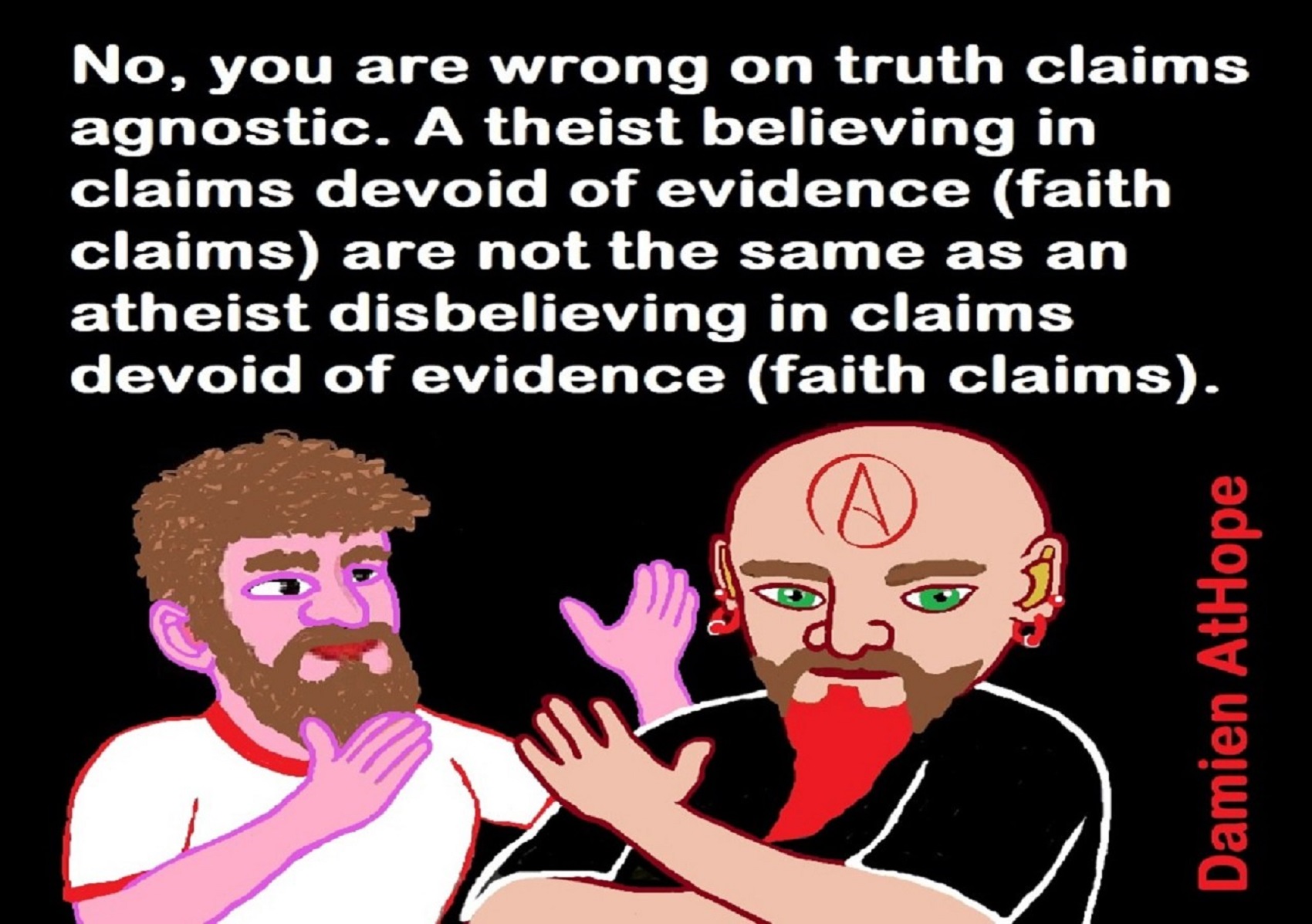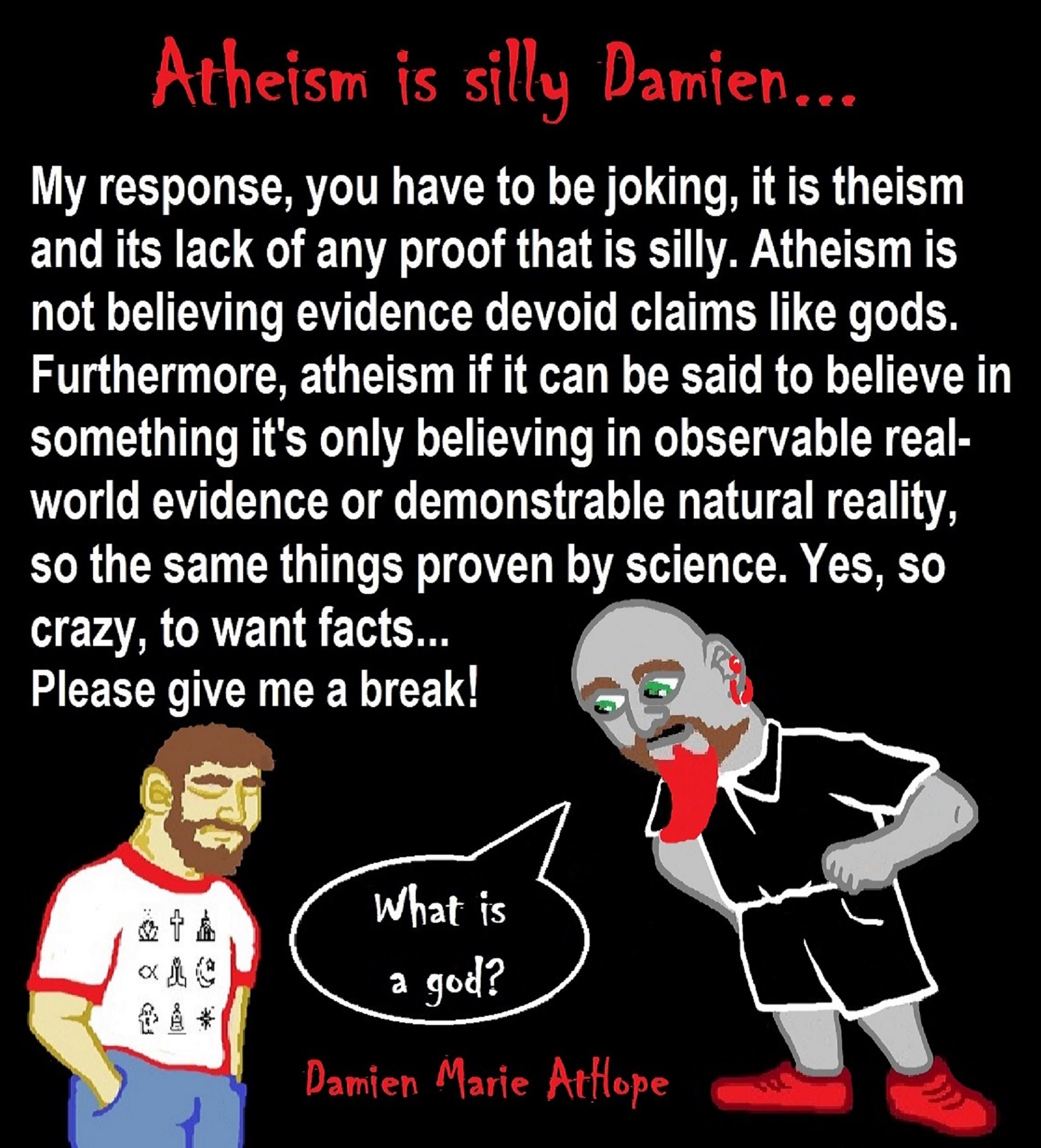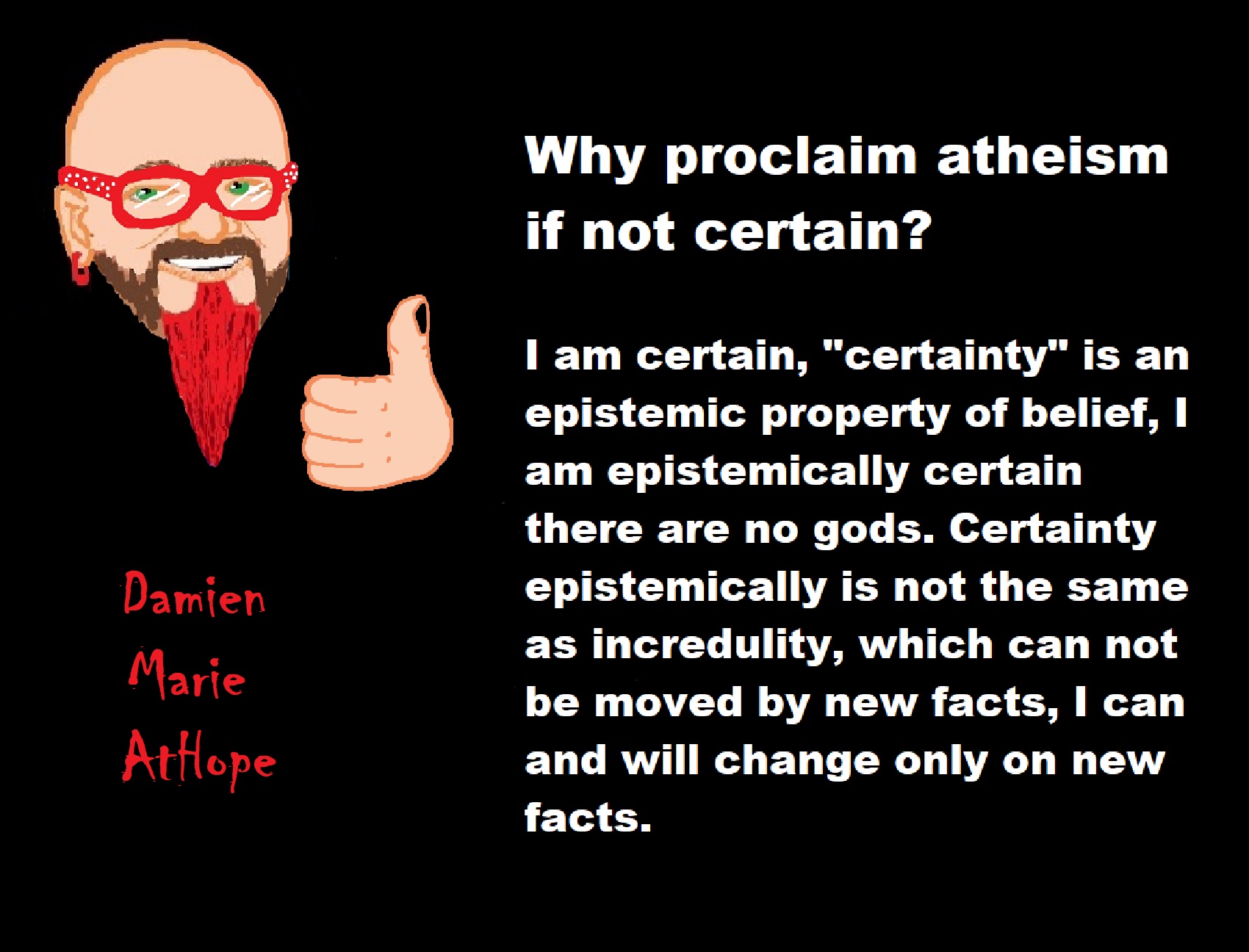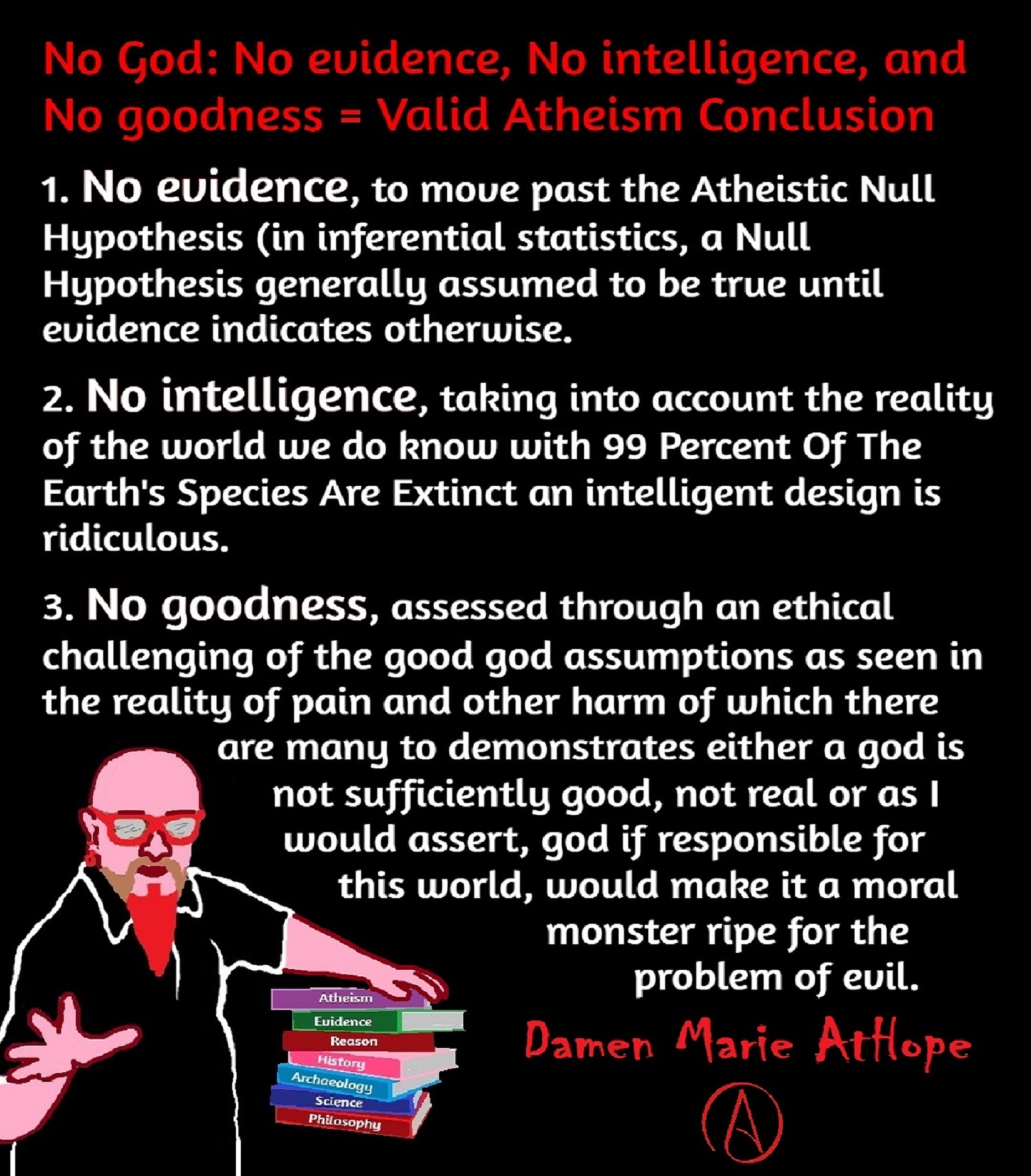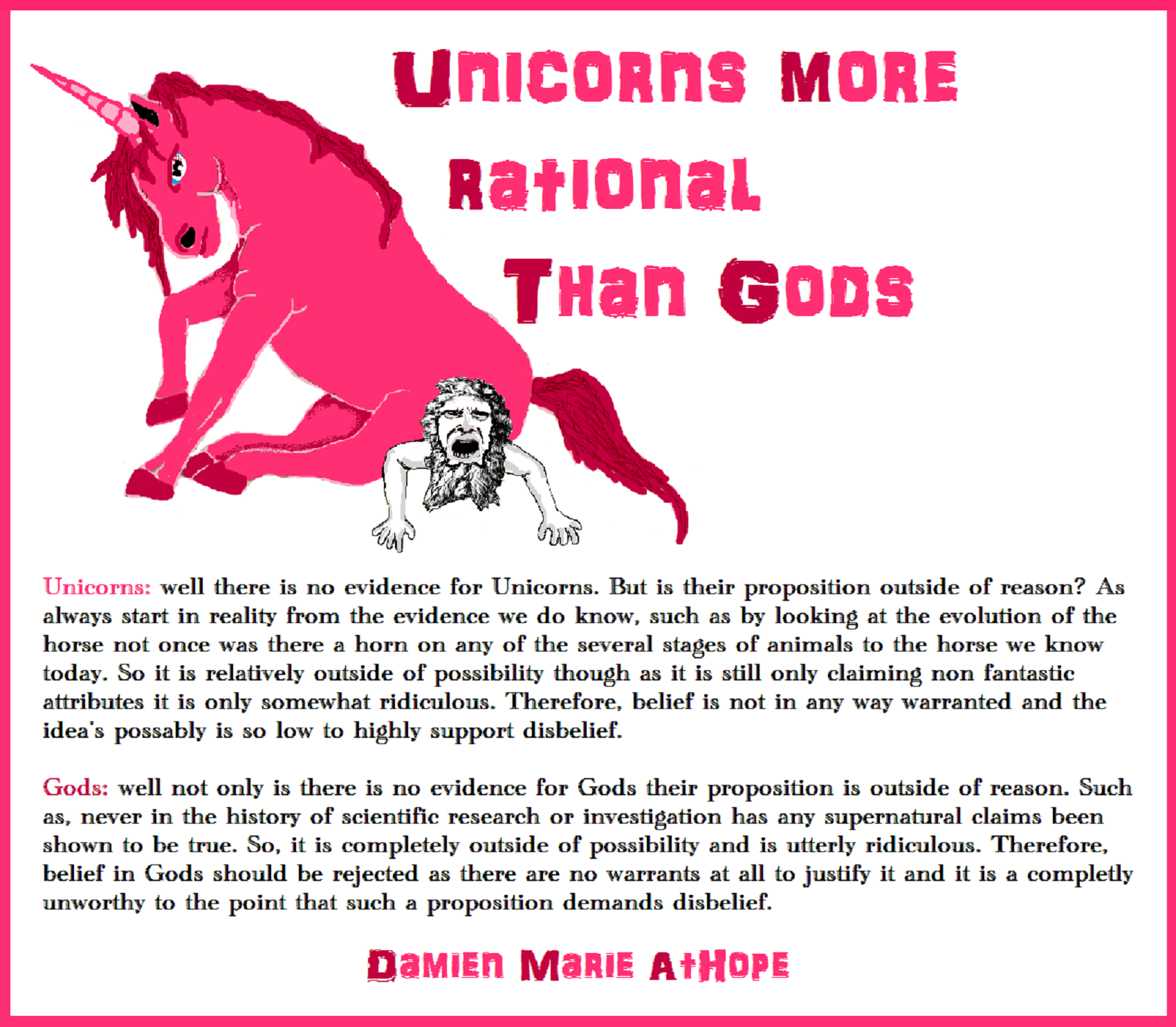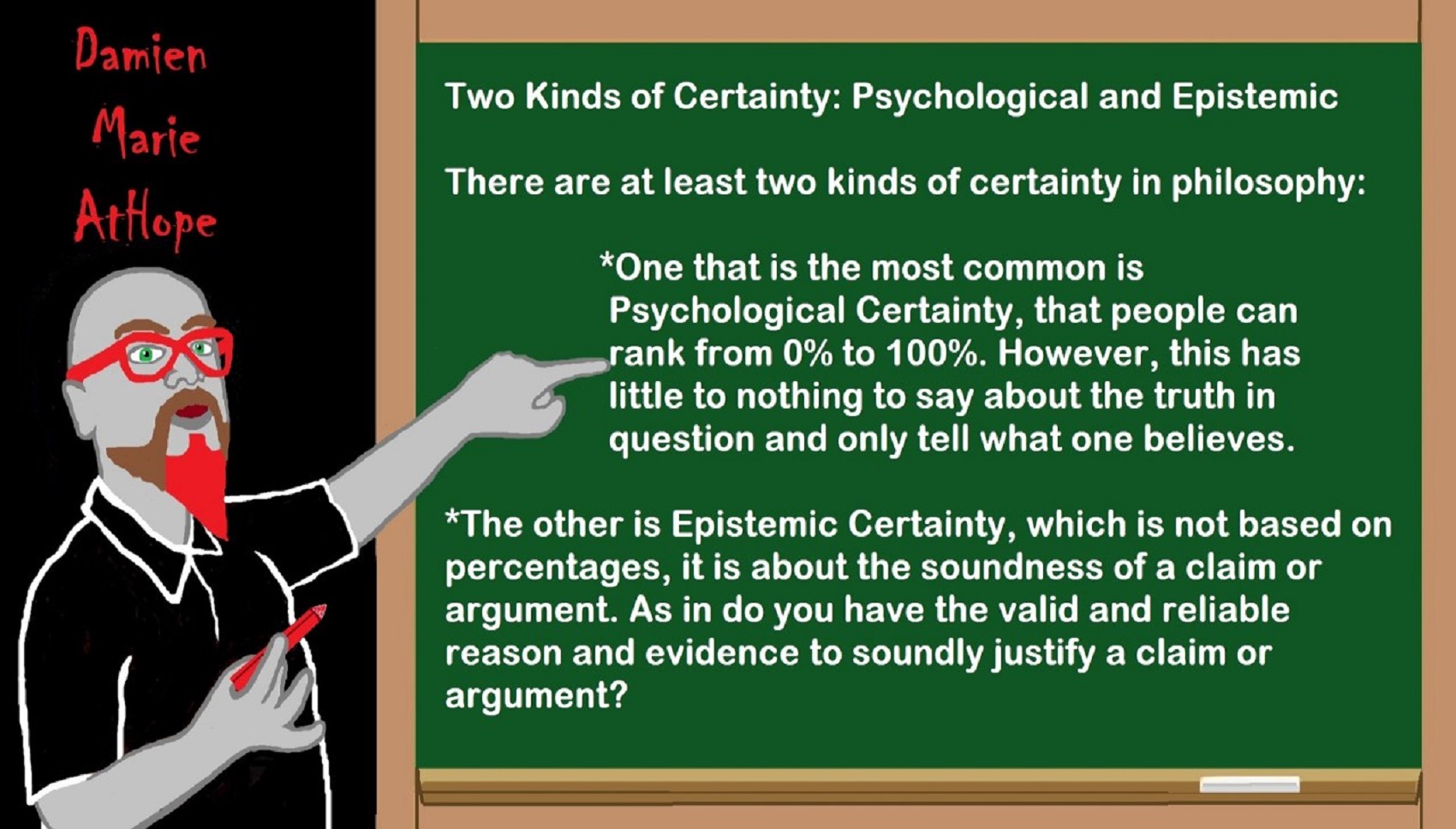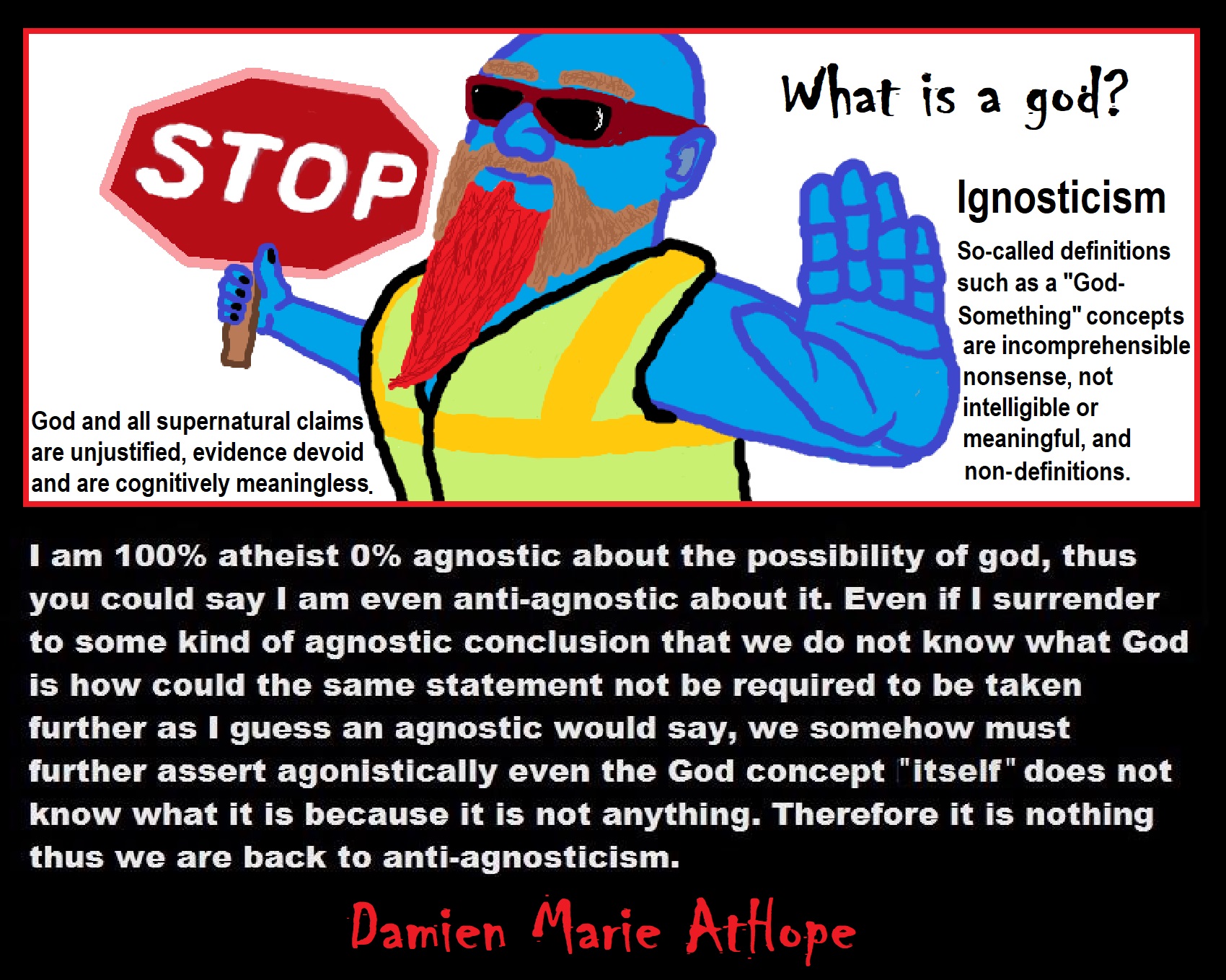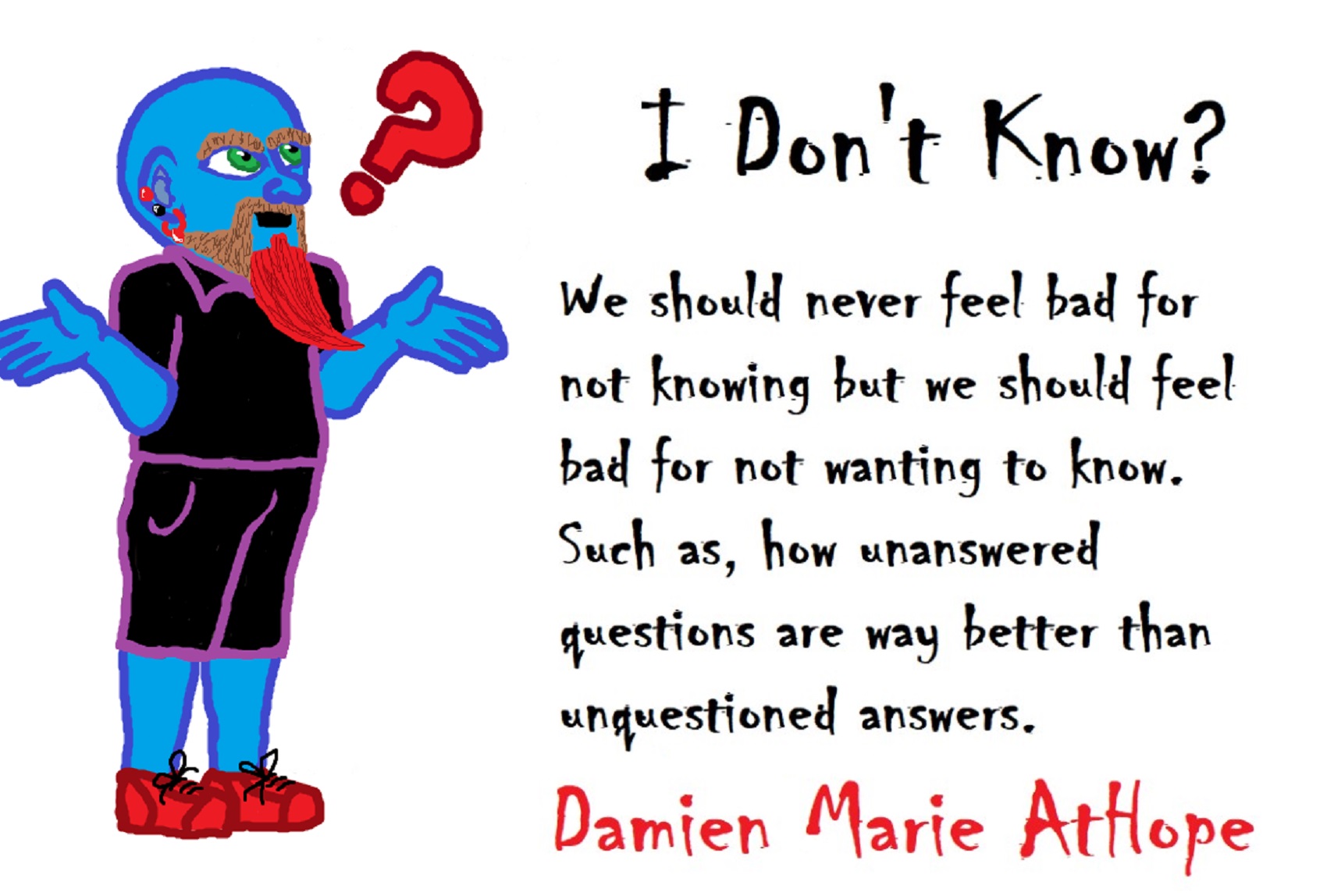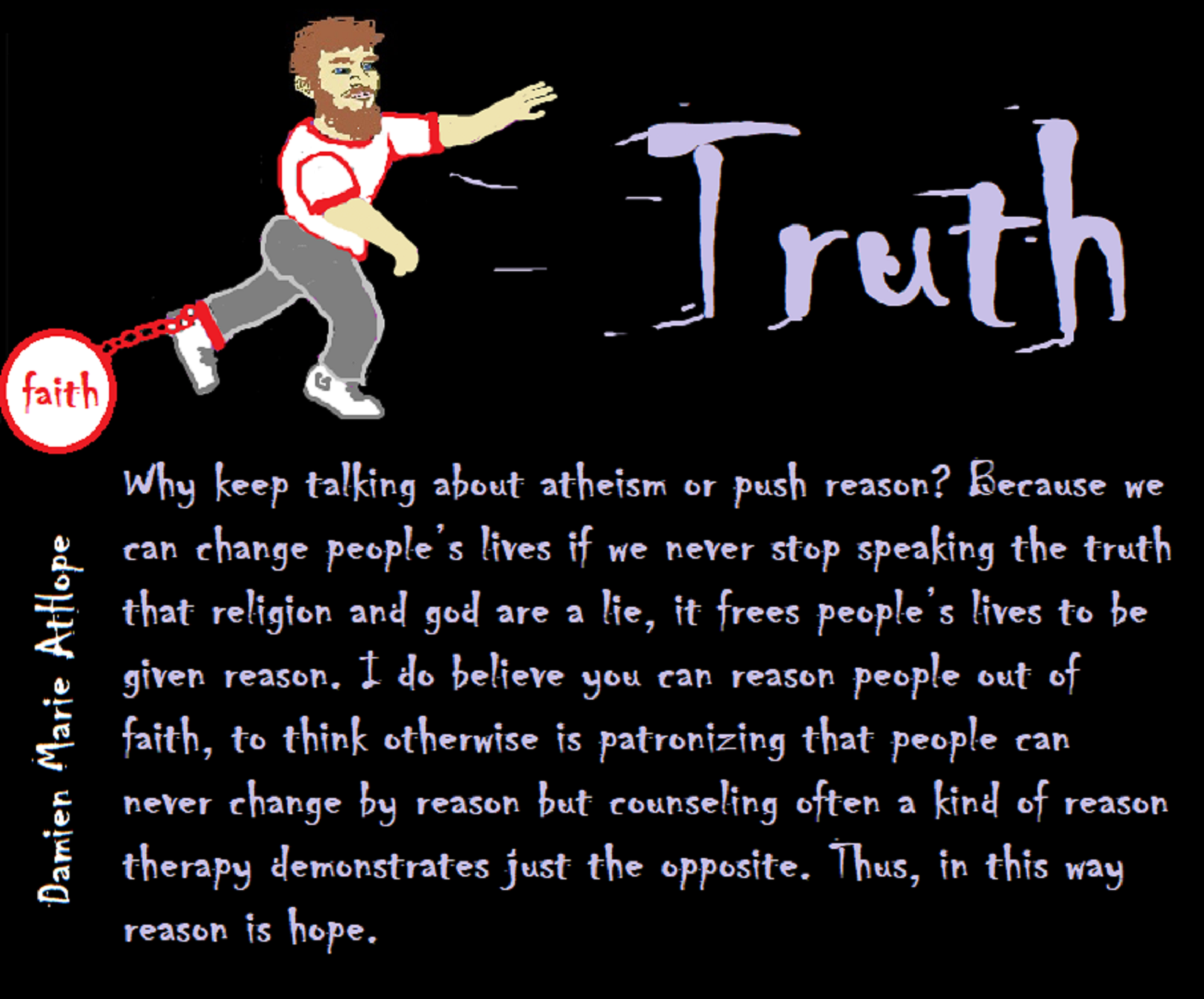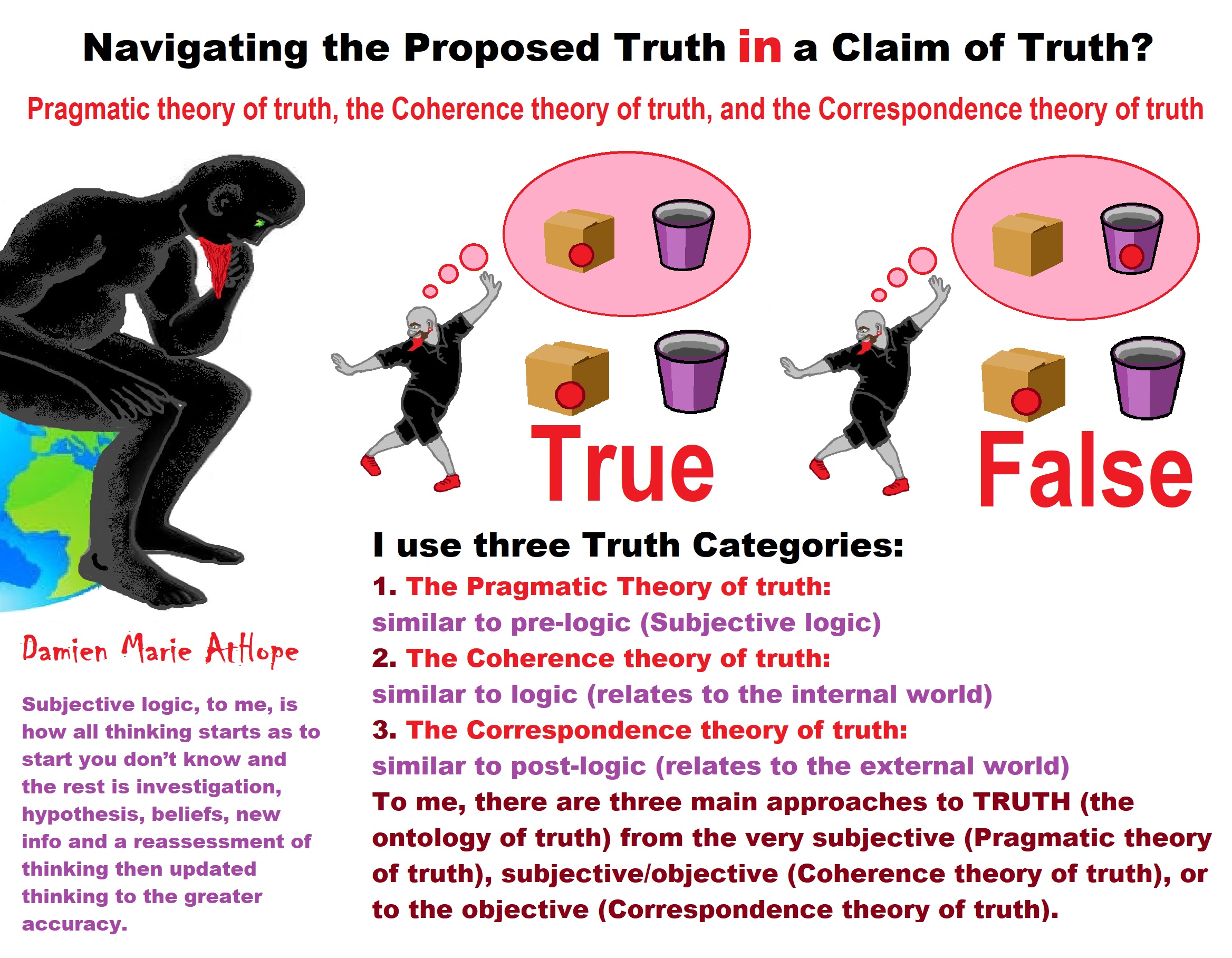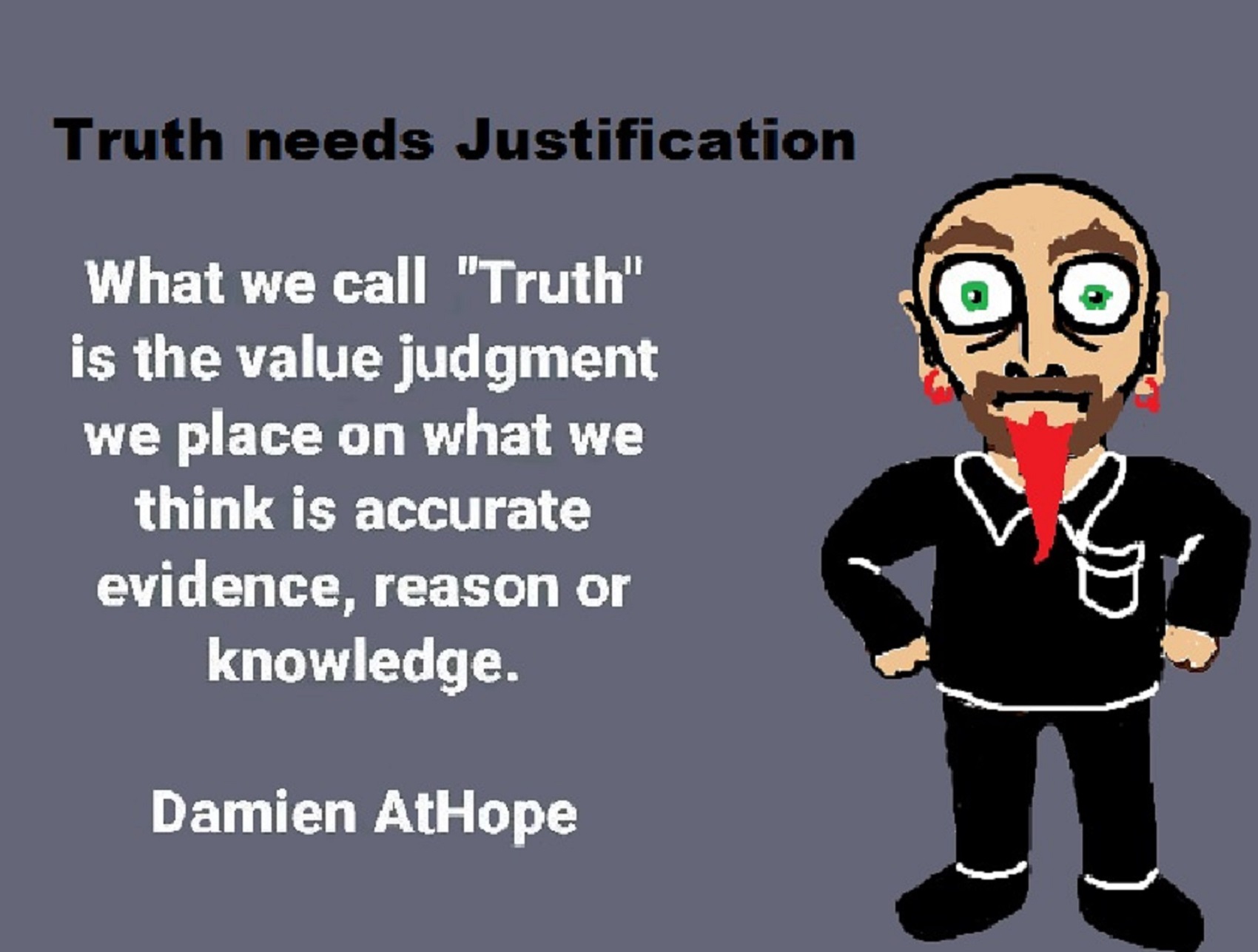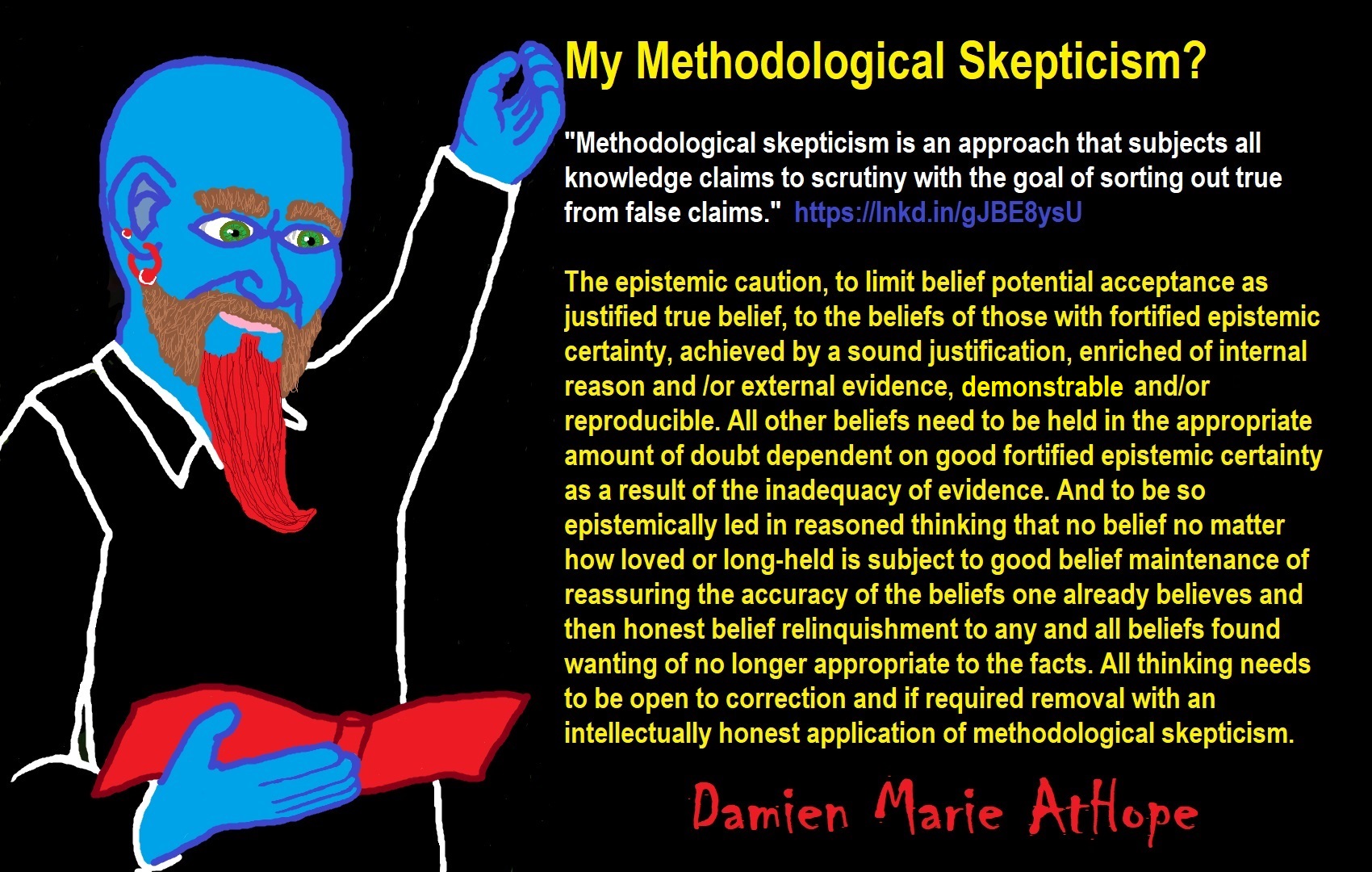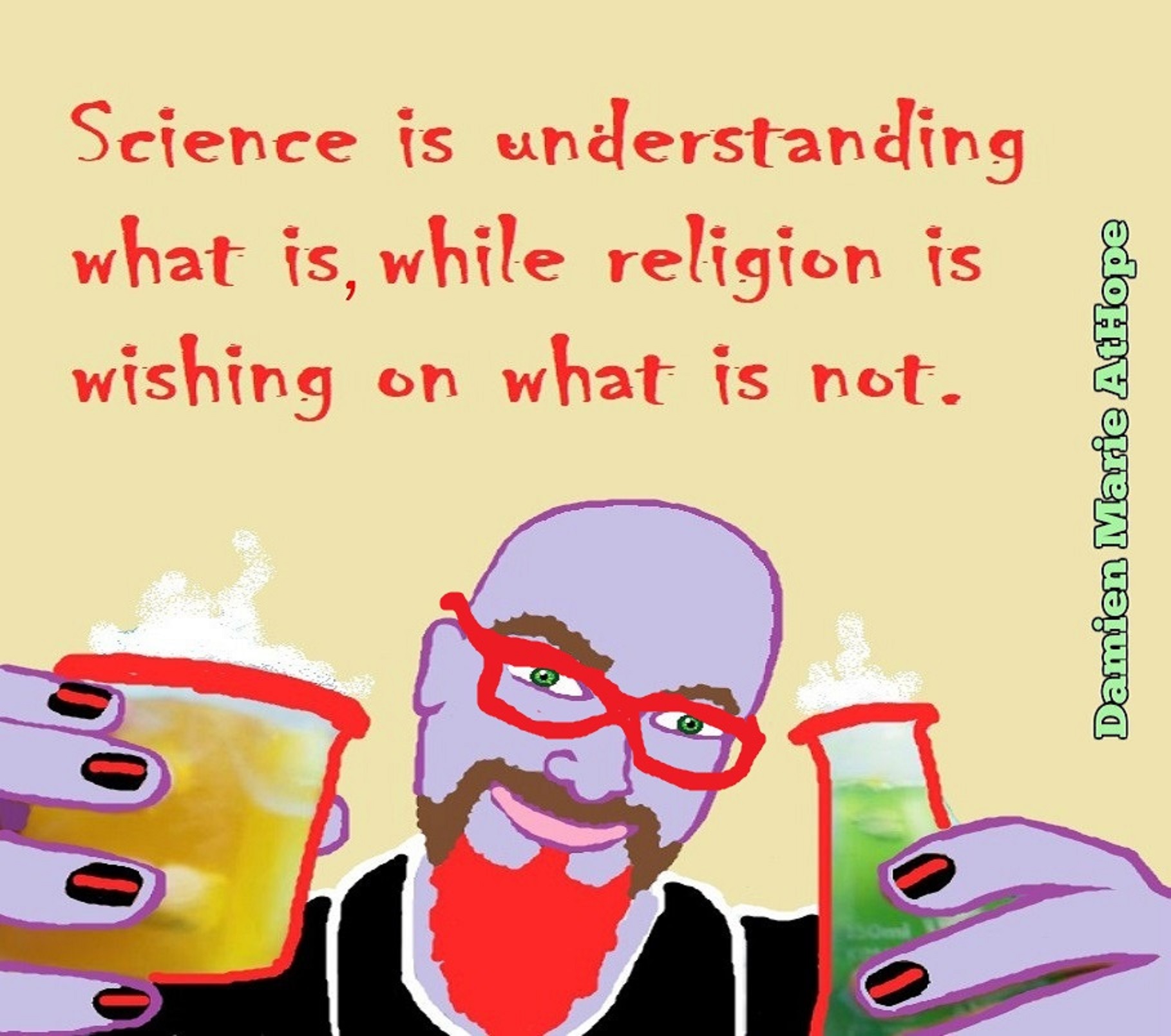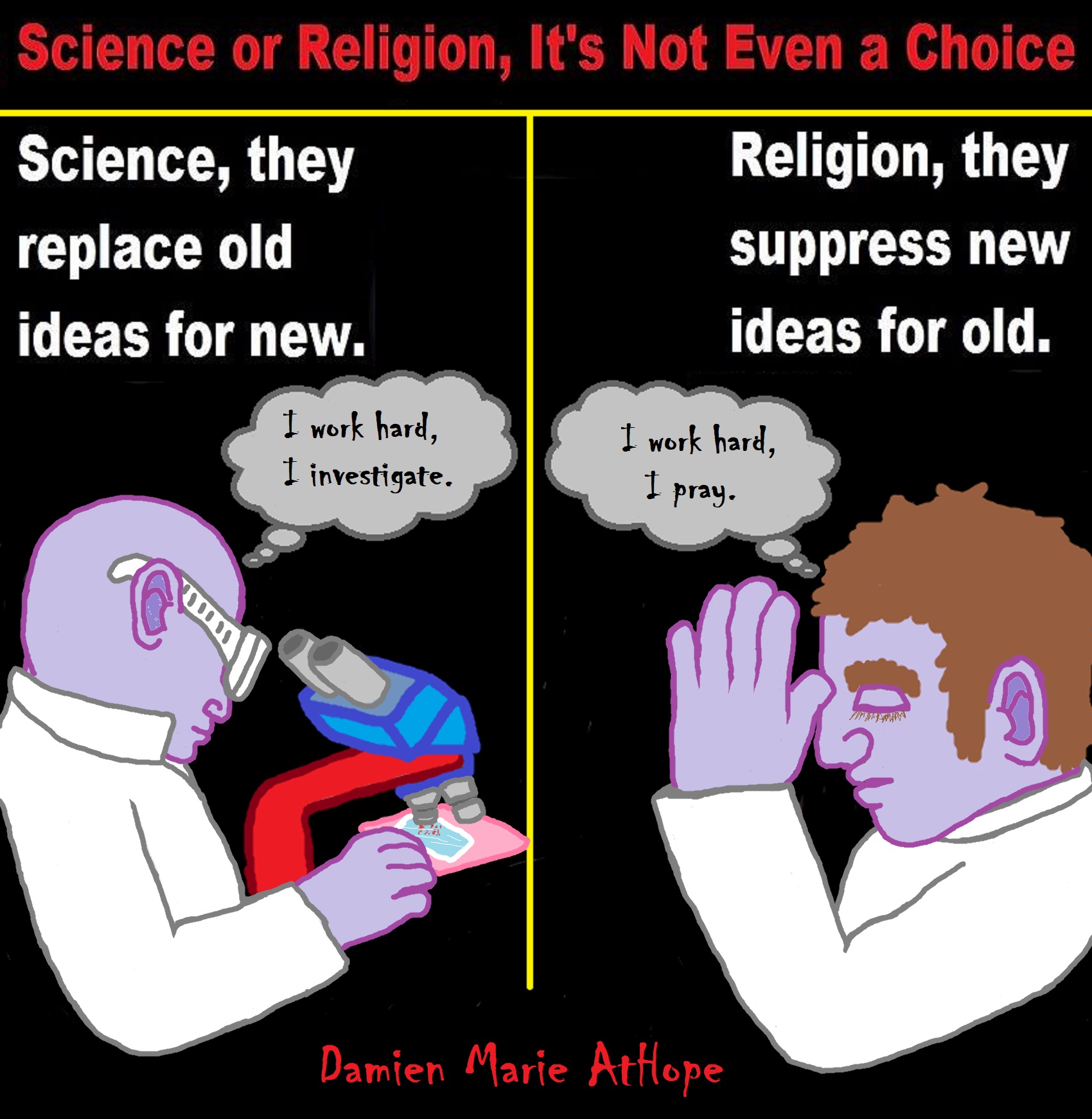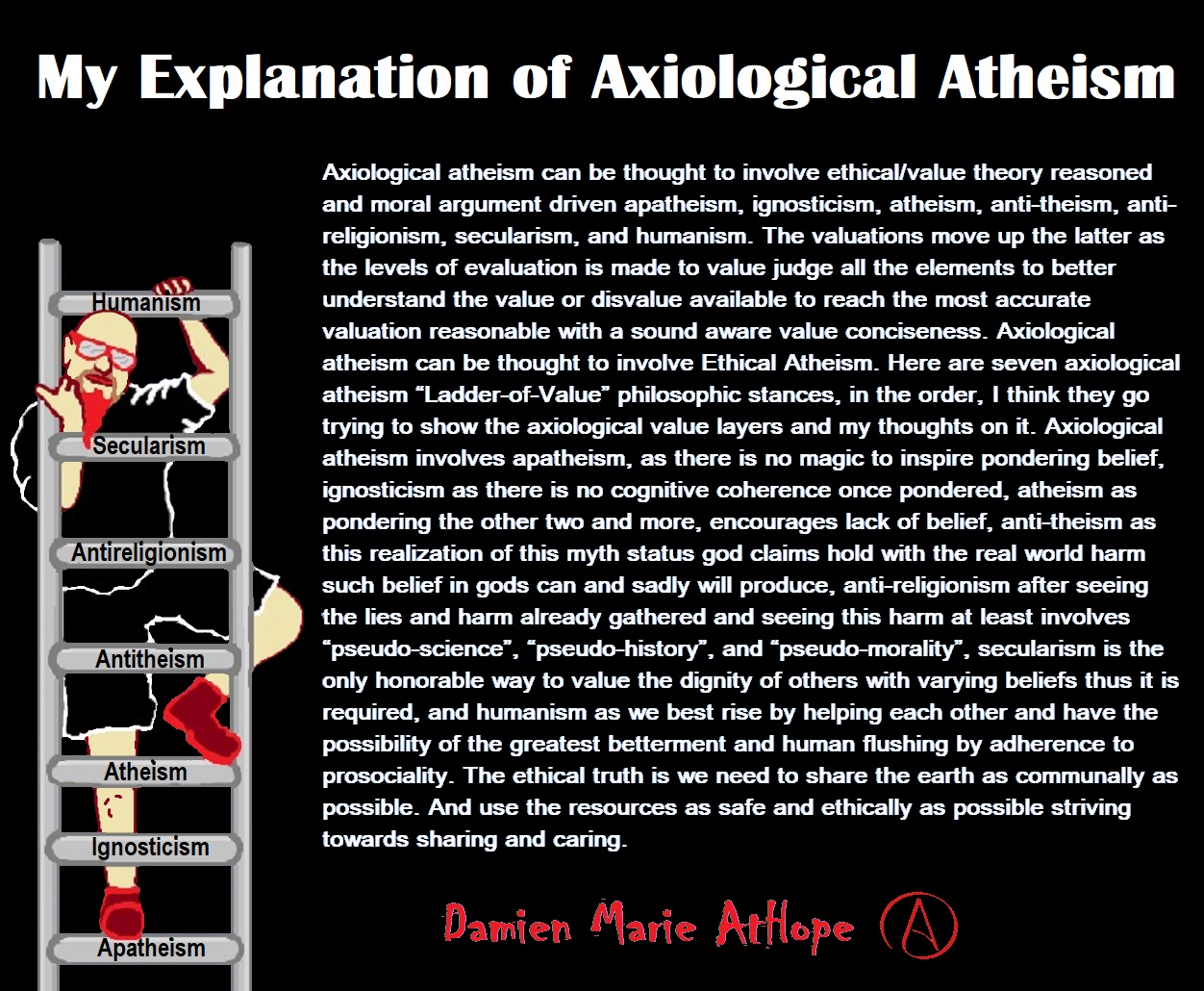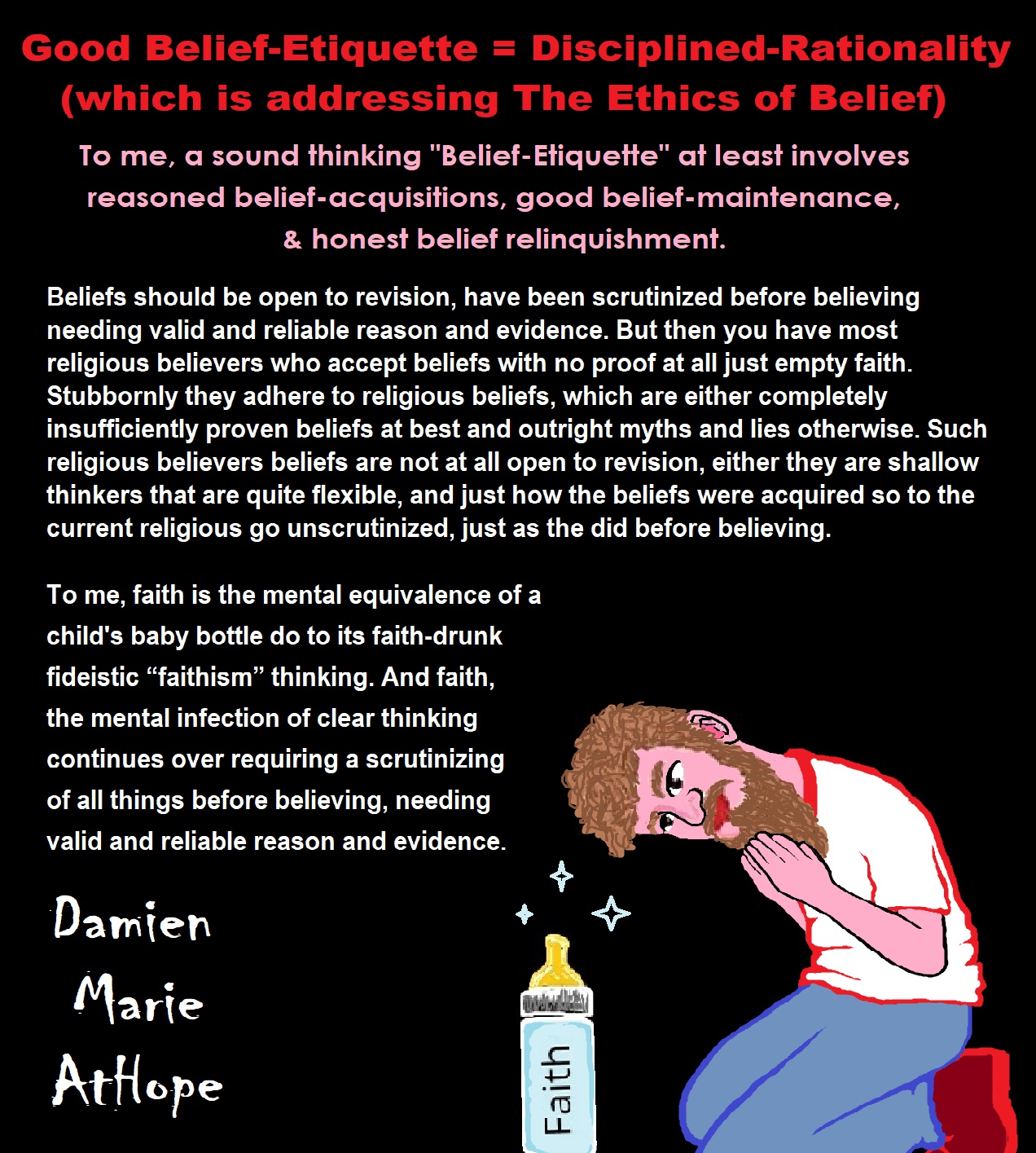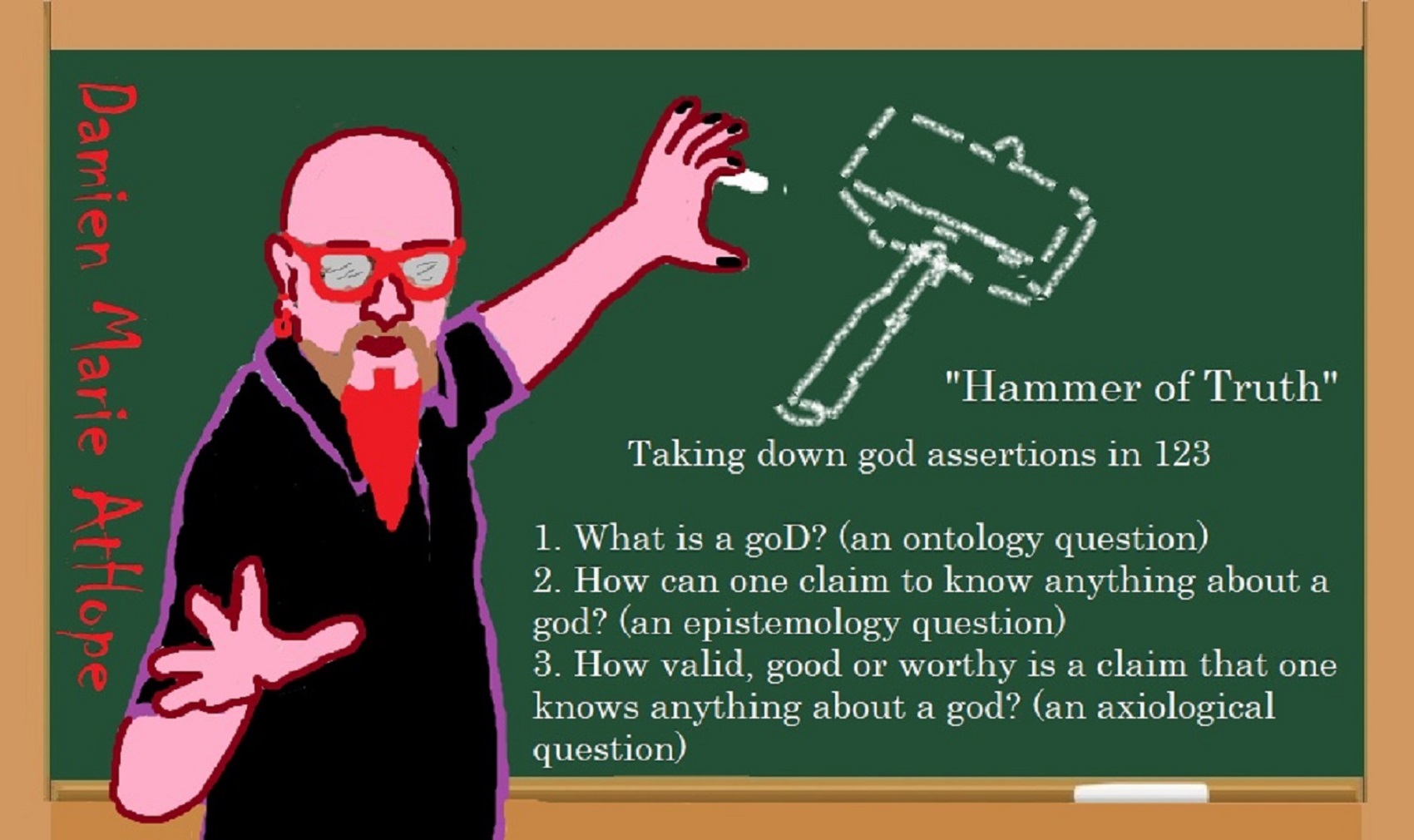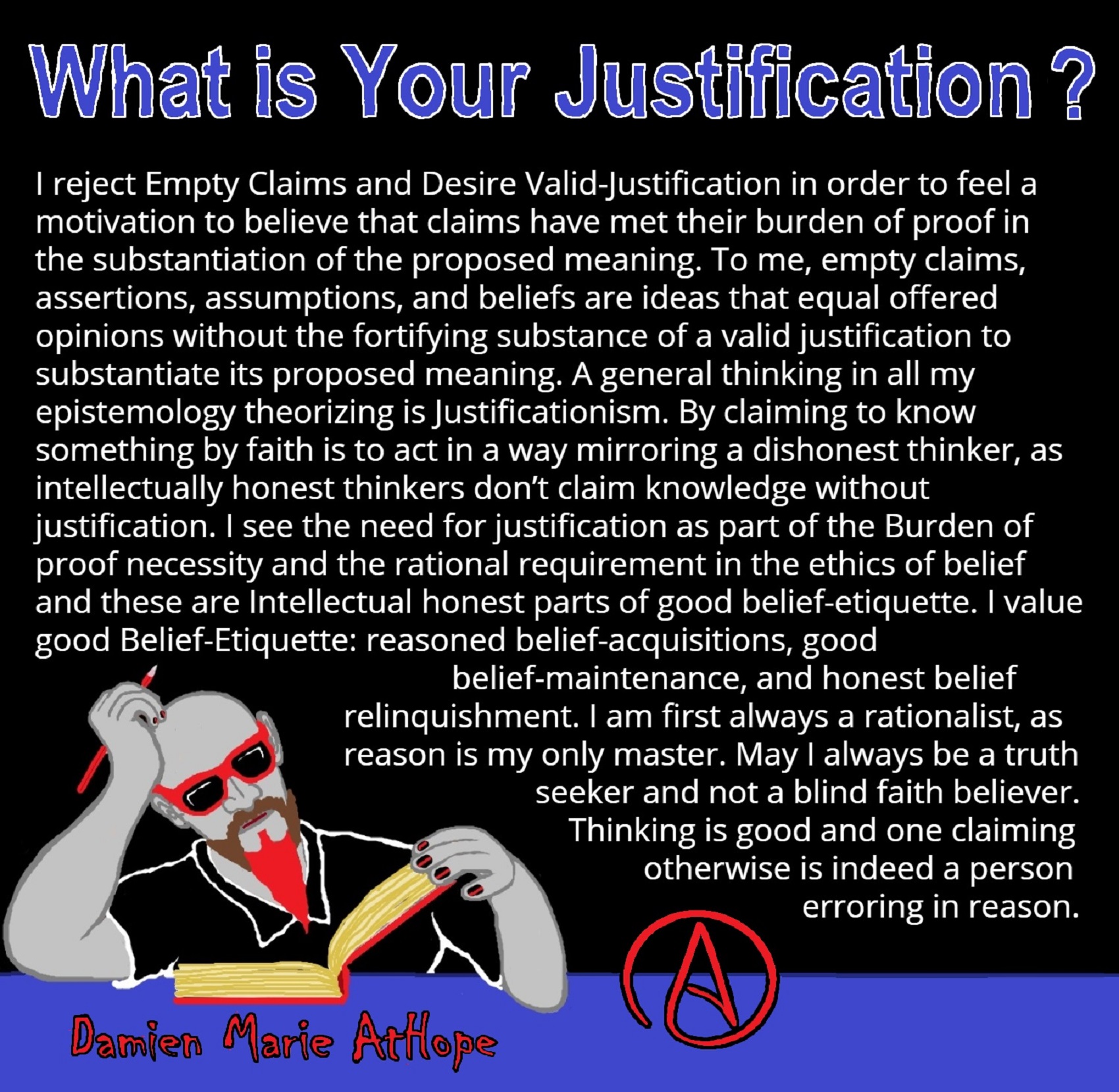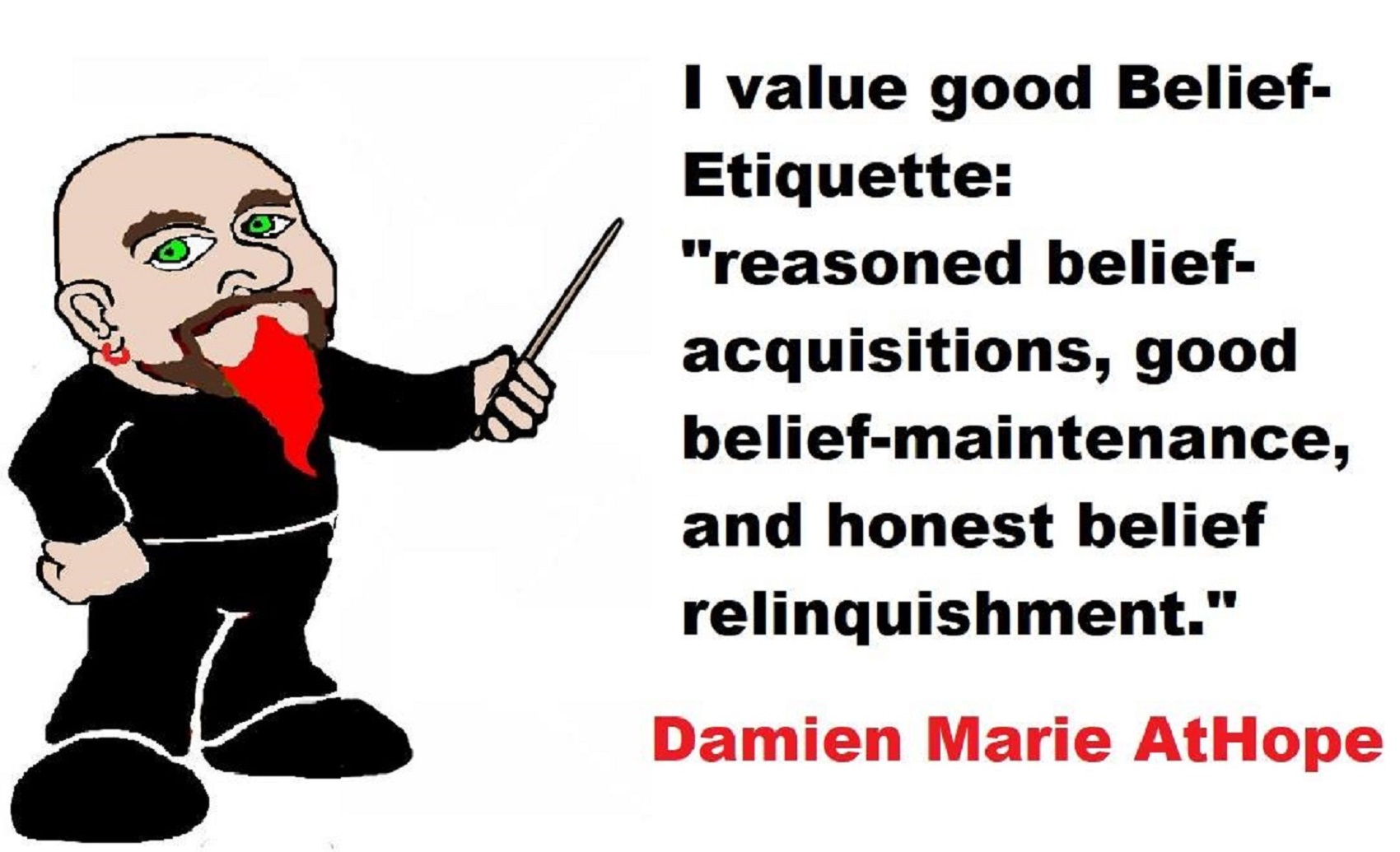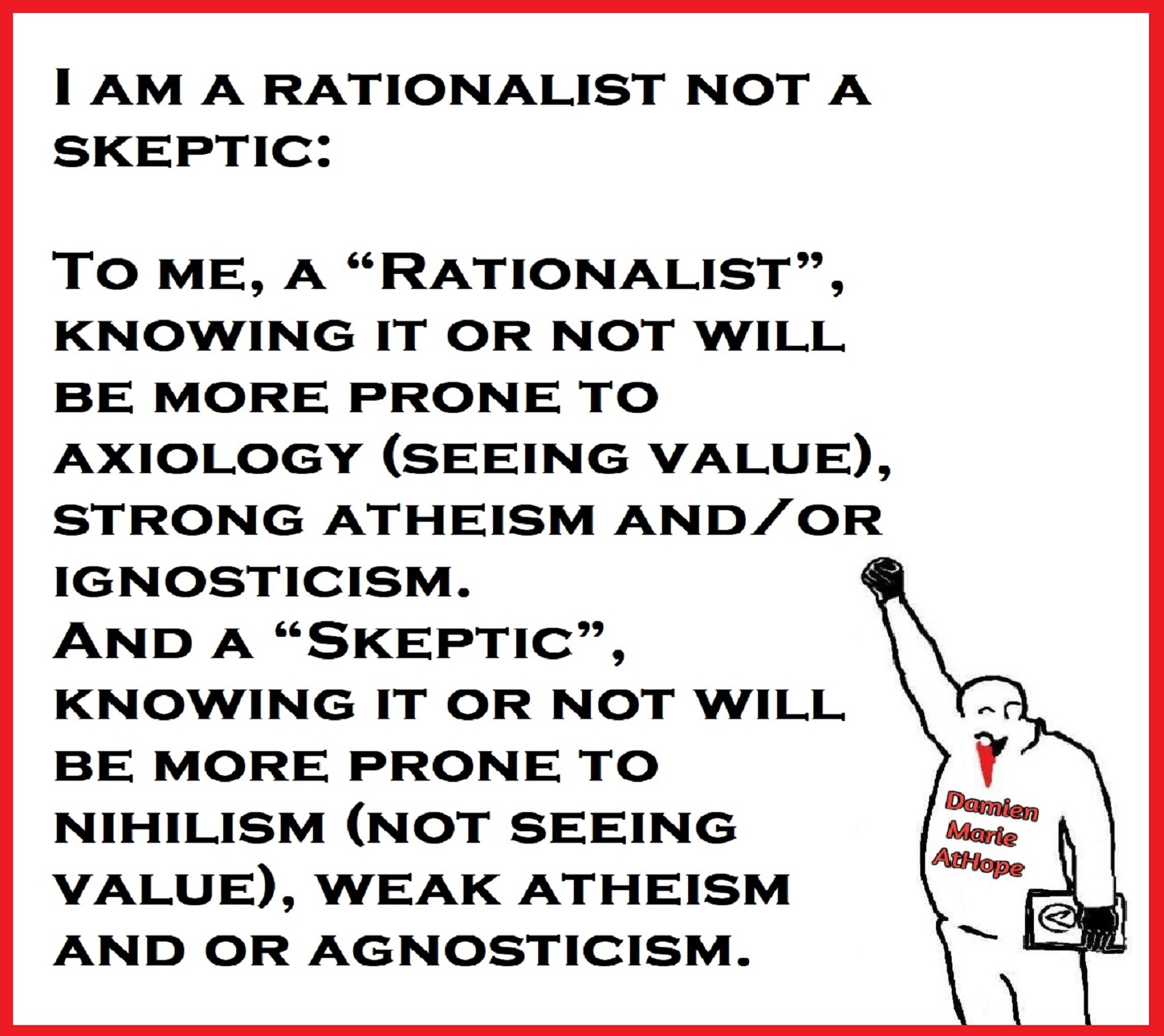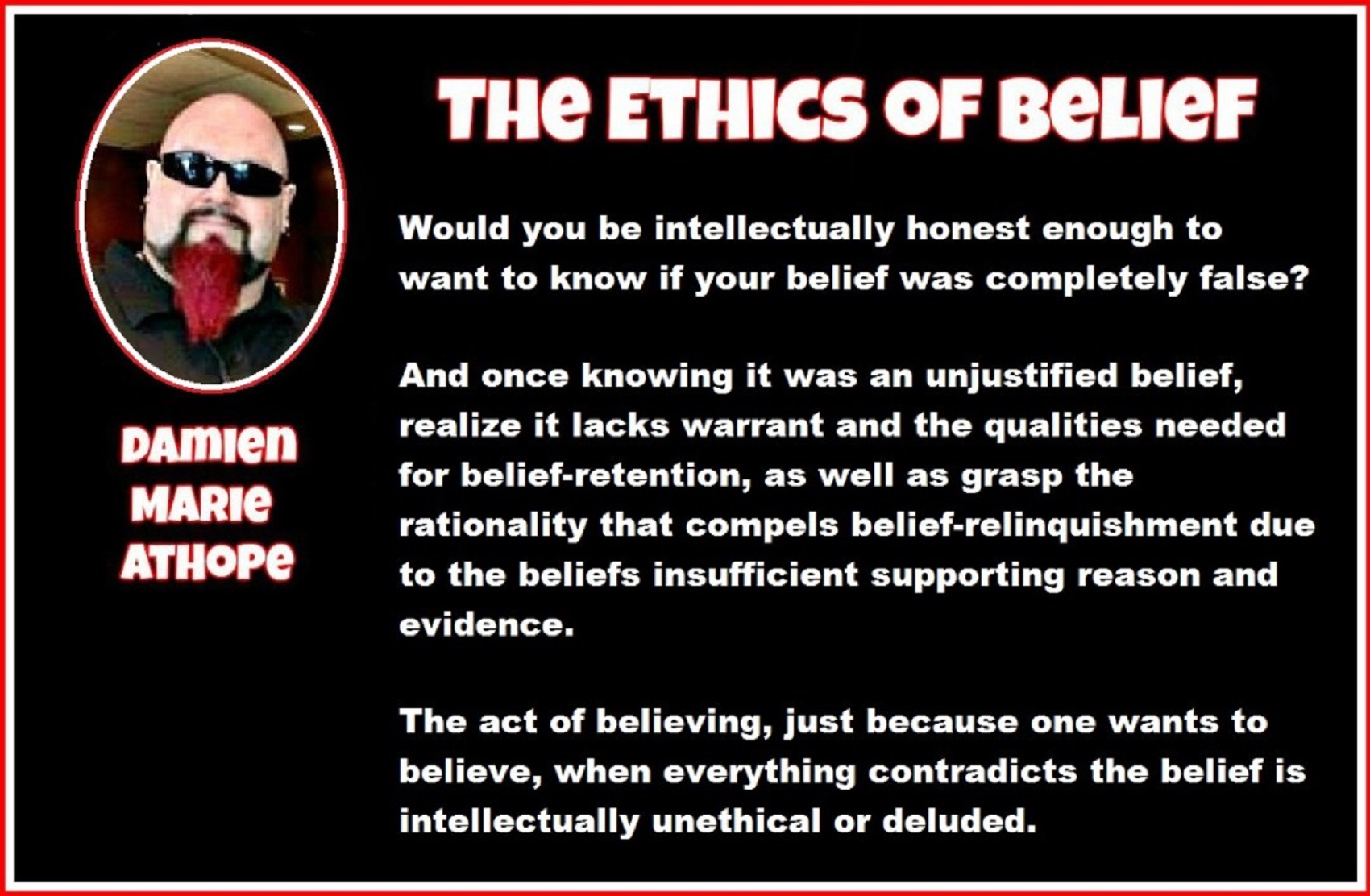“The word atheism comprises the word theism with the prefix ‘a’. So let’s break it down. Theism is the belief in a god or gods. The prefix ‘a’ means; ‘without’ or ‘lack of’. Therefore, atheism means ‘without a belief in a god or gods’ or the ‘lack of a belief in a god or gods’.” ref
Philosophy Definitions of “Agnosticism”
From: “The Stanford Encyclopedia of Philosophy“
By Paul Draper PhD, Philosophy // Faculty at the University of California, Irvine
First “Atheism” is typically defined in terms of “theism”. Theism, in turn, is best understood as a proposition—something that is either true or false. It is often defined as “the belief that God exists”, but here “belief” means “something believed”. It refers to the propositional content of belief, not to the attitude or psychological state of believing. This is why it makes sense to say that theism is true or false and to argue for or against theism. If, however, “atheism” is defined in terms of theism and theism is the proposition that God exists and not the psychological condition of believing that there is a God, then it follows that atheism is not the absence of the psychological condition of believing that God exists. Then the “a-” in “atheism” must be understood as negation instead of absence, as “not” instead of “without”.” ref
“In Grammar, negation, is the denial of the truth of a clause or sentence, typically involving the use of a negative word (e.g. not, no, never) or a word or affix with negative force (e.g. nothing, non-).” – Oxford Dictionaries.com
“In Logic, negation, is a proposition whose assertion specifically denies the truth of another proposition. ‘the negation of A is, briefly, ‘not A.” – Oxford Dictionaries.com
“While identifying atheism with the metaphysical claim that there is no God (or that there are no gods) is particularly useful for doing philosophy, it is important to recognize that the term “atheism” is polysemous—i.e., it has more than one related meaning—even within philosophy. There is more than one “correct” definition of “atheism”. Departing even more radically from the norm in philosophy, a few philosophers and quite a few non-philosophers claim that “atheism” shouldn’t be defined as a proposition at all, even if theism is a proposition. Instead, “atheism” should be defined as a psychological state: the state of not believing in the existence of God (or gods). Scholars can then use adjectives like “strong” and “weak” to develop a taxonomy that differentiates various specific atheisms. Also, in none of those senses is one required to be an atheist in order to be an antitheist, so antitheism is not a variety of atheism.” ref
“Moreover, the “a-” in “atheism” must be understood as negation instead of absence, as “not” instead of “without”. definition has the added virtue of making atheism a direct answer to one of the most important metaphysical questions in philosophy of religion, namely, “Is there a God?” There are only two possible direct answers to this question: “yes”, which is theism, and “no”, which is atheism. Answers like “I don’t know”, “no one knows”, “I don’t care”, “an affirmative answer has never been established”, or “the question is meaningless” are not direct answers to this question.” ref
“Atheism is commonly divided into two types: strong atheism and weak atheism. Although only two categories, this distinction manages to reflect the broad diversity which exists among atheists when it comes to their positions on the existence of gods.” – thoughtco.com
“Implicit atheism is simply the state of not believing in any gods.” – rationalwiki.org
“Weak atheism, also sometimes referred to as implicit atheism, is simply another name for the broadest and most general conception of atheism: the absence of belief in any gods. A weak atheist is someone who lacks theism and who does not happen to believe in the existence of any gods — no more, no less. This is also sometimes called agnostic atheism because most people who self-consciously lack belief in gods tend to do so for agnostic reasons.” – thoughtco.com
“Strong atheism, also sometimes referred to as explicit atheism, goes one step further and involves denying the existence of at least one god, usually multiple gods, and sometimes the possible existence of any gods at all. Strong atheism is sometimes called “gnostic atheism” because people who take this position often incorporate knowledge claims into it — that is to say, they claim to know in some fashion that certain gods or indeed all gods do not or cannot exist. Because knowledge claims are involved, strong atheism carries an initial burden of proof which does not exist for weak atheism. Any time a person asserts that some god or any gods do not or cannot exist, they obligate themselves to support their claims. This narrower conception of atheism is often thought by many (erroneously) to represent the entirety of atheism itself.” – thoughtco.com
Definitions of “Agnosticism” By Paul Draper
“The terms “agnostic” and “agnosticism” were famously coined in the late nineteenth century by the English biologist, T.H. Huxley. He said that he originally
invented the word “Agnostic” to denote people who, like [himself], confess themselves to be hopelessly ignorant concerning a variety of matters, about which metaphysicians and theologians, both orthodox and heterodox, dogmatise with the utmost confidence. (1884)” ref
“including of course the matter of God’s existence. He did not, however, define “agnosticism” simply as the state of being an agnostic. Instead, he often used that term to refer to a normative epistemological principle, something similar to (though weaker than) what we now call “evidentialism”. Roughly, Huxley’s principle says that it is wrong to say that one knows or believes that a proposition is true without logically satisfactory evidence (Huxley 1884 and 1889). But it was Huxley’s application of this principle to theistic and atheistic belief that ultimately had the greatest influence on the meaning of the term. He argued that, since neither of those beliefs is adequately supported by evidence, we ought to suspend judgment on the issue of whether or not there is a God.” ref
“Nowadays, the term “agnostic” is often used (when the issue is God’s existence) to refer to those who follow the recommendation expressed in the conclusion of Huxley’s argument: an agnostic is a person who has entertained the proposition that there is a God but believes neither that it is true nor that it is false. Not surprisingly, then, the term “agnosticism” is often defined, both in and outside of philosophy, not as a principle or any other sort of proposition but instead as the psychological state of being an agnostic. Call this the “psychological” sense of the term. It is certainly useful to have a term to refer to people who are neither theists nor atheists, but philosophers might wish that some other term besides “agnostic” (“theological skeptic”, perhaps?) were used.” ref
“The problem is that it is also very useful for philosophical purposes to have a name for the epistemological position that follows from the premise of Huxley’s argument, the position that neither theism nor atheism is known, or most ambitiously, that neither the belief that God exists nor the belief that God does not exist has positive epistemic status of any sort. Just as the metaphysical question of God’s existence is central to philosophy of religion, so too is the epistemological question of whether or not theism or atheism is known or has some other sort of positive epistemic status.” ref
“And given the etymology of “agnostic”, what better term could there be for a negative answer to that epistemological question than “agnosticism”? Further, as suggested earlier, it is, for very good reason, typical in philosophy to use the suffix “-ism” to refer to a proposition instead of to a state or condition, since only the former can sensibly be tested by argument.” ref
“If, however, “agnosticism” is defined as a proposition, then “agnostic” must be defined in terms of “agnosticism” instead of the other way around. Specifically, “agnostic” must be defined as a person who believes that the proposition “agnosticism” is true instead of “agnosticism” being defined as the state of being an agnostic. And if the proposition in question is that neither theism nor atheism is known to be true, then the term “agnostic” can no longer serve as a label for those who are neither theists nor atheists since one can consistently believe that atheism (or theism) is true while denying that atheism (or theism) is known to be true.” ref
“When used in this epistemological sense, the term “agnosticism” can very naturally be extended beyond the issue of what is or can be known to cover a large family of positions, depending on what sort of “positive epistemic status” is at issue. For example, it might be identified with any of the following positions: that neither theistic belief nor atheistic belief is justified, that neither theistic belief nor atheistic belief is rationally required, that neither belief is rationally permissible, that neither has warrant, that neither is reasonable, or that neither is probable.” ref
“Also, in order to avoid the vexed issue of the nature of knowledge, one can simply distinguish as distinct members of the “agnosticism family” each of the following claims about intellectually sophisticated people: (i) neither theism nor atheism is adequately supported by the internal states of such people, (ii) neither theistic belief nor atheistic belief coheres with the rest of their beliefs, (iii) neither theistic nor atheistic belief results from reliable belief-producing processes, (iv) neither theistic belief nor atheistic belief results from faculties aimed at truth that are functioning properly in an appropriate environment, and so on.” ref
“Notice too that, even if agnosticism were defined as the rather extreme position that neither theistic belief nor atheistic belief ever has positive epistemic status of any sort, it wouldn’t follow by definition that no agnostic is either a theist or an atheist. Some fideists, for example, believe that neither atheistic belief nor theistic belief is supported or sanctioned in any way at all by reason because reason leaves the matter of God’s existence completely unresolved. Yet they have faith that God exists and such faith (at least in some cases) involves belief. Thus, some fideists are extreme agnostics in the epistemological sense even though they are not agnostics in the psychological sense.” ref
“It is also worth mentioning that, even in Huxley’s time, some apophatic theists embraced the term “agnostic”, claiming that all good Christians worshipped an “unknown God”. More recently, some atheists proudly call themselves “agnostic atheists”, although with further reflection the symmetry between this position and fideism might give them pause. More likely, though, what is being claimed by these self-identified agnostic atheists is that, while their belief that God does not exist has positive epistemic status of some sort (minimally, it is not irrational), it does not have the sort of positive epistemic status that can turn true belief into knowledge.” ref
“No doubt both senses of “agnosticism”, the psychological and the epistemological, will continue to be used both inside and outside of philosophy. Hopefully, context will help to disambiguate. In the remainder of this entry, however, the term “agnosticism” will be used in its epistemological sense. This makes a huge difference to the issue of justification. Consider, for example, this passage written by the agnostic, Anthony Kenny (1983: 84–85):
I do not myself know of any argument for the existence of God which I find convincing; in all of them I think I can find flaws. Equally, I do not know of any argument against the existence of God which is totally convincing; in the arguments I know against the existence of God I can equally find flaws. So that my own position on the existence of God is agnostic.” ref
“It is one thing to ask whether Kenny’s inability to find arguments that convince him of God’s existence or non-existence justifies him personally in suspending judgment about the existence of God. It is quite another to ask whether this inability (or anything else) would justify his believing that no one (or at least no one who is sufficiently intelligent and well-informed) has a justified belief about God’s existence.” ref
“If agnosticism (in one sense of the word) is the position that neither theism nor atheism is known, then it might be useful to use the term “gnosticism” to refer to the contradictory of that position, that is, to the position that either theism or atheism is known. That view would, of course, come in two flavors: theistic gnosticism—the view that theism is known (and hence atheism is not)—and atheistic gnosticism—the view that atheism is known (and hence theism is not).” ref
An Argument against Agnosticism By Paul Draper
“The topic in Le Poidevin’s argument for the truth of a modest form of agnosticism for the falsity of a more ambitious form of agnosticism will be examined. Because the sort of agnosticism addressed in this section is more ambitious than the sort defended by Le Poidevin, it is conceivable that both arguments succeed in establishing their conclusions.” ref
“In Le Poidevin’s argument, the term “agnosticism” refers to the position that neither versatile theism nor global atheism is known to be true. In this section, “agnosticism” refers to the position that neither the belief that omni-theism is true nor the belief that it is false is rationally permissible. This form of agnosticism is more ambitious because knowledge is stronger (in the logical sense) than rational permissibility: it can be rationally permissible to believe propositions that are not known to be true, but a proposition cannot be known to be true by someone who is not rationally permitted to believe it. Thus, an appropriate name for this form of agnosticism is “strong agnosticism.” ref
“Another difference concerns the object of the two forms of agnosticism. The agnosticism in Le Poidevin’s argument concerned versatile theism versus global atheism. In this section, the target is omni-theism versus the local atheistic position that omni-theism is false. The previous section focused on two arguments for the conclusion that this form of local atheism is very probably true. In this section, the question is whether or not that conclusion, if established, could ground a successful argument against strong agnosticism.” ref
“Such an argument can be formulated as follows:
(1)Atheism (understood here as the denial of omni-theism) is very probably true.
(2)If atheism is very probably true, then atheistic belief is rationally permissible.” ref
“It follows from (1) and (2) that
- (3)Atheistic belief is rationally permissible.
- (4)If strong agnosticism (about omni-theism) is true (that is, if withholding judgment about the truth or falsity of omni-theism is rationally required), then atheistic belief is not rationally permissible.
It follows from (3) and (4) that
- (5)Strong agnosticism (about omni-theism) is false.” ref
:’Premise (1) was defended in link, premise (4) is true by the definition of “strong agnosticism”, and steps (3) and (5) follow from earlier steps by modus ponens and modus tollens, respectively. This leaves premise (2), the premise that, if atheism is very probably true, then atheistic belief is rationally permissible.” ref
“One might attempt to defend this premise by claiming that the probabilities in premise (2) are rational credences and hence the truth of the so-called Lockean thesis (Foley 1992) justifies (2):
It is rational for a person S to believe a proposition P if and only if it is rational for S’s credence in P to be sufficiently high to make S’s attitude towards P one of belief.” ref
“The Lockean thesis, however, is itself in need of justification. Fortunately, though, nothing so strong as the Lockean thesis is needed to defend premise (2). For one thing, all the defender of (2) needs is an “if”, not an “if and only if”. Also, the defender of (2) need not equate, as the Lockean thesis does, the attitude of belief with having a high credence. Thus, all that is required is the following more modest thesis (call it “T”):
- (T)If it is rationally permissible for S’s credence in a proposition P to be (very) high, then it is rationally permissible for S to believe P.” ref
“Even this more modest thesis, however, is controversial, because adopting it commits one to the position that rational (i.e., rationally permissible) belief is not closed under conjunction. In other words, it commits one to the position that it is possible for each of a number of beliefs to be rational even though the additional belief that those beliefs are all true is not rational.” ref
“To see why this is so, imagine that a million lottery tickets have been sold. Each player purchased only a single ticket, and exactly one of the players is certain to win. Now imagine further that an informed observer has a distinct belief about each of the million individual players that that particular player will lose. According to thesis T, each of those million beliefs is rational. For example, if Sue is one of the players, then according to T the observer’s belief that Sue will lose is rational because it is rational for the observer to have a (very) high credence in the proposition that Sue will lose.” ref
“Since, however, it is certain that someone will win, it is also rational for the observer to believe that some player will win. It is not rational, however, to have contradictory beliefs, so it is not rational for the observer to believe that no player will win. This implies, however, that rational belief is not closed under conjunction, for the proposition that no player will win just is the conjunction of all of the propositions that say of some individual player that they will lose.” ref
“Defenders of premise (2) will claim, very plausibly, that the implication of T that rational belief is not closed under conjunction is completely innocuous. Isn’t it obvious, for example, that it would not be rational for a fallible human being to believe that all of their many beliefs are true, even if each of those beliefs were rational? Others (e.g., Oppy 1994: 151), however, regard the conclusion that rational belief is not closed under conjunction as unacceptable and will for that reason reject premise (2). So even if it can be shown that omni-theism is very probably false, it still won’t be obvious to everyone that it is rationally permissible to be a local atheist about omni-theism and thus it still won’t be obvious to everyone that strong agnosticism about omni-theism is false.” ref
An Argument for Global Atheism? By Paul Draper
“Almost all well-known arguments for atheism are arguments for a particular version of local atheism. One possible exception to this rule is an argument recently made popular by some New Atheists, although it was not invented by them. Gary Gutting (2013) calls this argument the “no arguments argument” for atheism:
- (1)The absence of good reasons to believe that God exists is itself a good reason to believe that God does not exist.
- (2)There is no good reason to believe that God exists.
It follows from (1) and (2) that
- (3)There is good reason to believe that God does not exist.” ref
“Notice the obvious relevance of this argument to agnosticism. According to one prominent member of the agnosticism family, we have no good reason to believe that God exists and no good reason to believe that God does not exist. Clearly, if the first premise of this argument is true, then this version of agnosticism must be false.” ref
“Can the no arguments argument be construed as an argument for global atheism? One might object that it is not, strictly speaking, an argument for any sort of atheism since its conclusion is not that atheism is true but instead that there is good reason to believe that atheism is true. But that is just a quibble. Ultimately, whether this argument can be used to defend global atheism depends on how its first premise is defended.” ref
‘The usual way of defending it is to derive it from some general principle according to which lacking grounds for claims of a certain sort is good reason to reject those claims. The restriction of this principle to claims “of a certain sort” is crucial, since the principle that the absence of grounds for a claim is in all cases a good reason to believe that the claim is false is rather obviously false. One might, for example, lack grounds for believing that the next time one flips a coin it will come up heads, but that is not a good reason to believe that it won’t come up heads.” ref
“A more promising approach restricts the principle to existence claims, thereby turning it into a version of Ockham’s razor. According to this version of the principle, the absence of grounds supporting a positive existential statement (like “God exists”—however “God” is understood) is a good reason to believe that the statement is false (McLaughlin 1984). One objection to this principle is that not every sort of thing is such that, if it existed, then we would likely have good reason to believe that it exists. Consider, for example, intelligent life in distant galaxies (cf. Morris 1985).” ref
“Perhaps, however, an even more narrowly restricted principle would do the trick: whenever the assumption that a positive existential claim is true would lead one to expect to have grounds for its truth, the absence of such grounds is a good reason to believe that the claim is false. It might then be argued that (i) a God would be likely to provide us with convincing evidence of Her existence and so (ii) the absence of such evidence is a good reason to believe that God does not exist. This transforms the no arguments argument into an argument from divine hiddenness. It also transforms it into at best an argument for local atheism, since even if the God of, say, classical theism would not hide, not all legitimate God-concepts are such that a being instantiating that concept would be likely to provide us with convincing evidence of its existence.” ref
Two Arguments for Local Atheism By Paul Draper
1. How to Argue for Local Atheism
“The sort of God in whose non-existence philosophers seem most interested is the eternal, non-physical, omnipotent, omniscient, and omnibenevolent (i.e., morally perfect) creator-God worshipped by many theologically orthodox Muslims, Jews, and Christians. Let’s call the proposition that a God of this sort exists “omni-theism”. One interesting question, then, is how best to argue for atheism understood locally as the proposition that omni-theism is false.” ref
“It is often claimed that a good argument for atheism is impossible because, while it is at least possible to prove that something of a certain sort exists, it is impossible to prove that nothing of that sort exists. One reason to reject this claim is that the descriptions of some kinds of objects are self-contradictory. For example, we can prove that no circular square exists because such an object would have to be both circular and non-circular, which is impossible. Thus, one way to argue for the nonexistence of the God of omni-theism (or “omni-God” for short) is to argue that such a God is an impossible object like a circular square.” ref
‘”Many attempts have been made to construct such arguments. For example, it has been claimed that an omnibenevolent being would be impeccable and so incapable of wrongdoing, while an omnipotent being would be quite capable of doing things that would be wrong to do. There are, however, sophisticated and plausible replies to arguments like these. More importantly, even if such an argument succeeded, omni-theists could plausibly claim that, by “omnipotent”, they mean, not maximally powerful, but optimally powerful, where the optimal degree of power may not be maximal if maximal power rules out possessing the optimal degree of some other perfection like moral goodness.” ref
“Similar problems face attempts to show that omni-theism must be false because it is incompatible with certain known facts about the world. Such arguments typically depend on detailed and contested interpretations of divine attributes like omnibenevolence. A very different approach is based on the idea that disproof need not be demonstrative. The goal of this approach is to show that the existence of an omni-God is so improbable that confident belief in the non-existence of such a God is justified. Two such arguments are discussed in detail below: the “low priors argument” and the “decisive evidence argument”. Each of these arguments employs the same specific strategy, which is to argue that some alternative hypothesis to omni-theism is many times more probable than omni-theism.” ref
“This doesn’t imply that the alternative hypothesis is probably true, but it does imply that omni-theism is very probably false. In the case of the second argument, the alternative hypothesis (aesthetic deism) is arguably a form of theism, and even in the case of the first argument it is arguable that the alternative hypothesis (source physicalism) is compatible with some forms of theism (in particular ones in which God is an emergent entity). This is not a problem for either argument, however, precisely because both are arguments for local atheism instead of global atheism.” ref
2. The Low Priors Argument
“The basic idea behind the low priors argument is that, even if the agnostic is right that, when it comes to God’s existence, the evidence is ambiguous or absent altogether, what follows is not that theism has a middling probability all things considered, but instead that theism is very probably false. This is said to follow because theism starts out with a very low probability before taking into account any evidence. (“Evidence” in this context refers to factors extrinsic to a hypothesis that raise or lower its probability.) Since ambiguous or absent evidence has no effect on that prior or intrinsic probability, the posterior or all-things-considered probability of theism is also very low. If, however, theism is very probably false, then atheism must be very probably true and this implies (according to the defender of the argument) that atheistic belief is justified.” ref
“This sort of argument is very relevant to the issue of which of atheism and theism is the appropriate “default” position. If theism has a sufficiently low intrinsic probability, then atheism is arguably the correct default position in the sense that ambiguous or absent evidence will justify, not suspending judgment on the issue of God’s existence, but instead believing that God does not exist. This is why Le Poidevin’s argument for agnosticism includes, not just a premise asserting that the relevant evidence is ambiguous, but also one asserting that, at least in the case of versatile theism, we are in the dark when it comes to the issue of which of theism and atheism has a higher intrinsic probability. Unfortunately, much discussion of the issue of which position is the correct “default position” or of who has the “burden of proof” gets sidetracked by bad analogies to Santa Claus, flying spaghetti monsters, and Bertrand Russell’s ([1952] 1997) famous china teapot in elliptical orbit around the sun (see Garvey 2010 and van Inwagen 2012 for criticism of some of these analogies). The low priors argument implicitly addresses this important issue in a much more sophisticated and promising way. ” ref
“In the version of the low priors argument formulated below, the basic approach described above is improved by comparing omni-theism, not simply to its denial, but instead to a more specific atheistic hypothesis called “source physicalism”. Unlike ontological physicalism, source physicalism is a claim about the source of mental entities, not about their nature. Source physicalists, whether they are ontological physicalists or ontological dualists, believe that the physical world existed before the mental world and caused the mental world to come into existence, which implies that all mental entities are causally dependent on physical entities. Further, even if they are ontological dualists, source physicalists need not claim that mental entities never cause physical entities or other mental entities, but they must claim that there would be no mental entities were it not for the prior existence (and causal powers) of one or more physical entities.” ref
“The argument proceeds as follows:
- (1)The total evidence does not favor omni-theism over source physicalism.
- (2)Source physicalism is many times more probable intrinsically than omni-theism.
It follows from (1) and (2) that
- (3)Source physicalism is many times more probable than omni-theism.
It follows from (3) that
(4)Omni-theism is very probably false.
It follows from (4) that
- (5)Atheism (understood here as the denial of omni-theism) is very probably true.
Only the argument’s two premises—steps (1) and (2)—are controversial. The other steps in the argument all clearly follow from previous steps.” ref
“A thorough examination of the arguments for and against premise (1) is obviously impossible here, but it is worth mentioning that a defense of this premise need not claim that the known facts typically thought by natural theologians to favor omni-theism over competing hypotheses like source physicalism have no force. Instead, it could be claimed that whatever force they have is offset at least to some significant degree by more specific facts favoring source physicalism over omni-theism. Natural theologians routinely ignore these more specific facts and thus appear to commit what might be called “the fallacy of understated evidence”. More precisely, the point is this. Even when natural theologians successfully identify some general fact about a topic that is more probable given omni-theism than given source physicalism, they ignore other more specific facts about that same topic, facts that, given the general fact, appear to be significantly more probable given source physicalism than given omni-theism.” ref
“For example, even if omni-theism is supported by the general fact that the universe is complex, one should not ignore the more specific fact, discovered by scientists, that underlying this complexity at the level at which we experience the universe, is a much simpler early universe from which this complexity arose, and also a much simpler contemporary universe at the micro-level, one consisting of a relatively small number of different kinds of particles all of which exist in one of a relatively small number of different states. In short, it is important to take into account, not just the general fact that the universe that we directly experience with our senses is extremely complex, but also the more specific fact that two sorts of hidden simplicity within the universe can explain that complexity.” ref
“Given that a complex universe exists, this more specific fact is exactly what one would expect on source physicalism, because, as the best natural theologians (e.g., Swinburne 2004) say, the complexity of the universe cries out for explanation in terms of something simpler. There is, however, no reason at all to expect this more specific fact on omni-theism since, if those same natural theologians are correct, then a simple God provides a simple explanation for the observed complexity of the universe whether or not that complexity is also explained by any simpler mediate physical causes.” ref
“Another example concerns consciousness. Its existence really does seem to be more likely given omni-theism than given source physicalism (and thus to raise the ratio of the probability of omni-theism to the probability of source physicalism). But we know a lot more about consciousness than just that it exists. We also know, thanks in part to the relatively new discipline of neuroscience, that conscious states in general and even the very integrity of our personalities, not to mention the apparent unity of the self, are dependent to a very high degree on physical events occurring in the brain. Given the general fact that consciousness exists, we have reason on source physicalism that we do not have on theism to expect these more specific facts. Given theism, it would not be surprising at all if our minds were more independent of the brain than they in fact are. After all, if omni-theism is true, then at least one mind, God’s, does not depend at all on anything physical. Thus, when the available evidence about consciousness is fully stated, it is far from clear that it significantly favors omni-theism.” ref
“Similar problems threaten to undermine appeals to fine-tuning—that is, appeals to the fact that a number of apparently independent physical parameters have values that, while not fixed by current physical theory, nevertheless happen to fall within a relatively narrow “life-permitting” range assuming no changes to other parameters. Arguably, given that fine-tuning is required for intelligent life and that an omni-God has reason to create intelligent life, we have more reason to expect fine-tuning on omni-theism than on source physicalism. Given such fine-tuning, however, it is far more surprising on omni-theism than on source physicalism that our universe is not teeming with intelligent life and that the most impressive intelligent organisms we know to exist are merely human: self-centered and aggressive primates who far too often kill, rape, and torture each other.” ref
“In fairness to omni-theism, however, most of those humans are moral agents and many have religious experiences apparently of God. The problem is that, while the existence of moral agents is “predicted” by omni-theism better than by source physicalism, it is also true that, given their existence, the variety and frequency of easily avoidable conditions that promote morally bad behavior and that severely limit the freedom, agency, and autonomy of countless human beings are much more likely on source physicalism. And while religious experiences apparently of God are no doubt more to be expected if an omni-God exists than if human beings are the product of blind physical forces, it is also true that, given that such experiences do occur, various facts about their distribution that should be surprising to theists are exactly what one would expect on source physicalism, such as the fact that many people never have them and the fact that those who do have them almost always have either a prior belief in God or extensive exposure to a theistic religion.” ref
“It seems, then, that when it comes to evidence favoring omni-theism over source physicalism, the Lord giveth and the Lord taketh away. Further, when combined with the fact that what we know about the level of well-being of sentient beings and the extent of their suffering is arguably vastly more probable on source physicalism than on theism, a very strong though admittedly controversial case for premise (1) can be made.” ref
“What about premise (2)? Again, a serious case can be made for its truth. Such a case first compares source physicalism, not to omni-theism, but to its opposite, source idealism. Source idealists believe that the mental world existed before the physical world and caused the physical world to come into existence. This view is consistent with both ontological idealism and ontological dualism, and also with physical entities having both physical and mental effects. It entails, however, that all physical entities are, ultimately, causally dependent on one or more mental entities, and so is not consistent with ontological physicalism. The symmetry of source physicalism and source idealism is a good pro tanto reason to believe they are equally probable intrinsically. They are equally specific, they have the same ontological commitments, neither can be formulated more elegantly than the other, and each appears to be equally coherent and equally intelligible. They differ on the issue of what is causally dependent on what, but if Hume is right and causal dependence relations can only be discovered by observation and not a priori, then that won’t affect the intrinsic probabilities of the two hypotheses.” ref
“Omni-theism, however, is a very specific version of source idealism; it entails that source idealism is true but goes far beyond source idealism by making a number of very specific claims about the sort of “mental world” that produced the physical world. For example, it adds the claim that a single mind created the physical universe and that this mind is not just powerful but specifically omnipotent and not just knowledgeable but specifically omniscient. In addition, it presupposes a number of controversial metaphysical and meta-ethical claims by asserting in addition that this being is both eternal and objectively morally perfect. If any of these specific claims and presuppositions is false, then omni-theism is false. Thus, omni-theism is a very specific and thus intrinsically very risky form of source idealism, and thus is many times less probable intrinsically than source idealism. Therefore, if, as argued above, source physicalism and source idealism are equally probable intrinsically, then it follows that premise (2) is true: source physicalism is many times more probable intrinsically than omni-theism.” ref
Agnostics, theistic belief is not the default, a-(without)-theism is. So if you are without or lack theistic belief you are atheist.
“The “a-” in “atheism” must be understood as negation instead of absence, as “not” instead of “without”.” ref
Religion and theistic beliefs are learned Authority bias, “Illusion of truth effect”, “Status quo bias“, “Anchoring bias”, “Confirmation bias” and “Post-purchase rationalization.”
Yes or no is the question?
Science or reason and evidence are about epistemic certainty. One can have no epistemic certainty and have psychological certainty theists do it all the time. Or one can have epistemic proof (sound justification: reason and evidence) and still have psychological uncertainty thus call themselves agnostic. As to believe or not believe is the question and there is only yes or no = in logic A or not A. Anything other than I believe is to lack belief thus Atheist.
So agnostic is referring to a lack of psychological certainty, and as psychological certainty means nothing to the truth about the world but instead means your personal feeling it thus doesn’t make any reasoned difference.
You can be agnostic and atheist as in one can have epistemic proof to not believe in theism thus an atheist (sound justification: reason and evidence) and still have psychological uncertainty thus call themselves agnostic.
Religion and god believers are often Psychologically Certain without having Epistemic Certainty. And often scientists are not Psychologically Certain even after having Epistemic Certainty. There are at least two kinds of certainty! One kind of certainty is, *Psychological Certainty: can be thought of in 0% to 100%. Another kind of certainty is, *Epistemic Certainty: cannot be thought of in % as one either has valid and reliable reason and evidence or not.
Yes, there are at least two kinds of certainty in philosophy.
One kind of certainty is psychological certainty: (can be thought of in 0% to 100%)
A belief is psychologically certain when the subject who has it is supremely convinced of its truth. Certainty in this sense is similar to incorrigibility, which is the property a belief has of being such that the subject is incapable of giving it up. But psychological certainty is not the same thing as incorrigibility. A belief can be certain in this sense without being incorrigible; this may happen, for example, when the subject receives a very compelling bit of counterevidence to the (previously) certain belief and gives it up for that reason.
Another kind of certainty is epistemic certainty: (cannot be thought of in % as one either has valid and reliable reason and evidence or not)
“A belief is epistemically certain when it has the highest possible epistemic status. Epistemic certainty is often accompanied by psychological certainty, but it need not be. It is possible that a subject may have a belief that enjoys the highest possible epistemic status and yet be unaware that it does. In such a case, the subject may feel less than the full confidence that her epistemic position warrants.” https://plato.stanford.edu/entries/certainty/
“Like knowledge, certainty is an epistemic property of beliefs.” ref
No God: No evidence, No intelligence, and No goodness = Valid Atheism Conclusion
No evidence, to move past the Atheistic Null Hypothesis: There is no God/Gods (in inferential statistics, a Null Hypothesis generally assumed to be true until evidence indicates otherwise. Thus, a Null Hypothesis is a statistical hypothesis that there is no significant difference reached between the claim and the non-claim, as it is relatively provable/demonstratable in reality some way. “The god question” Null Hypothesis is set at as always at the negative standard: Thus, holding that there is no God/Gods, and as god faith is an assumption of the non-evidentiary wishful thinking non-reality of “mystery thing” found in all god talk, until it is demonstratable otherwise to change. Alternative hypothesis: There is a God (offered with no proof: what is a god and how can anyone say they know), therefore, results: Insufficient evidence to overturn the null hypothesis of no God/Gods.
No intelligence, taking into account the reality of the world we do know with 99 Percent Of The Earth’s Species Are Extinct an intelligent design is ridiculous. Five Mass Extinctions Wiped out 99 Percent of Species that have ever existed on earth. Therefore like a child’s report card having an f they need to retake the class thus, profoundly unintelligent design.
No goodness, assessed through ethically challenging the good god assumptions as seen in the reality of pain and other harm of which there are many to demonstrates either a god is not sufficiently good, not real or as I would assert, god if responsible for this world, would make it a moral monster ripe for the problem of evil and suffering (Argument from Evil). God would be responsible for all pain as life could easily be less painful and yet there is mass suffering. In fact, to me, every child born with diseases from birth scream out against a caring or loving god with the power to do otherwise. It could be different as there is Congenital insensitivity to pain (CIP), also known as congenital analgesia, in which a person cannot feel (and has never felt) physical pain.[1]
Disproof by logical contradiction ‘A Logical Impossibility’ (especially in reductio ad absurdum arguments)
“In classical logic, a contradiction consists of a logical incompatibility between two or more propositions. It occurs when the propositions, taken together, yield two conclusions which form the logical, usually opposite inversions of each other. Contradiction by the creation of a paradox, Plato’s Euthydemus dialogue demonstrates the need for the notion of contradiction.” ref
To me, there simply is and rightly must be an intellectual “ethical-belief-responsibility” (burden of proof) to justify the believed truth that is claimed to others is actually demonstrably as being true with valid and reliable reason and/or evidence when it is stated as such. Yes, intellectually one should provide (justificationism) for their assertions that map the sort of governing good habits of belief-formation, belief-maintenance, and belief-relinquishment.
Axiological “Presumptive-Value”
God myth claims are an Axiological “Presumptive-Value” Failure
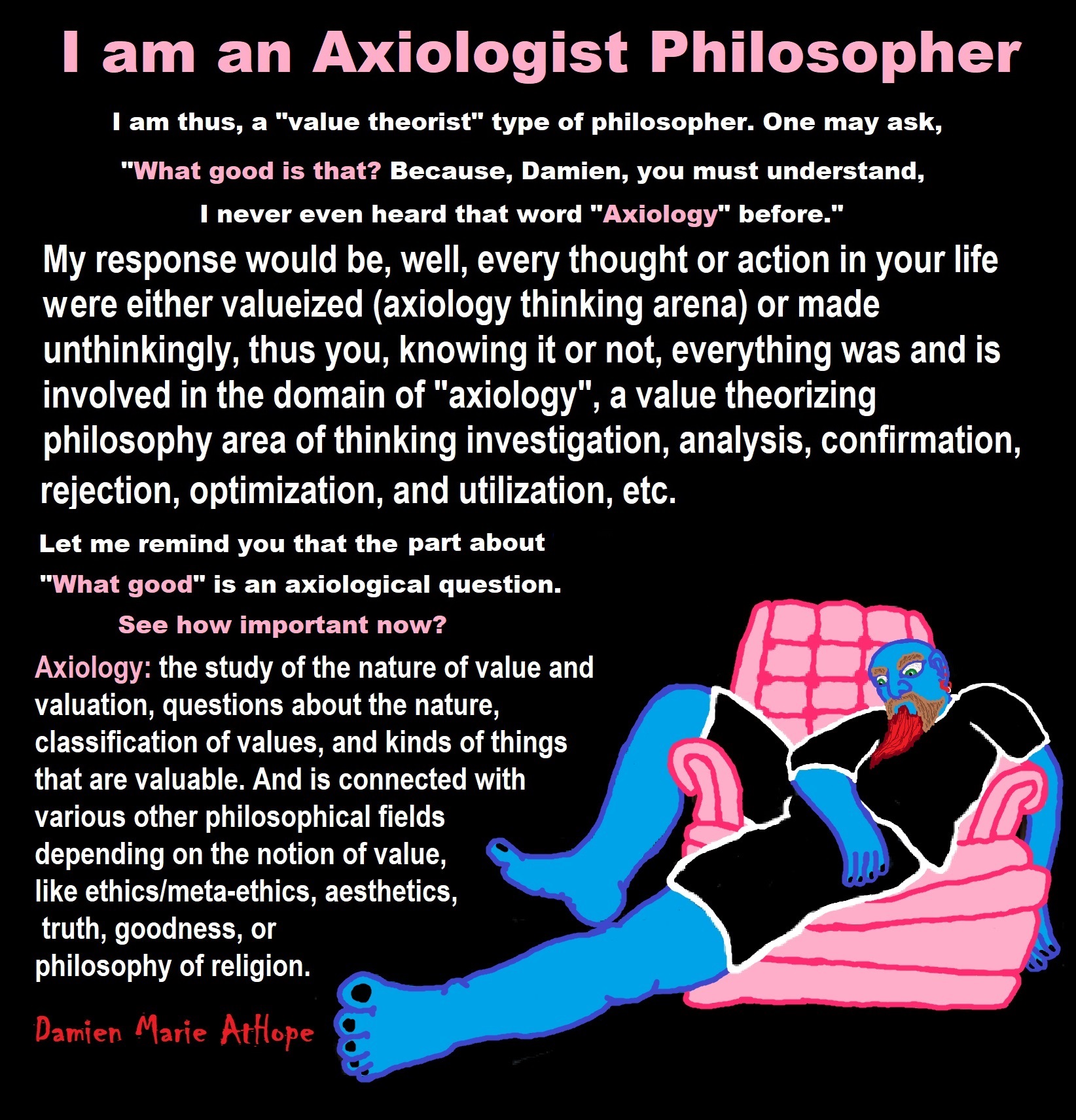
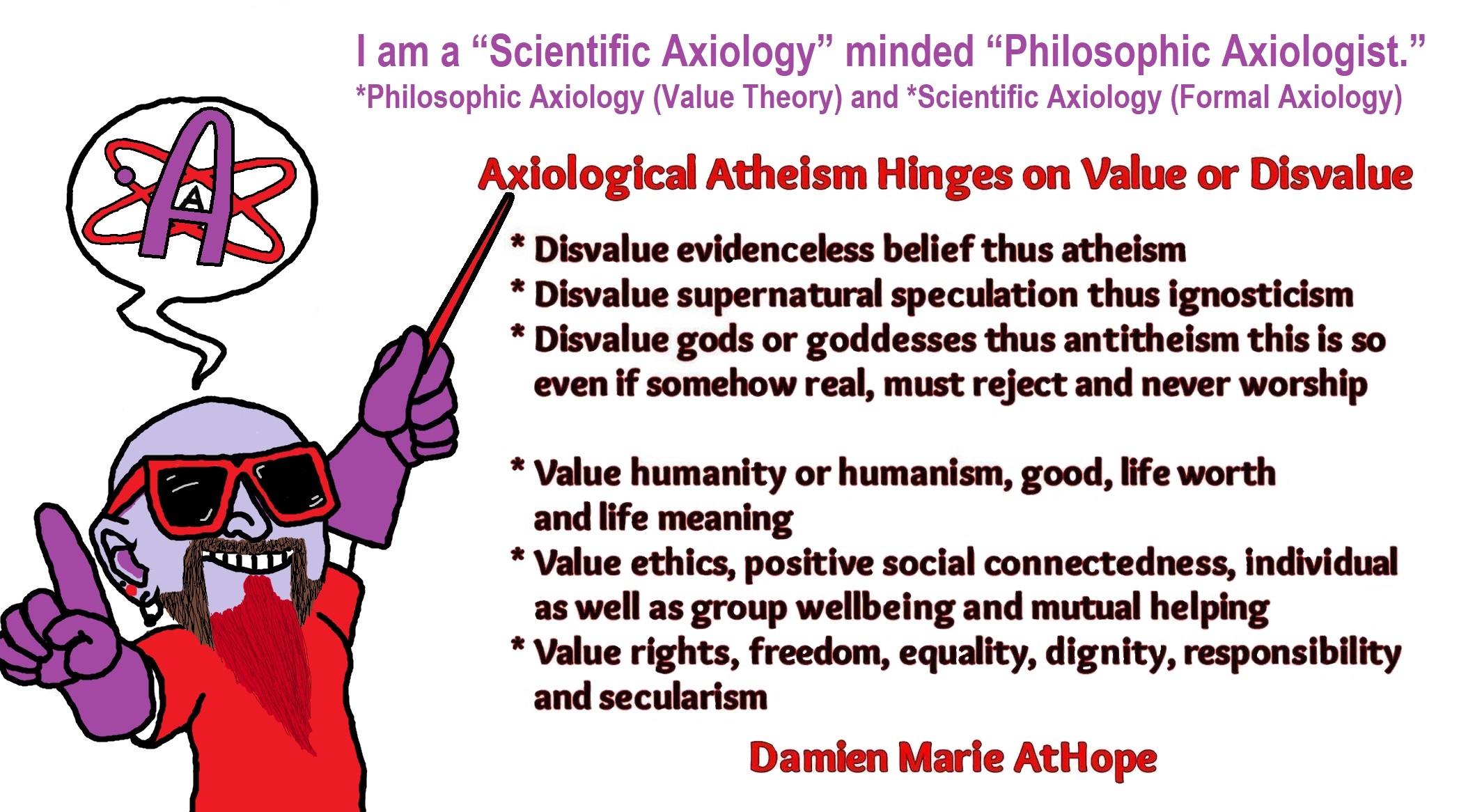
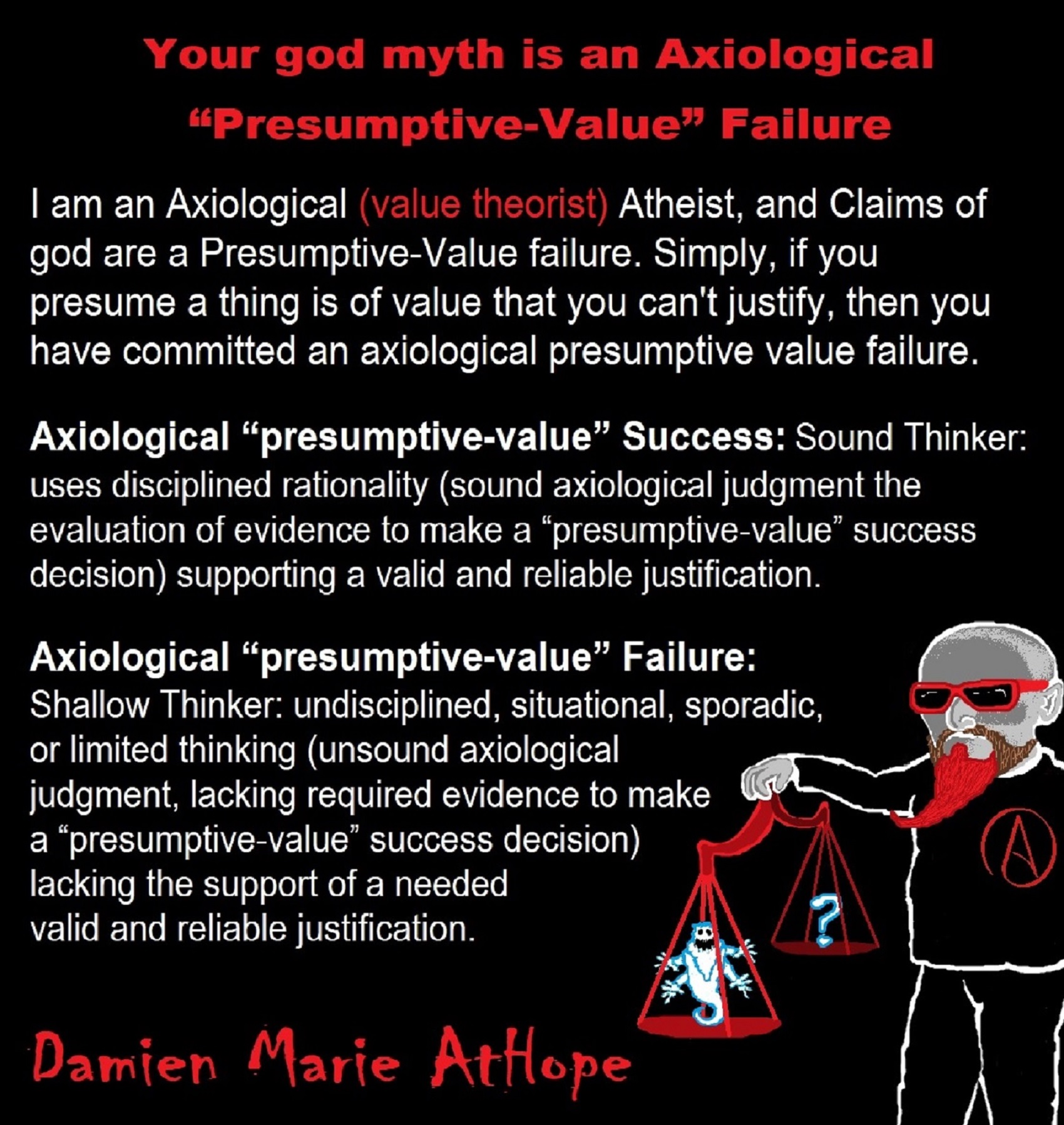
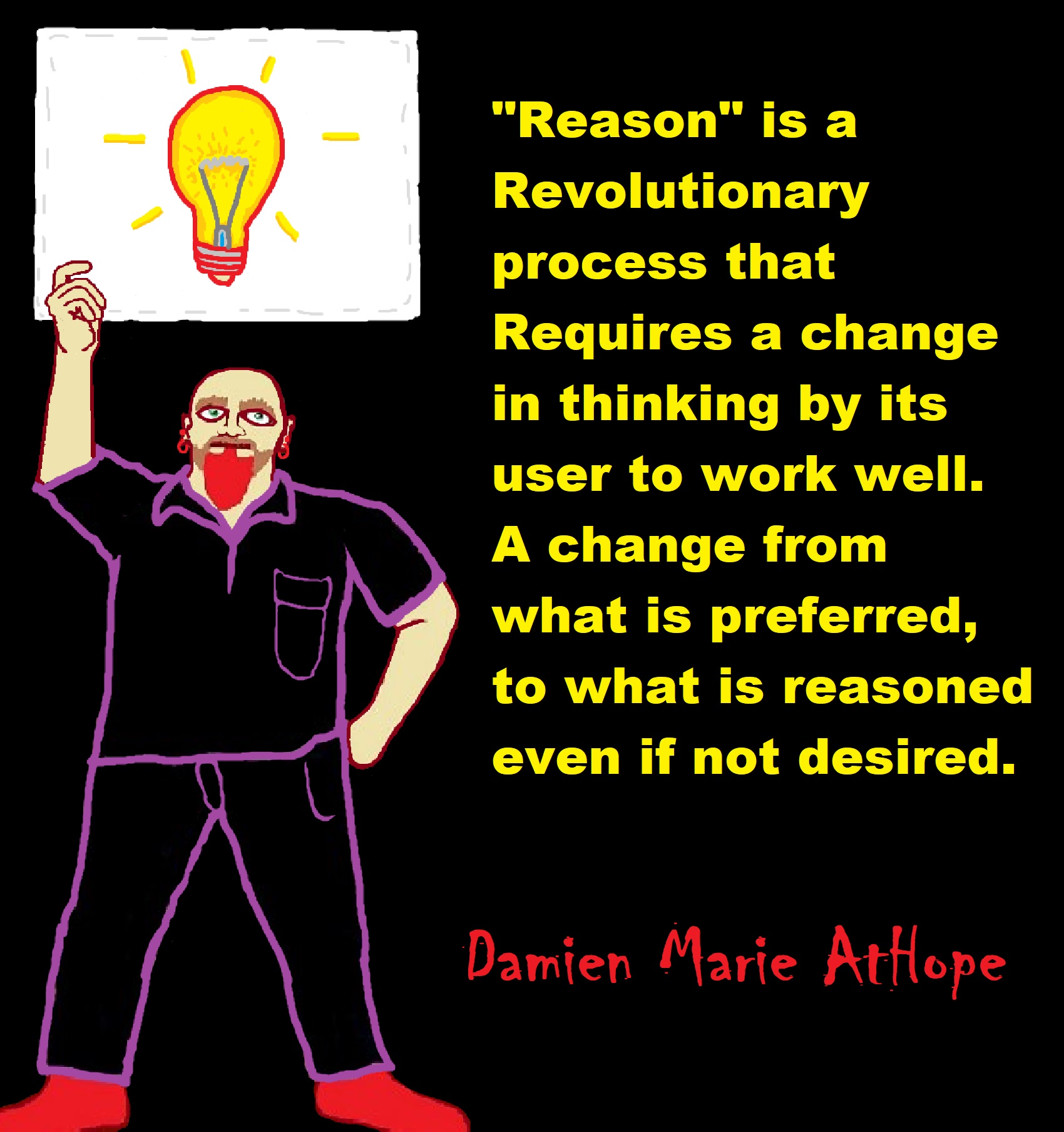

I am an Axiological (value theorist) Atheist, and Claims of god are a Presumptive-Value failure. Simply, if you presume a thing is of value that you can’t justify, then you have committed an axiological presumptive value failure.
Axiological “presumptive-value” Success: Sound Thinker: uses disciplined rationality (sound axiological judgment the evaluation of evidence to make a decision) supporting a valid and reliable justification.
Axiological “presumptive-value” Failure: Shallow Thinker: undisciplined, situational, sporadic, or limited thinking (unsound axiological judgment, lacking required evidence to make a “presumptive-value” success decision) lacking the support of a needed valid and reliable justification.
Often I get disheartened to see that so many people can look at the unknown or that which is devoid of any and all understanding and claim to know that this is evidence for some god or another. How can they with all honesty even say that they somehow already know about an established scientific unknown, when all along it is what it ever was, which I will remind you, is currently holding a confirmed status of unknown. Thus, still fully intact as currently unknowable (I.e. you simply cannot justifiability claim that such unknown is god or evidence of god). What really is a god anyway? The term god equals mystery that is used to explain the mysterious leaving us with yet more mystery, thus explains nothing.
Claims of god are a Presumptive-Value failure. Simply, if you presume a thing is of value that you can’t justify, then you have committed an axiological presumptive value failure. Axiological “presumptive-value” Success: Sound Thinker: uses disciplined rationality (sound axiological judgment the evaluation of evidence to make a decision) supporting a valid and reliable justification.
Bigfoots, Unicorns, and Gods the rational conclusion using axiology?
So how do we form rational conclusions? More importantly, how do we differentiate between the levels involved to establish a conclusion’s rational viability.
It takes axiology or the value judgment the worthiness or lack thereof in relation to the available reason and evidence.
So let’s start with the axiological viability of Bigfoots
There is no available evidence for Bigfoots.
But is their proposition outside of reason?
Always start in reality from the evidence we do know, such as a primate/nonhuman hominid close to that of both humans and other nonhuman primates is not entirely outside all possibility of reason even though lacking all evidence. Therefore, belief is not warrant and the axiological worthiness of possibility is low enough to motivate disbelief.
The axiological viability of Unicorns (ie. a horse with a single horn on its head)
There is no evidence for Unicorns.
But is their proposition outside of reason?
As always start in reality from the evidence we do know, such as by looking at the evolution of the horse not once was there a horn on any of the several stages of animals to the horse we know today. So it is relatively outside of possibility though as it is still only claiming non-fantastic attributes it is only somewhat ridiculous. Therefore, belief is not in any way warranted and the axiological worthiness is so low to highly support disbelief, a negation ie. contradiction or denial of belief.
Now the axiological validity of Gods
There is no evidence for Gods.
But is their proposition outside of reason?
As always start in reality from the evidence we do know, such as never in the history of scientific research or investigation has any supernatural claims shown to be true. So it is completely outside of possibility and is utterly ridiculous. Therefore, belief should be rejected as there are no warrants at all and it is axiologically unworthy to such a preponderance to demand disbelief, a negation ie. contradiction or denial of belief.
“Ok, So basically, the difference between reasoning with evidence and without?” – Questioner
My response, Well with or without valid justification because of evidence. As in you can’t claim to know the value of something you can’t demonstrate as having good qualities to attach the value claim too so if you lack evidence of the thing in question then you cannot validate its value. So it’s addressing a kind of justificationism (uncountable) Theory of justification, An (philosophy standard) approach that regards the justification of a claim as primary, while the claim itself is secondary; thus, criticism consists of trying to show that a claim cannot be reduced to the authority or criteria that it appeals to.
Think of is as a use-matrix. If I say this is of great use for that, can you validate its use or value, and can I use this as a valid method to state a valid justification for my claims without evidence to value judge from? No, thus an axiological presumptive-value failure as a valid anything.
“Theory of justification is a part of epistemology that attempts to understand the justification of propositions and beliefs. Epistemologists are concerned with various epistemic features of belief, which include the ideas of justification, warrant, rationality, and probability. Loosely speaking, justification is the reason that someone (properly) holds a belief. When a claim is in doubt, justification can be used to support the claim and reduce or remove the doubt. Justification can use empiricism (the evidence of the senses), authoritative testimony (the appeal to criteria and authority), or reason.” – Wikipedia
“Presumptions are things that are credited as being true until evidence of their falsity is presented. Presumptions have many forms and value (Axiology) is just one. In ethics, value denotes the degree of importance of something or action, with the aim of determining what actions are best to do or what way is best to live (normative ethics), or to describe the significance of different actions. It may be described as treating actions as abstract objects, putting VALUE to them.” ref, ref
“It deals with right conduct and living a good life, in the sense that a highly, or at least relatively high valuable action may be regarded as ethically “good” (adjective sense), and that an action of low value, or relatively low in value, may be regarded as “bad”. What makes an action valuable may, in turn, depend on the ethic values of the objects it increases, decreases or alters. An object with “ethic value” may be termed an “ethic or philosophic good” (noun sense). Values can be defined as broad preferences concerning appropriate courses of actions or outcomes. As such, values reflect a person’s sense of right and wrong or what “ought” to be.” ref, ref
“Equal rights for all”, “Excellence deserves admiration”, and “People should be treated with respect and dignity” are representatives of values. Values tend to influence attitudes and behavior and these types include ethical/moral values, doctrinal/ideological(religious, political) values, social values, and aesthetic values. It is debated whether some values that are not clearly physiologically determined, such as altruism, are intrinsic, and whether some, such as acquisitiveness, should be classified as vices or virtues.” ref, ref
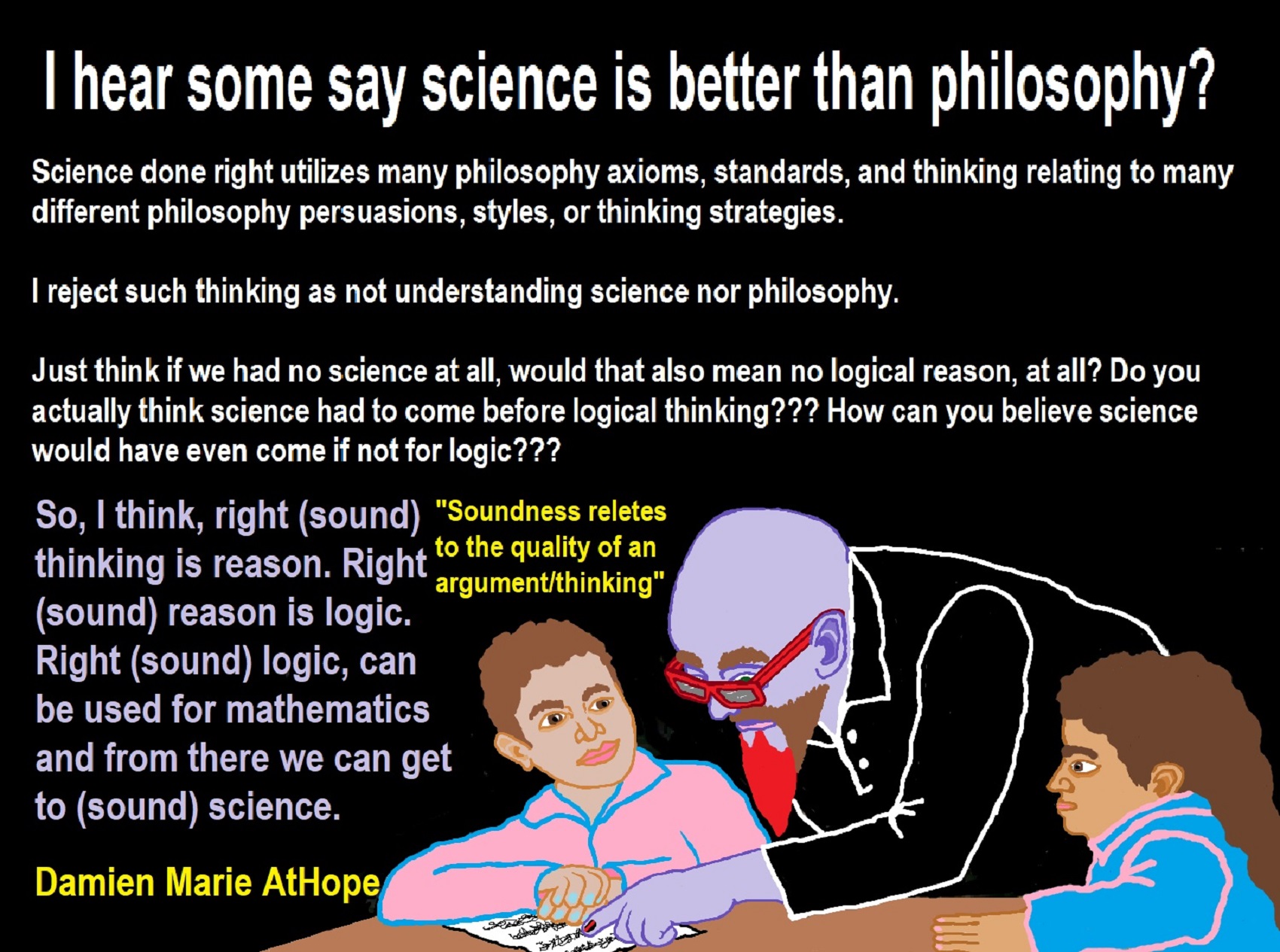
I am a “Scientific Axiology” minded “Philosophic Axiologist.”
*Philosophic Axiology (Value Theory) and/or “Scientific Axiology (Formal Axiology).
Formal Axiology: Another Victim in Religion’s War on Science by Dr. Kelleher
Interview of Formal Axiological Atheist Dr. William Kelleher
Axiology and Value Theory?
“Value theory is a range of approaches to understanding how, why, and to what degree persons value things; whether the object or subject of valuing is a person, idea, object, or anything else. This investigation began in ancient philosophy, where it is called axiology or ethics.”– Wikipedia“The term “Value Theory” is used in at least three different ways in philosophy. In its broadest sense, “value theory” is a catch-all label used to encompass all branches of moral philosophy, social and political philosophy, aesthetics, and sometimes feminist philosophy and the philosophy of religion — whatever areas of philosophy are deemed to encompass some “evaluative” aspect. In its narrowest sense, “value theory” is used for a relatively narrow area of normative ethical theory particularly, but not exclusively, of concern to consequentialists. In this narrow sense, “value theory” is roughly synonymous with “axiology”. Axiology can be thought of as primarily concerned with classifying what things are good, and how good they are. – (Stanford Encyclopedia of Philosophy)
“For instance, a traditional question of axiology concerns whether the objects of value are subjective psychological states or objective states of the world. But in a more useful sense, “value theory” designates the area of moral philosophy that is concerned with theoretical questions about value and goodness of all varieties — the theory of value. The theory of value, so construed, encompasses axiology, but also includes many other questions about the nature of value and its relation to other moral categories.” – (Stanford Encyclopedia of Philosophy)
“The division of moral theory into the theory of value, as contrasting with other areas of investigation, cross-cuts the traditional classification of moral theory into normative and metaethical inquiry, but is a worthy distinction in its own right; theoretical questions about value constitute a core domain of interest in moral theory, often cross the boundaries between the normative and the metaethical, and have a distinguished history of investigation.” – (Stanford Encyclopedia of Philosophy)
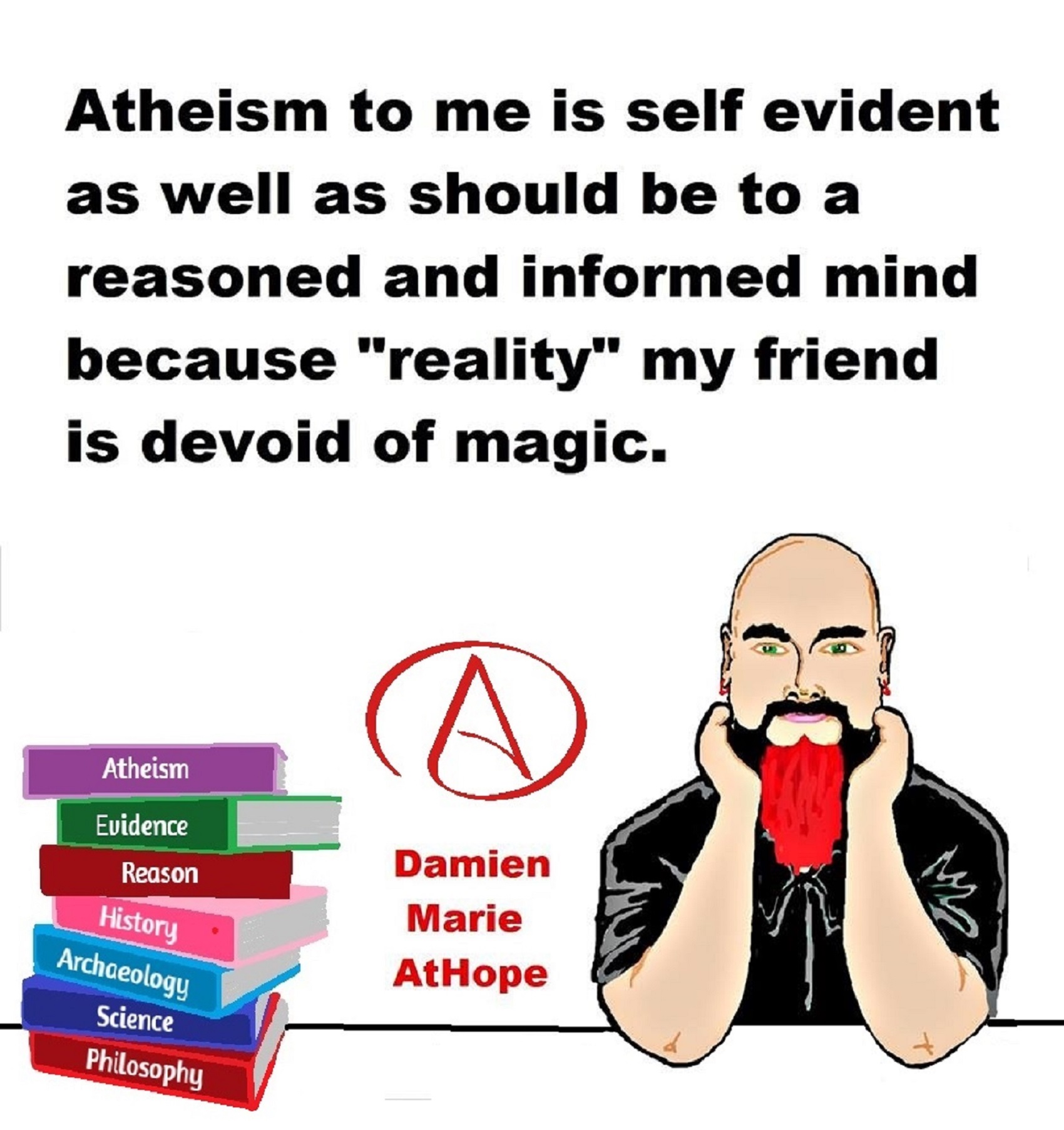
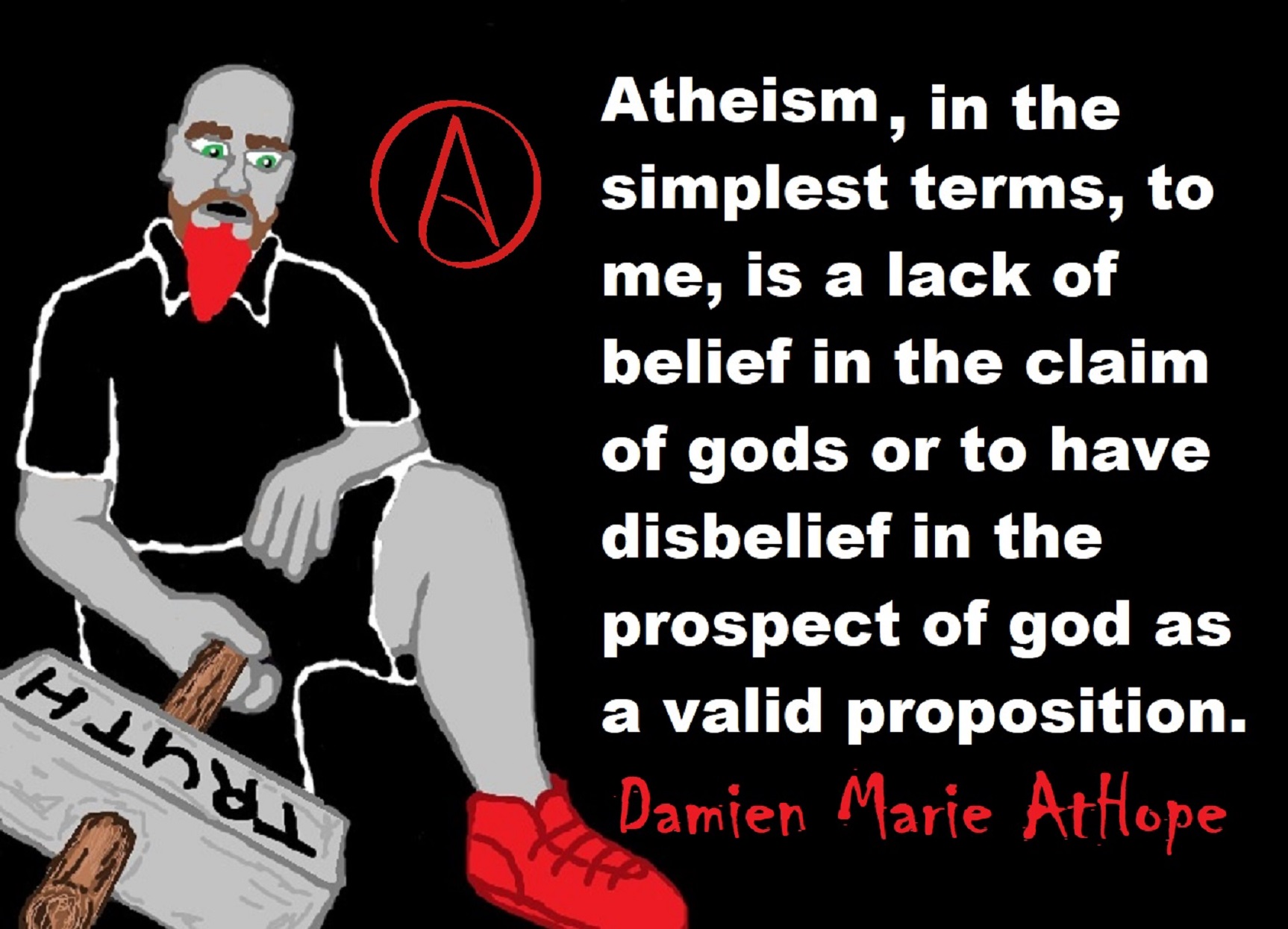
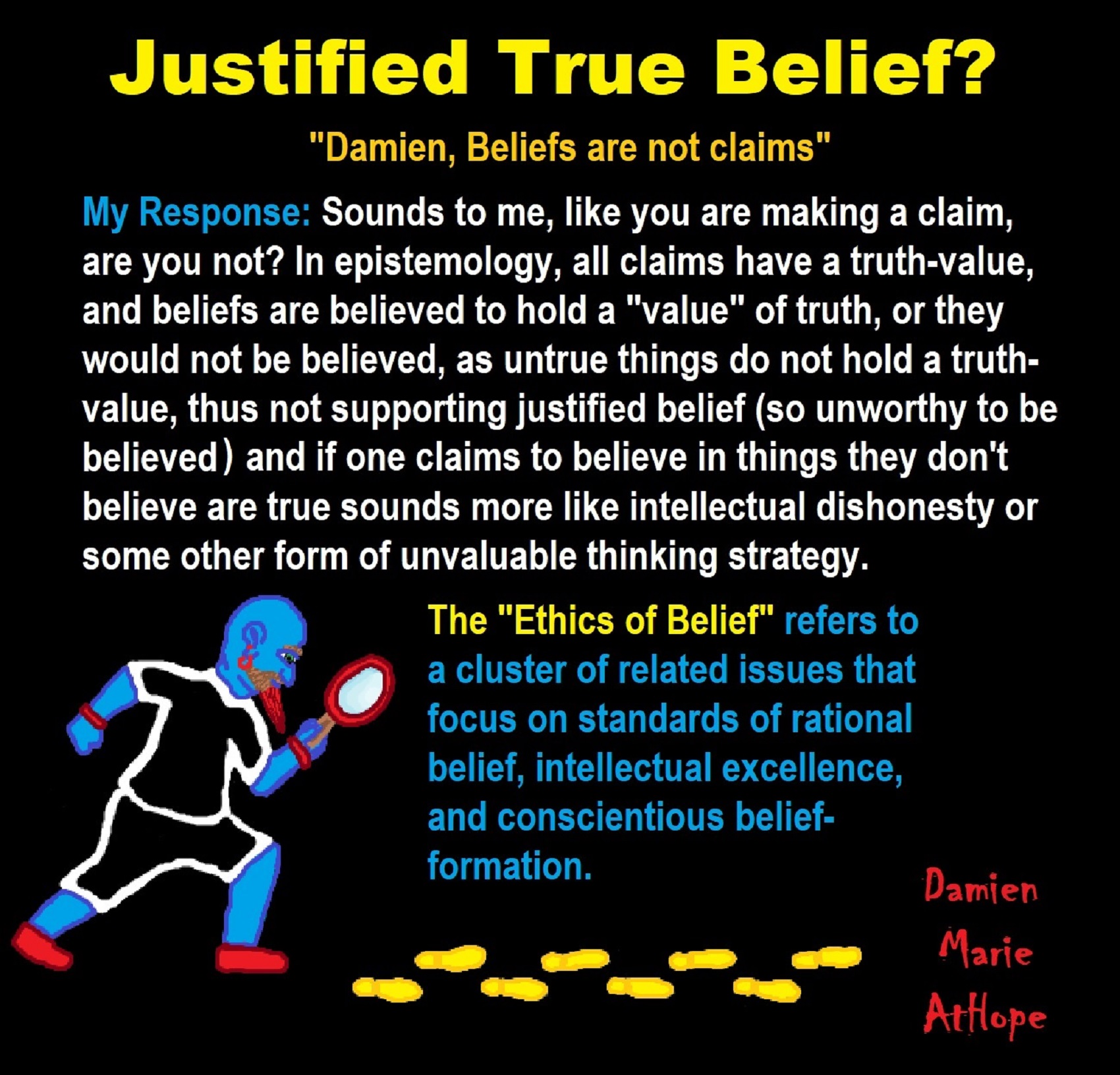
Axiological atheism can be thought to involve ethical/value theory reasoned and moral argument driven apatheism, ignosticism, atheism, anti-theism, anti-religionism, secularism, and humanism. The valuations move up the latter as the levels of evaluation is made to value judge all the elements to better understand the value or disvalue available to reach the most accurate valuation reasonable with a sound aware value conciseness. Axiological atheism can be thought to involve Ethical Atheism.
Below shows the 7 axiological atheism argument flow to show the value layers and my thoughts on it:
1.Apatheism: we are born and by the fact reality is devoid of magic removes theological desires to understand the obvious naturalistic world, until we learn otherwise. (a “presumptive-value” failure, thus no motivation to adequately start the evaluation needed to understand if there is real value for an Axiology assessment to accurately place it in the value hierarchy). = no theistic value“presumptive-value”Failure
2.Ignosticism: Sees theological arguments and language as equivocation, contradictory, and/or un-cognitively relatable other than emotionalism or the like. I see Ignosticism as using the Theological non-cognitivism arguments of “mind understanding issues” (rationalism challenging) and an evidentialist/verificationist arguments of “lacking evidence issues” (empiricism challenging). As an atheist, I am a person who disbelieves or lacks belief in the existence of god or gods. In my non-belief, I am also ignostic feeling that every theological position assumes too much about the concept of god(s).
As an ignostic, I am a person who rational no idea of anything from reality whatever to label as “a concept of god” thus I can say I have no idea of anything that can connect to the term god and no reason to think anyone else can either. (again a “presumptive-value” failure, no good Ontology of the thing for Identifying values that could influence belief but without what is needed to understand if there is real value for an axiology assessment to accurately place it in the value hierarchy). = no theistic value “presumptive-value” Failure
3. Atheism: As an atheist, I am a person who disbelieves or lacks belief in the existence of god or gods. In my non-belief, I am also ignostic feeling that every theological position assumes too much about the concept of god(s). As an ignostic, I am a person who rational no idea of anything from reality whatever to label as “a concept of god” thus I can say I have no idea of anything that can connect to the term god and no reason to think anyone else can either. Atheists talk about gods and religions for the same reason doctors talk about cancer, they are looking for a cure or a firefighter talking about fires because they burn people and they care to stop them.
We atheists too often feel a need to help the victim’s of mental slavery, held in the bondage that is the false beliefs of gods and the conspiracy theories of reality found in religions. If you think you believe in a god, “what do you mean by god,” saying a name tells me not one thing about the thing I am asking to know “its” beingness / thingness / attributes / qualities. Thus, what is the thing “god” to which you are talking about and I want you to explain its beingness /thingness / attributes/ qualities? Religious/theistic people with supernatural beliefs often seem as though they haven’t thought much about and that is something we can help using ontology questions about the beingness / thingness / attributes/ qualities they are trying to refer to. What do you mean by god, when you use the term god? And, I am not asking you for the name you attach to the thing you label as a god. I don’t need to know what the god you believe is known “by.” I am asking, what is the thing you are naming as a god and what that thing is, its qualities in every detail like all things have if they are real.
Are you just making stuff up or guessing/hoping or just promoting unjustified ideas you want to believe, what is a god? As an atheist, I feel more wonder than I did as a theist because I thought, “big deal” to any wonder I experienced, thinking god could do anything. So with such an unrealistic mindset, everything lost its wonder but it’s the opposite as an atheist. As a theist, the world was full of superstitions and supernatural magic possibilities and thus utilized thinking that was not in the real world. As an atheist all I have now is the real world, not that all atheists seem to get this, we all are in a real world devoid of magic anything, therefore, everything adds to my feeling of awe. There should be little debate with atheist acknowledging discernable reality compared to theists with non-reality claims. Yes, I have way more awe and wonder as an atheist than I ever had as a theist because as a theist anything was possible with god. Therefore, as a theist things where not that amazing.
However, as an atheist grasping what an absolute accidental or how random things are, with a 95 to 99 % of all life ever existing on this planet went extinct. I am thoroughly amazed we are even here the evolved children of ancient exploded stars, likely born in galaxies born in super-massive black holes, it’s all amazing. There is no evidence for Gods. But is their proposition outside of reason? As always start in reality from the evidence we do know, such as never in the history of scientific research or investigation has any supernatural claims shown to be true. So it is completely outside of possibility and is utterly ridiculous.
Therefore, belief should be rejected as there are no warrants at all and it is axiologically unworthy to such a preponderance to demand disbelief. (yet again a “presumptive value” failure, no good Ontology of the thing, not the cognitively meaningful claims relatable to reality that must be attached to all magic and gods claims for Identifying values that could influence belief but without what is needed to understand if there is real value for an axiology assessment to accurately place it in the value hierarchy). = no theistic value “presumptive-value” Failure
4. Antitheism: Anti-theism requires more than either merely disbelieving in gods or even denying the existence of gods. Anti-theism requires a couple of specific and additional beliefs: first, that theism is harmful to the believer, harmful to society, harmful to politics, harmful, to culture, etc.; second, that theism can and should be countered in order to reduce the harm it causes. If a person believes these things, then they will likely be an anti-theist who works against theism by arguing that it be abandoned, promoting alternatives, or perhaps even supporting measures to suppress it. It’s worth noting here that, however, unlikely it may be in practice, it’s possible in theory for a theist to be an anti-theist.
This may sound bizarre at first, but remember that some people have argued in favor of promoting false beliefs if they are socially useful. To me, I think many may have a misconception of the term. Atheism and anti-theism so often occur together at the same time and in the same person that it’s understandable if many individuals fail to realize that they aren’t the same. Making a note of the difference is important, however, because not every atheist is anti-theistic and even those who are, aren’t anti-theistic all the time. Atheism is simply the absence of belief in gods; anti-theism is a conscious and deliberate opposition to theism.
Many atheists are also anti-theists, but not all and not always. To me as an antitheist, I see the concept of gods antihumanistic and wholly harmful to a free humanity, and if the so-called gods somehow do end up being real that I will switch to direct opposition as I would any tyrant oppressing humanity. Antitheism (sometimes anti-theism) is a term used to describe an opposition to theism. The term has had a range of applications and definitions. In secular contexts, it typically refers to direct opposition to the validity of theism, but not necessarily to the existence of a deity. As an anti-theist, I am a person who is active in opposition to theism: both the concepts of god(s) as well as the religions that support them.
This is because theistic concepts and theistic religions are harmful and that even if theistic beliefs were true, they would be undesirable. (And, again a “presumptive value” failure, of the other value challenges of the lesser evaluations and value judgments addressed in the apatheism, ignosticism, atheism value judgment conclusion, and an Axiological Atheism assessment of the god concept that must be attached to all magic and gods claims Identifying a lack of value and/or disvalue that influence harm to real value in an axiology assessment to accurately place its value violations in the value hierarchy).
5.Antireligionism: Not just Atheist, axiological atheists should be antitheists but this generally will involve anti-religionism. it would generally thus hold anti-religionist thinking. Especially, I am an anti-religionist, not just an atheist, and here is why summed up in three ideas I am against. And, in which these three things are common in all religions: “pseudo-science”, “pseudo-history”, and “pseudo-morality”. And my biggest thing of all is the widespread forced indoctrination of children, violating their free choice of what to not believe or believe, I hate forced hereditary religion. And my biggest thing of all is the widespread forced indoctrination of children, violating their free choice of what to not believe or believe, I hate forced hereditary religion. As well as wish to offer strong critiques regarding the pseudo-meaning of the “three letter noise” people call “G.o.d” (group originated delusion)!
As an anti-religionist, I am a person who can look at religion on the whole and see it is detrimental to the progress of humanity thus am in opposition to all and every religion, not even just opposition to organized religion. In case you were wondering, I am anti-pseudoscience, anti-supernatural, and anti-superstition as well. May I not be a silent watcher as millions of children are subjugated almost before their birth let alone when they can understand thought and are forcibly coerced, compelled, constrained, and indoctrinated in the mental pollution that religion can be. My main goal against religion is to fully stop as much as possible forced indoctrination, one could ask but then why do I challenge all adults faith?
Well, who do you think is doing the lying to children in the first place. End Hereditary religion, if its a belief let them the equal right to choose to believe. “Religion is an Evolved Product” and Yes, Religion is Like Fear Given Wings… (And, one last time a “presumptive value” failure, of the other value challenges of the lesser evaluations and value judgments addressed in the apatheism, ignosticism, atheism value judgment conclusion and an Axiological Atheism assessment of the god concept and anti-theism assessment of the god show not just a lack of value but a possibly or likely harm demonstrating bot just a lack of value but a real disvalue and that includes the religions potentially removing value in an axiology assessment to accurately place it in the value hierarchy).
6. Secularism: is the only honorable way to value the dignity of others. If it was not true that there is a large unequal distribution of religion contributing to violence then there would be equal religion and atheist secularism violence. You do not see atheists bombing agnostics the very idea is laughable however even different branches of the same religion do will and have killed one another. So, violence is not who we are, it’s something we need to be compelled to do. Therefore, please support secularism.
We are all one connected human family, proven by DNA showing we should treat each other as fellow dignity beings, supported equally (no gods and no masters). States may often have powers, but only citizens have the glue of morality we call rights. And, as they say, in my “dream society”, lots of things are free (aka. planting free food everywhere, free to everyone); but I wonder what you mean when people say you can’t just let things be free, I think, yeah, how can I take free stuff from a free earth.
If one observes the virtues of (T. R. U. E. “The Rational Universal Ethics” or “The Responsible Universal Ethics”) that connect to all things as that of the connectedness equality like those which mirror the rays of the sun, fall down equally with a blind but fair indifference. (what is being expressed is that this sun shining will not favor one over another, no, the same upon everyone offering its light to all plant, animal, human, women, men, single or married, homosexual, bisexual, heterosexual, nonreligious, religious, people of means and those without, able-bodied and those which special needs, people of color, and those who are not, those with access to resources and those which out, young and elderly, etc.) All who wish to follow T. R. U. E. thus embodying a universalize equalitarian standard of ethics should strive to be like a ray of connected light to the world, shining equally and freedom to all of the world.
By such efforts a nonbiased unitive ethical approach is possible, one would have an increase in positive feelings to help others understanding equalitarian connectedness. If you don’t think different you will not behave differently, if you have never lived differently it is hard to see things differently and if you do not strive to understand difference one is thus unknowingly or not bound by limited encapsulation.
I am for a Free Secular Society. I am not for oppression or abuse of religious believer and want a free secular society with both freedoms of religion and freedom from religion. Even though I wish the end of faith and believing in myths and superstition, I wish this by means of informing the willing and not force of the unwilling. I will openly challenge and rebuff religious falsehoods and misunderstanding as well as rebuke and ridicule harmful or unethical religious ideology or behavior.
7. Humanism: is the philosophic thinking that humans can solve human problems by human means, without feeling a need to appeal to the likes of holy books, mystical anything, nor the belief in gods or religions. But, instead, aspires to a true belief in humanity, viewing it with a persuasion of equality. This caring realist thinking found in humanism utilizes an unstated assumption or aspiration, to do no harm as much as possible and to do good whenever one can.
Moreover, we are all one connected human family, proven by DNA showing we should treat each other as fellow dignity beings, supported equally. And, no one really owns the earth, we may make claims to it even draw lines on maps thinking this makes the fantasy borders, illusion supported by force, and the potential for threat. Thus the ethical truth is we need to share the earth as communally as possible. And use the resources as safe and ethically as possible striving towards sharing and caring. (do no Harm and do good = Humanism). My core definition of humanism is that humans can solve human problems by human means.
I am not saying other things can’t or shouldn’t be added to it but to me, a definition of humanism must always contain something coherent to such a thinking or not contradict such as I have offered. Thus, why it is appropriate to say “good without god” when one is a humanist.
I argue for Atheism on scientific, archaeologically/anthropologically, philosophical, social/humanitarianism, and prehistorical/historical grounds.
Archaeological, Scientific, & Philosophic grounds: Link
Prehistorical/historical grounds: Link
Social/humanitarianism grounds: Link
So, What is a god?
If you think you believe in a god, “what do you mean by god,” saying a name tells me not one thing about the thing I am asking to know “its” beingness/thingness/attributes/qualities. Thus, what is the thing “god” to which you are talking about and I want you to explain its beingness/thingness/attributes/qualities? Religious/theistic people with supernatural beliefs often seem as though they haven’t thought much about and that is something we can help using ontology questions about the beingness/thingness/attributes/qualities they are trying to refer to. What do you mean by god, when you use the term god?
And, I am not asking you for the name you attach to the thing you label as a god. I don’t need to know what the god you believe is known “by.” I am asking, what is the thing you are naming as a god and what that thing is, its qualities in every detail like all things have if they are real. Are you just making stuff up or guessing/hoping or just promoting unjustified ideas you want to believe, what is a god?
Do you want what is true or want what you believe without concern for what may actually be true?
I want a war of ideas where the loser is ignorance or hate and the victor is kindness and a rational mind. Not another religious war with people where the loser is always humanity no matter the victor. What I hope for with my discussions or expressed ideas is not so much to strive to change people’s mind. But instead, I wish to inspire your mind to reason and to thrive on the search for valid and reliable evidence as well as a high standard n your ethics of belief. This ethics of belief I hope everyone adopts is something like this: reasoned belief acquisitions, good belief maintenance, and honest belief relinquishment. Sadly the professed thing of hope, “Religion” can be and too often is an easy excuse to do horrible things, which is clear throughout history.
I am a BIG fan of the truth.
“Where did you find it?! Mankind has been diligently seeking truth since time memorial!” – Challenger
My response, Your statement is a “truth claim” right after asking about truth: “Where did you find it?! Mankind has been diligently seeking truth since time memorial! (a “truth claim” emphasized with two exclamation marks seeming to demonstrate that you believed you had said a confirmed truth. So you do believe you have found a truth while acting as if you don’t know, and seemingly by your strength of assertion, believe I guess, that no one can but here I am teaching you truth!!!I have been asked before, how can I stand to deal with illogical, ones lacking critical thinking, the unreasonable, misinformed but fully believe, deliberately uninformed or deluded people, often so kindly?Well, I believe in others, or at least their ability to reason even if you don’t know how or are not paying attention currently. I can do deal with most people as I am often fighting for them even if they only feel I am against them and it usually is not that hard to do with a heart of compassion, as I care for the future of humanity and people have value.
And, if people don’t listen or grasp the logic, I try something else like reasoning. If they will not listen or grasp reasoning, I will try just getting them to think, maybe on something they can agree or they do understand trying to work them back to the rationalism they are not getting or are avoiding. Then, if I can get them to reason, I build that up to logic. If they don’t seem to get them to thinking or are trying to avoid I can draw them back to feelings, maybe on something they can agree or they do understand trying to work them back to thinking, then reasoning, and then finally back to logic with which they are not getting or are avoiding. In a general way, all reality, in a philosophic sense, is an emergent property of reason, and knowing how reason accrues does not remove its warrant. Feelings are experienced then perceived, leading to thinking, right thinking is reason, right reason is logic, right logic is mathematics, right mathematics is physics and from there all science.
“Damien, what I find interesting is how an atheist like you spends so much time and energy on God and religion.” – Challenger
My response, Well, let’s see, maybe because we atheists and anti-religionists care to inform our fellow humans who have been lied to and are lying to others and often forcing religion on children indoctrinating them with lies over truth and it’s harming us all. You know, all the religious hate groups and religious violence stuff and the like. What I find interesting is how could a responsible caring ethical person stay silent against religions, that my friend is a much better question.
Sometimes trying to reason with agnostics is harder than theists as theists admit they use faith, whereas agnostics don’t admit it. And, if you ask a deep hard question don’t assume that the one answering must limit themselves and not provide an answer that is deep and hard. Lol
You can say you are agnostic as in not sure of your belief or unsure of your unbelief but both are your only choice and thus still a choice just with uncertainty.
“Laws of thought, traditionally, the three fundamental laws of logic: (1) the law of contradiction, (2) the law of excluded middle (or third), and (3) the principle of identity.” ref
https://www.britannica.com/topic/laws-of-thought
“In logic, the law of excluded middle (or the principle of excluded middle) states that for any proposition, either that proposition is true or its negation is true.” ref
Weak Theism and Weak Atheism – Agnostics?
*Weak Theism (Agnostic)?
Weak Theism: Yes, a god(s) and/or goddess(es) exists though I am not sure or don’t know about god(s) and/or goddess(es) at this time.
Weak Theism: Yes, a god(s) and/or goddess(es) exists. However, we have no possibility or certainty of knowing anything about God, now or in the future.
Weak Theism: I think that a god(s) and/or goddess(es) exists but have no proof.
Weak Theism: I think so but cannot be positive that a god(s) and/or goddess(es) exists.
Weak Theism: I don’t know but will lead my life assuming that a god(s) and/or goddess(es) does exist just to be careful, perhaps because of the rewards or to stop some punishments one would receive if a god(s) and/or goddess(es) does exist.
Weak Theism: I worship a god (or a god and goddess, or a goddess, or some combination of god(s) and/or goddess(es) but cannot prove that they exist.
Weak Theism: I doubt it but cannot be sure a god(s) and/or goddess(es) doesn’t exist.
*Weak Atheism (Agnostic)?
Weak Atheism: I don’t know if a god(s) and/or goddess(es). (So, they don’t believe theism thus are atheists)
Weak Atheism: There will never be anyway to know. (So, they don’t believe theism thus are atheists)
Weak Atheism: There is no way to know, but perhaps someone will find a proof or disproof in the future. (So, they don’t believe theism thus are atheists)
Weak Atheism: I cannot give an opinion because there is no way that we can prove the existence or non-existence of God given currently available knowledge. (So, they don’t believe theism thus are atheists)
Weak Atheism: I don’t know but will lead my life in the assumption that no god(s) and/or goddess(es) exists. (So, they don’t believe theism thus are atheists)
Weak Atheism: I will have to withhold my opinion/belief until god(s) and/or goddess(es), if one or many exist, decides to make his, her, or their presence known by a strong provable indicator, which until now has ever happened. (So, they don’t believe theism thus are atheists)
Weak Atheism: The god(s) and/or goddess(es) that various believers worship are like unicorns: they are obviously fictional. However, who knows, I do not have certain disproof.
Feel you don’t know what god is or could be you might be an Ignostic but if so you don’t or can’t believe in theism. Ignosticism is the idea that the question of the existence of God is meaningless because the term “god” has no unambiguous definition. Ignosticism requires a good, non-controversial definition of god before arguing on its existence. (So, they don’t believe theism thus are atheists)
Feel you don’t care what god is or could be you might be an Apatheist but if so you don’t believe in theism. An apatheist is someone who is not interested in accepting or denying any claims that gods exist or do not exist. An apatheist lives as if there are no gods and explains natural phenomena without reference to any deities. (Thus, they don’t believe theism thus are atheists)
Agnostics remember: “If you don’t believe in theism, then you are some type of atheist.”
“Damien have you heard of Agmostics.com“
My response, I am not agnostic, so yes, while I have heard of the website, it does not interest me. I would be classified as anti-agnostic. Thanks for asking.
My Anti-Agnostic Atheism Thinking: https://damienmarieathope.com/2016/02/my-anti-agnostic-atheism-thinking/
And, A Challenge to My Anti-Agnostic Thinking?: https://damienmarieathope.com/2018/04/a-challenge-to-my-anti-agnostic-thinking/
“Damien, I love most everything about you, but how can one be MORE than an agnostic without being dishonest with themselves? I mean, we tell the right they need to have evidence and use logic,… but then as atheists, one does the very thing they just said not to do to religious people… We cannot know for a FACT that there is a god, I understand that… But without some evidence to the contrary, we cant KNOW that there ISNT…. Human intellect and logic only goes so far… Sure, I CHOOSE to live as though there is no god, but in being perfectly honest with ME, I cannot say there isn’t until I have proof… And the argument that you can’t prove a negative is debunked… In math you can prove a negative, so you can do it in other realms as well… The point is, no evidence, no proof, no belief or disbelief. And using the other argument that an atheist is BORN THAT WAY, because it is just no belief is a bunch of crap. By now, atheists have proven that there is a logical thought-based attachment to the term “atheist”. One can bring out the definition all one want, but the evidence is born out every day in the life of an atheist that it is a CHOICE one makes after having weighed the AVAILABLE evidence (or lack thereof) for a god, and dismissing it. The most honest position is to say, “I DONT KNOW, but I CHOOSE to act or be this way”. It has nothing to do with not having balls, or not having an education or intellect ( I have multiple degrees and a 146 IQ).” – Challenger
(My IQ is 135)
My response, Did you read my blogs above?
“IS it rational to ASSUME anything without evidence????? Didn’t you just justify the religious faith of billions????” – Challenger
My response, What! What is a god? Stop claiming to know “things” you do not know nor which you have no clue.
“Damien Marie AtHope if you didn’t understand that then you didn’t read it…. you ASSUMED…. that is performing an action of thought without the requisite LOGIC knowledge to support it, is it NOT?? How then, do you define faith?” – Challenger
My response, You don’t have a universal claim of what a god is, so first do that and make it valid and reliable to even require an assessment.
“Damien Marie AtHope Funny that you would IMMEDIATELY resort to ASSUMING that I believe in a god….Again, you’re assuming something on the basis that I provided an opposition to your thinking…. shame on you.” – Challenger
My response, I understand that all claims of god are made up nothing devoid of any kind of valid and reliable justification or warrant.
“Damien Marie AtHope and the belief you don’t have to provide an argument for something not proven is an easy out for the person that cant admit they don’t KNOW something but nevertheless claim there is no such thing……… Your problem is you try to shut down all dialog with the same claim….” – Challenger
My response, Again, no value is offered to require an assessment for the term god that is not truly anything.
“Damien Marie AtHope that you SAY is not truly anything…. smfh, and again, you shut down all dialog why???? Do you just not WANT to have the conversation??? Do you think there is a possibility there may be a flaw I YOUR logic so you don’t want to pursue it? I don’t understand… help me to understand, instead of stomping on me.” – Challenger
My response, No, I demand a valid offering of the claim and I know that not a person on the Earth can provide me what I asked, and thus it is their failure to establish the burden of proof, not me. Lol And, great read my blogs and then ask me specific questions if you like.
“Damien Marie AtHope and AGAIN, because you can’t get past that SAME LAME front, you won’t try to think any more than the position you CHOOSE to hold… that’s sad.” – Challenger
My response, Do you think logic is evidence?
“Damien Marie AtHope I did… and I JUST DID! Do you??? Be careful how you answer as you will destroy your own walls….” – Challenger
My response, Ask it again relating to a claim I made in the blog.
“Damien Marie AtHope do you think LACK of evidence is evidence?” – Challenger
My response, Reason is my only master. And, No, I can “validate” all my claims.
“Damien Marie AtHope you just want to control things… I see that now… NO, I will ask it in the way I CHOOSE to… you will refuse to answer on that basis, proving my point for me. Damien Marie AtHope so you’re perfect?” – Challenger
My response, Is reason evidence? Archaeological, Scientific, & Philosophic evidence shows the god myth is man-made nonsense: https://damienmarieathope.com/2017/10/archaeological-scientific-philosophic-evidence-showing-the-god-myth-is-man-made-nonsense/
“NO!!! Don’t go to pointing me to other places… that is BULLSHIT! And that does NOTHING anyway, as I am NOT TRYING TO PROVE A GOD…. See? you lack the understanding as to what my position even is….. You do this often.” – Challenger
My response, What is a god to doubt? I don’t start my disbelief on the dilutions of god claims I assess are these claims warranted they are not so nothing to doubt so agnosticism starts with a presupposition of the term god to say they are unsure about, thus to me making a thinking error as there is no presupposition god term to reality. I stand with ignosticism, roughly that the term god is given too much leeway as a valid offering of a possible real thing when no god claim if limited to only reality coherent attributes all add nonsense like supernatural things one of which at its simplest a being or at least a thinking thing with no physical mind but can think, an invisible thing and of courses an immaterial thing such as the no physical body in any way. And there we see the problem with accepting any god claim as even reality coherent as it is not. All claims must be coherent with or correspond to reality and just like many theological nonsense terms such as the soul. I don’t know what people are talking about when they say the term “soul” (it’s a made-up concept which connects to nothing that is reality coherent) as there is no part of the body exhibits as such magic thinking idea, soul, thus a debunked claim and does not need doubt.
Similarly, I don’t know what people are talking about when they say the term “god” (it’s a made-up concept which connects to nothing that is reality coherent) as there is no part of the body exhibits as such magic thinking idea, god, thus a debunked claim and does not need doubt. Kurtz, New Skepticism, 220: “Ignosticism or igtheism, finds the belief in a metaphysical, transcendent being basically incoherent and unintelligible.” And moreover, “Ignosticism or igtheism is the idea that every theological position assumes too much about the concept of God and other theological concepts; including (but not limited to) concepts of faith, spirituality, heaven, hell, afterlife, damnation, salvation, sin, and the soul. Ignosticism is the view that any religious term or theological concept presented must be accompanied by a coherent definition. Without a clear definition, such terms cannot be meaningfully discussed. Such terms or concepts must also be falsifiable. Lacking this, an ignostic takes the theological noncognitivist position that the existence or nature of the terms presented (and all matters of debate) is meaningless. For example, if the term “God” does not refer to anything reasonably defined then there is no conceivable method to test against the existence of god. Therefore, the term “God” has no literal significance and need not be debated or discussed.
“Damien Marie AtHope and therein lies your contradiction!” – Challenger
My response, It is not bullshit to provide blogs that explain what you are trying to ask and I have been arguing with agnostic thinkers for over 10 years.
“Damien Marie AtHope and REPOSTING a repaste of the link I wished NOT to read is lame.” – Challenger
My response, There is no contradictory thing I stay what is a god, then challenge the offered assumptions.
“Damien Marie AtHope, it is bullshit to not form ORIGINAL thought SPECIFICALLY tailored to MY specific question in the NOW…. And, you’re trying to START the conversation with your OWN premise….” – Challenger
My response, Wrong, I start with “What is a god” question, remember, the one, no one can offer?
“Damien Marie AtHope AGAIN, I READ IT IN THE PAST!!!! YOURE the one not reading… and if you’re done like that, then you’re not the person you claim to be… you just lost my respect and unfriending. You just corporatized yourself, you’re no better than a bully.” – Challenger
My response, You do know that I am not the only public atheist, who is not agnostic, right. So are Aron RA, Matt Dillahunty, David Silverman, and Peter Boghossian? Not that I agree with them on all things either.
“Damien Marie AtHope so? I thought you were done… I was talking TO YOU because I respected you…. You want to treat me like a cookie cutter cut out you can throw pre-worded dialog at…. I deserve better than that. I am done here.” – Challenger
My response, Well, to you asking me if reason was evidence, absolutely. In a general way, all reality, in a philosophic sense, is an emergent property of reason, and knowing how reason accrues does not remove its warrant. Feelings are experienced then perceived, leading to thinking, right thinking is reason, right reason is logic, right logic is mathematics, right mathematics is physics and from there all science.
My response, Here is why “Reason is my only master”
The most Base Presupposition begins in reason. Reason is needed for logic (logic is realized by the aid of reason enriching its axioms). Logic is needed for axiology/value theory (axiology is realized by the aid of logic). Axiology is needed for epistemology (epistemology is realized by aid of axiology value judge and enrich its value assumptions as valid or not). Epistemology is needed for a good ontology (ontology is realized by the aid of epistemology justified assumptions/realizations/conclusions). Then when one possesses a good ontology (fortified with valid and reliable reason and evidence) they can then say they know the ontology of that thing.
My response, So, I think, right thinking is reason. Right reason is logic. Right logic, can be used for mathematics and from there we can get to science. And, by this methodological approach, we get one of the best ways of knowing the scientific method. Activating experience/event occurs, eliciting our feelings/scenes. Then naive thoughts occur, eliciting emotions as a response. Then it is our emotional intelligence over emotional hijacking, which entrance us but are unavoidable, and that it is the navigating this successfully in a methodological way we call critical thinking or as In just call right thinking. So, to me, could be termed “Right” thinking, that is referring to a kind of methodological thinking. Reason is at the base of everything and it builds up from pragmatic approaches. And, to me, there are three main approaches to truth (ontology of truth) from the very subjective (Pragmatic theory of truth), to subjective (Coherence theory of truth), then onto objective (Correspondence theory of truth) but remember that this process as limited as it can be, is the best we have and we build one truth ontop another like blocks to a wall of truth.
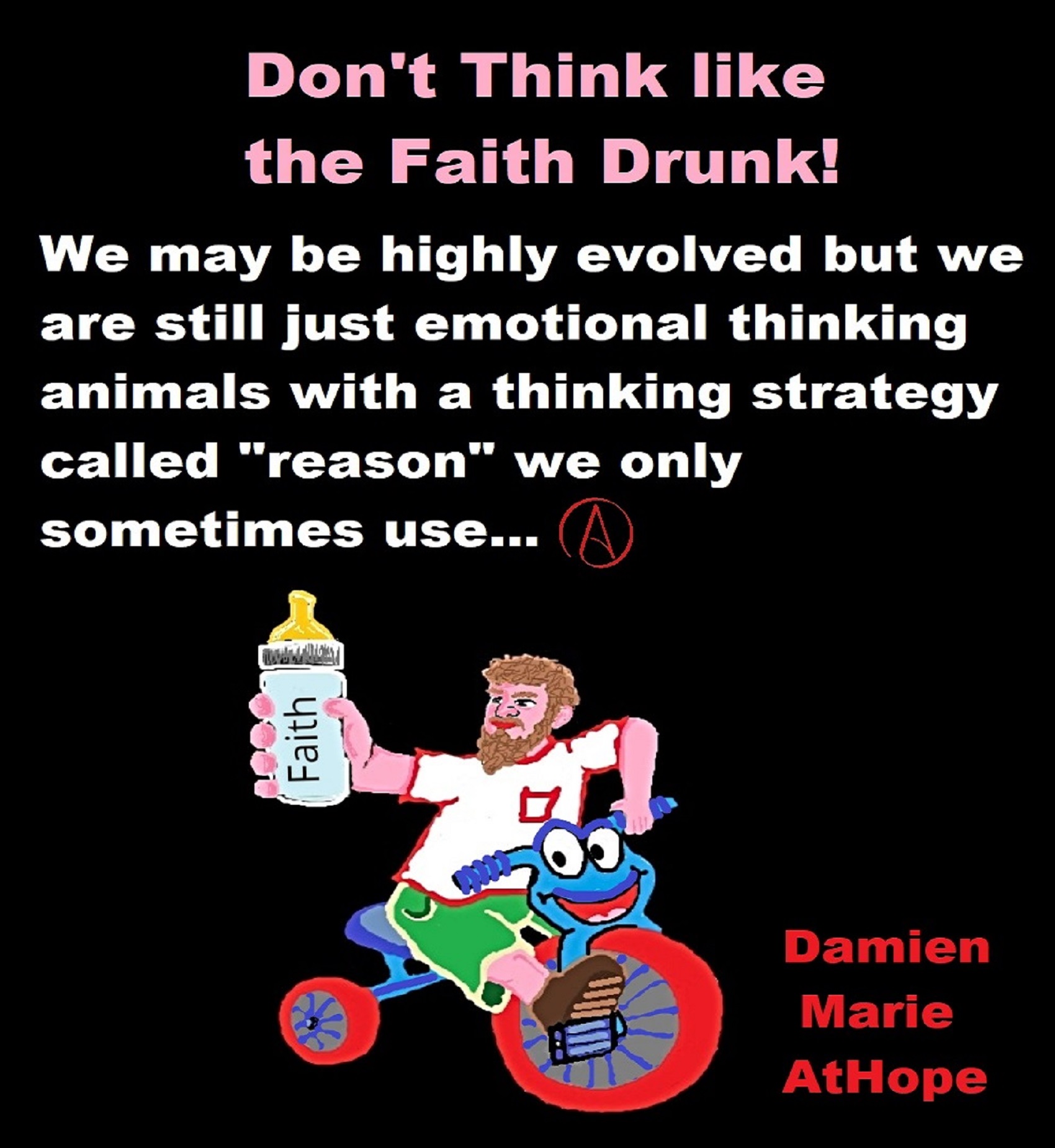

Here is a response from another person seeing this dialog:
“Damien Marie AtHope I’ve encountered this troll before. Don’t waste your time. He’ll be threatening you next from whatever made up a place he claims to live in. When I dealt with him he was from Portland. Your best bet is to block this clear theist troll. I don’t argue with avatars and you are an obvious theist troll. Peace…” – Other Respondent
“And remember you piece of shit, I BLOCKED YOU!! (Other Respondent), you run your mouth online, JUST LIKE YOU ARE DOING HERE, then when I give you my address to come talk that shit in person, you run away like THE TROLL YOU ARE! And thank you for proving my point once again.” – Challenger
“I blocked you, bro. Now you are lying. And this is your 4th or 5th profile I’ve seen you under. Explain that? (Other Respondent), yet here you are…. Not to argue with you. I’m only here to let Damien Marie AtHope know who he is dealing with.” – Other Respondent
“No, I am NOT an OBVIOUS theist anything. If oyu had ANY intelligence, you would see that I am an OBVIOUS AGNOSTIC human being, and YOU are STILL the proven troll. Again… yet here you are… trolling. (Other Respondent), so Damien is too stupid??? Is that what you’re saying??? Damien, EVEN I give you more credit than that!!! Now burn the fuck out you piece of coward shit troll. NO, I BLOCKED YOU!!! Why are YOU lying???!!! I have PLENTY of accounts… Why is THAT any of YOUR business??? Nor does it change the definition of a troll…AGAIN, you’re here spreading LIES that can be PROVEN BY my multiple accounts… I am NOTHING like a theist. Troll, you don’t do definitions though I see… And, Damien, you REALLY should find a better base. At least Trumps ADMIT they don’t care about the truth…“ – Challenger
My response, Challenger, you are the one now acting troll-like and you have tried many personal attacks on me and now others, simply this is not acceptable and not a valid way to talk to people. Please improve your discussion etiquette, as I would and do value as a positive intellectual standard of sticking to ideas and not making it about the people, thanks.
“Damien Marie AtHope I am most CERTAINLY not the one acting troll-like. AGAIN, the definition fits HIS comment, NOT mine…AND AGAIN, all I did was ask a question you went off… stop lying… Personal attacks???? wow… poor you. NOt making it about the people?? Really? You just said that with a straight face???? “So you are not reading then I am finished talking about this with you, cool. Take care.” THIS is why I unfriended you… you’re a liar and a deceiver… AND you make it all about you…. then accuse me of attacking you… I NEVER attacked YOU, I attacked you THINKING… but GOD forbid someone should EVER do that to the great late Damien Marie AtHope… smfh. Then to top it off,… you call ME a troll when WE were the ones IN A CONVERSATION.. or trying to… and then this piece f shit jumps in, THE DEFINITION of a troll… but you IGNORE him because he AGREES with you… YOURE THE ONE that made this the shit it is… Don’t try turning it around. You’re a TYPICAL atheist and prove my point all the way. Atheists are NEVER wrong… And everyone else ALWAYS is… smfh…” – Challenger
My response, Challenger, And this behavior by you is why I am now happy if you do unfriend me. Take care.
Marquis Amon – “To me agnosticism would be an inconclusive position, that god-belief would require an active positive position confirming the concept of god. The act of doubting by default is disbelief. In other words, one would argue FOR the case they are supporting even with some evidence against it. Whereas examining the evidence and being neither for or against the findings means you do not support the position. Deism to me is the belief in gods without religion. That one actively believes a god exists but does not practice theism. A difference in dogmatic principles versus thinking evidence supports the existence of whatever deity they think exists. What I am saying is that one can not believe and disbelieve the same thing. So they are mutually exclusive.”
“I am an agnostic my dear. And it is a state of inconclusiveness. For lack of anything better to call it, I believe that there are positive and negative entities that I cannot see or prove, but I know in my heart that something or someone is watching out for me. There are things that have occurred in my life that cannot be explained by science. I’m not so stupid as to think that there is one Almighty deity hovering around somewhere in the heavens causing things to happen or not happen. But I do believe that there is something that has been around me since birth, protecting me from many many things that could have and even should have happened. And I cannot even blame my own intelligence for stepping away from those things because several times I was under the influence of drugs or alcohol or both. All I know is that I have been blessed. I don’t know how or why, but I have been. That’s my idea of agnosticism. Something is watching out for me and although I can’t prove it and may not know what, it definitely just is.” – Challenger to Marquis Amon
Marquis Amon “I appreciate your answer and more so your honesty(I expect no less of you.) My question is, is your belief of something watching out for you specifically a deity-type entity, or would you classify it as a potential supernatural entity of another kind, such as guardian/ancestor spirit? You also touch upon Damien’s argument of that in spite of evidence you believe in something. Which regards a psychological or emotional position. Is that correct? I mean no disrespect my friend, just this is a sort of semi-formal discussion lol.”
“I’m not offended in the least. I would have to say more of a spiritual guardian type of being. For lack of anything better to call it, a guardian angel so to speak. Whether or not it is psychological or emotional, that is a tough question answer! I believe emotions affect the psychological aspect of our beings, like how some people believe that being in love can make you crazy LOL it feels like both. Psychologically oh, I believe that there is something watching out for me, and emotionally that is comforting to me.” – Challenger to Marquis Amon
My response, the Challenger to Marquis Amon, so you could be a unsure theist, who sound like a somethingist ( or “vague theism” as in an unspecified belief in some higher force, Somethingism). Or you also could be a atheist about gods thus an atheist in that sense and be a animist as in believing in spirit beings. Somethingism, to me, is a vague Theism, where Animism can be atheism with spirit beliefs. With you stating that you are agnostic about gods due to your spirit beliefs is what makes it sound like somethingism rather than just animism.
Marquis Amon “That is because animism existed before god belief and part of evolution of religion from superstitition to organized religion. In my opinion, one could even believe in shamanism and be an atheist. As the spirits they think they communicate with don’t necessarily have to be gods. Interestingly, I think natural human development with magical thinking is animism and not in any way theism.”
“Damien AtHope I’m happy with that description LOL I am a somethingist then. Somethingism, sounds like exactly what I believe!” – Challenger
My response, I am happy to help.
“Damien, how do you feel about agnostics?”
“Damien, how do you feel about agnostics, such as myself. I admire some of the values of some religions as a guide to life, but I get to choose. I am with Pascal and Einstein, I don’t think the concept of God is rational, but I lose nothing by being a decent person, just in case.” Questioner
My response, How you pose the question of how I feel about agnostics, seems to infer that people who are agnostic unless I am misunderstanding, and on such a question of how I feel towards my fellow humans, agnostic or otherwise, well I strive to treat them humanistically, fairly, and equally. If you are instead asking if I am consenting in any way to agnostic thinking, my answer would unequivocally state no. I see agnostic thinking as a flaw in reasoning that seems to at least in some way accept the empty assertions of religion. I always work to attack thinking and not people. Furthermore, I have friends on Facebook that are religious and don’t attack or even give them a hard time, I just address my thinking on my pages not at anyone unless they challenge me or the like.
Agnostics, theistic belief is not the default, a-(without)-theism is.
So if you are without or lack theistic belief you are atheist.
Challenging Agnosticism Assumptions
Aron Ra interviewing me on my “Archaeological/Anthropological Understanding of Religion Evolution”
Understanding Religion Evolution:
- Pre-Animism (at least 300,000 years ago)
- Animism (Africa: 100,000 years ago)
- Totemism (Europe: 50,000 years ago)
- Shamanism (Siberia: 30,000 years ago)
- Paganism (Turkey: 12,000 years ago)
- Progressed organized religion (Egypt: 5,000 years ago), (Egypt, the First Dynasty 5,150 years ago)
- CURRENT “World” RELIGIONS (after 4,000 years ago)
- Early Atheistic Doubting (at least by 2,600 years ago)
“An Archaeological/Anthropological Understanding of Religion Evolution”
If you are a religious believer, may I remind you that faith in the acquisition of knowledge is not a valid method worth believing in. Because, what proof is “faith”, of anything religion claims by faith, as many people have different faith even in the same religion?
Damien Marie AtHope’s Prehistory Knowledge: Art, Blog Posts, and videos
My thoughts on religious progression, and reasoned speculations from the evidence:
Animism (100,000 years ago)
Totemism (50/45,000 years ago)
Shamanism (30/35,000 years ago)
Paganism (13/12,000 years ago)
“Institutional” Progressed Organized Religion (5,000 years ago)
Religion Progression
- Animism (belief in a perceived spirit world) passably by at least 100,000 years ago “the primal stage of early religion”
- Totemism (belief that these perceived spirits could be managed with created physical expressions) passably by at least 50,000 years ago “progressed stage of early religion”
- Shamanism (belief that some special person can commune with these perceived spirits on the behalf of others by way rituals) passably by at least 30,000 years ago
- Paganism “Early organized nature-based religion” mainly like an evolved shamanism with gods (passable by at least 13,000 years ago).
- Institutional religion developed stage of “Progressed Organized Type Religion” as a social institution with official dogma usually set in a hierarchical/bureaucratic structure that contains strict rules and practices dominating the believer’s life.
Religion Progression
1. Animism (belief in a perceived spirit world) passably by at least 100,000 years ago “the primal stage of early religion”
2. Totemism (belief that these perceived spirits could be managed with created physical expressions) passably by at least 50,000 years ago “progressed stage of early religion”
3. Shamanism (belief that some special person can commune with these perceived spirits on the behalf of others by way rituals) passably by at least 30,000 years ago
4. Paganism “Early organized religion” (passably by at least 13,000/12,000 to 5,000 years ago):
*primal stage of organized religion is 13,000 years ago.
*proto stage of organized religion is around 10,000 years ago.
*origin elements leading to the progressed stage of organized religion is around 7,000 years ago.
*developed stage of organized religion is around 5,000 years ago.
I classify Animism (animated ‘spirit‘ or “supernatural” perspectives).
I see all religious people as at least animists, so, all religions have at least some amount, kind, or expression of animism as well.
I want to make something clear as I can, as simple as I can, even though I classify Animism (animated and alive from Latin: anima, ‘breath, spirit, life‘ or peoples’ “spiritual” or “supernatural” perspectives. Potentially, in some animism perceives, all things may relate to some spiritual/supernatural/non-natural inclinations, even a possible belief that objects, places, and/or creatures all possess a distinct spiritual essence, and/or thinking things like all things—animals, plants, rocks, rivers, weather systems, human handiwork, and perhaps even words— could be as animated and alive ref) as the first expression of religious thinking or religion, it is not less than, nor is it not equal to any other religion, or religious thinking. I see all religious people as at least animists any way, so everyone is at least animist, how could it be less than other religions as all other religions have at least some amount, kind, or expression of animism. Animism, +? is what I think about all that say they are spiritual or religious in thinking. Regardless if they know it, understand it, or claim it, they all, to me, an animistic-thinker, plus a paganistic, totemistic, and shamanistic-monotheist, calling themselves a Christian, Jew, or Muslim, as an example of my thinking. Animism (is the other-then-reality thinking relates to, thus it is in all such non-reality thinking generally.
Furthermore, I actually am impressed by animist cultures in Africa, others have seen them as primitive or something, help with that, they are revolutionaries with women’s rights, child rights. I mean if I had to choose a religion it would be animism only like in Africa so I don’t look down on them nor any indigenous peoples, who I care about, as well as I am for “humanity for all.” I challenge religious Ideas, and this is not meant to be an attack on people, but rather a challenge to think or rethink ideas, I want what is actually true. May we all desire a truly honest search for what is true even if we have to update what we believe or know. I even have religious friends, as I am not a bigot.
I class religious thinking in “time of origin” not somehow that any are better or worse or more reasoned than others. No, I am trying to help others understand how things happened, so they understand, and for themselves can finally think does the religion they say they believe in, still seems true, as they believed before learning my information and art. I am hoping I inspire freedom of thought and development of heart as well as mind as we need such a holistic approach in our quest for a humanity free for all and supportive of all. Until then, train your brain to think ethically. We are responsible for the future, we are the future, living in the present, soon to be passed, so we must act with passion, because life is over just like that. I am just another fellow dignity being. May I be a good human.
Here are a few of what I see as “Animist only” Cultures:
“Aka people” Central African nomadic Mbenga pygmy people. PRONUNCIATION: AH-kah
“The Aka people are very warm and hospitable. Relationships between men and women are extremely egalitarian. Men and women contribute equally to a household’s diet, either a husband or wife can initiate divorce, and violence against women is very rare. No cases of rape have been reported. The Aka people are fiercely egalitarian and independent. No individual has the right to force or order another individual to perform an activity against his or her will. Aka people have a number of informal methods for maintaining their egalitarianism. First, they practice “prestige avoidance”; no one draws attention to his or her own abilities. Individuals play down their achievements.” ref
“Mbuti People”
“The Mbuti people are generally hunter-gatherers who commonly are in the Congo’s Ituri Forest have traditionally lived in stateless communities with gift economies and largely egalitarian gender relations. They were a people who had found in the forest something that made life more than just worth living, something that made it, with all its hardships and problems and tragedies, a wonderful thing full of joy and happiness and free of care. Pygmies, like the Inuit, minimize discrimination based upon sex and age differences. Adults of all genders make communal decisions at public assemblies. The Mbuti people do not have a state, or chiefs or councils.” ref
“Hadza people”
“The Hadza people of Tanzania in East Africa are egalitarian, meaning there are no real status differences between individuals. While the elderly receive slightly more respect, within groups of age and sex all individuals are equal, and compared to strictly stratified societies, women are considered fairly equal. This egalitarianism results in high levels of freedom and self-dependency. When conflict does arise, it may be resolved by one of the parties voluntarily moving to another camp. Ernst Fehr and Urs Fischbacher point out that the Hadza people “exhibit a considerable amount of altruistic punishment” to organize these tribes. The Hadza people live in a communal setting and engage in cooperative child-rearing, where many individuals (both related and unrelated) provide high-quality care for children. Having no tribal or governing hierarchy, the Hadza people trace descent bilaterally (through paternal and maternal lines), and almost all Hadza people can trace some kin tie to all other Hadza people.” ref
*Primal superstition starts around 1 million years ago with. Then the development of religion increased around 600,000 years ago with proto superstition and then even to a greater extent around 300,000 years ago with progressed superstition.
Around 100,000 years ago, is the primal stage of early religion, the proto stage of early religion is around 75,000 years ago, or less, the progressed stage of early religion is around 50,000 years ago and finally after 13,500 years ago, begins with the evolution of organized religion. The set of stages for the development of organized religion is subdivided into the following: the primal stage of organized religion is 13,000 years ago, the proto stage of organized religion is around 10,000 years ago, and finally the progressed stage of organized religion is around 7,000 years ago with the forming of mythology and its connected set of Dogmatic-Propaganda-Closure belief strains of sacralized superstitionism. I will now give offer my rough outlined four-stage hypotheses, which use the reference of a house, in order to help to explain the way how that house (modern religions) fully developed a packet of wishful thinking nonsense, in order to assist in grasping the relative big picture of both the original elements that are involved in what often became a variety of nonrealism/unrealistic faiths or beliefs around the world. Moreover, this relative compiled a set of nonrealism faith or belief components (animism, totemism, and paganism) that are often still found in almost all religions today. My hypothesis with an explanation of this house (modern religions development).
- First, there is the foundation: Superstitionism and Symbolism/Ritualism.
- Second, is the frame and walls: Supernaturalism and Sacralizism/Spiritualism.
- Third, is the roof and finishing elements of the structure: Dogmatism and Myths.
- Fourth, is the window dressing and stylings to the house: decorated with the webs religious Dogmatic-Propaganda.
In the stage of organized religion, one important aspect that is often overlooked because of male-only thinking or by some over-emphasized because of extreme feminism is gender. There are some obvious gender associations in artifacts and possible gender-involved religious beliefs but thoughtful feminist archaeologists do not pounce on every representation of a woman and pronounce that it is a goddess. Around 5,000 years ago there are the full elements seem to be grouping together with its connected set of Dogmatic-Propaganda-Closure belief strains of sacralized superstitionism that took different forms of behavior in different areas of the world.
Interconnectedness of religious thinking Animism, Totemism, Shamanism, and Paganism
So, it all starts in a general way with Animism (theoretical belief in supernatural powers/spirits), then this is physically expressed in or with Totemism (theoretical belief in mythical relationship with powers/spirits through a totem item), which then enlists a full-time specific person to do this worship and believed interacting Shamanism (theoretical belief in access and influence with spirits through ritual), and then there is the further employment of myths and gods added to all the above giving you Paganism (often a lot more nature-based than most current top world religions, thus hinting to their close link to more ancient religious thinking it stems from). My hypothesis is expressed with an explanation of the building of a theatrical house (modern religions development ending with Institutional religion/organized religion).
Hidden Religious Expressions
“animist, totemist, shamanist & paganist”
*Believe in spirit-filled life and/or afterlife (you are a hidden animist)
*Believe in spirit-filled life and/or afterlife can be attached to or be expressed in things or objects (you are a hidden totemist)
*Believe in spirit-filled life and/or afterlife can be attached to or be expressed in things or objects and these objects can be used by special persons or in special rituals can connect to spirit-filled life and/or afterlife (you are a hidden shamanist)
*Believe in spirit-filled life and/or afterlife can be attached to or be expressed in things or objects and these objects can be used by special persons or in special rituals can connect to spirit-filled life and/or afterlife who are guided/supported by a goddess/god or goddesses/gods (you are a hidden paganist)
Primal early superstition starts around 1 million years ago with. Then the development of religion increased around 600,000 years ago with proto superstition and then even to a greater extent around 300,000 years ago with progressed superstition. Around 100,000 years ago, is the primal stage of early religion, the proto stage of religion is around 75,000 years ago, or less, the progressed stage of early religion is around 50,000 years ago and finally after 13,500 years ago, begins with the evolution of organized religion. The set of stages for the development of organized religion is subdivided into the following: the primal stage of early organized religion is 13,000 years ago, the proto stage of organized religion is around 10,000 years ago, and finally the progressed stage of organized religion is around 7,000 years ago with the forming of mythology and its connected set of Dogmatic-Propaganda-Closure belief strains of sacralized superstitionism. In the stage of organized religion, one important aspect that is often overlooked because of male-only thinking or by some over-emphasized because of extreme feminism is gender. There are some obvious gender associations in artifacts and possible gender-involved religious beliefs but thoughtful feminist archaeologists do not pounce on every representation of a woman and pronounce that it is a goddess. Around 5,000 years ago elements seem to be grouping together with its connected set of Dogmatic-Propaganda-Closure belief strains of sacralized superstitionism that took different forms of behavior in different areas of the world.
Promoting Religion as Real is Harmful?
Sometimes, when you look at things, things that seem hidden at first, only come clearer into view later upon reselection or additional information. So, in one’s earnest search for truth one’s support is expressed not as a one-time event and more akin to a life’s journey to know what is true. I am very anti-religious, opposing anything even like religion, including atheist church. but that’s just me. Others have the right to do atheism their way. I am Not just an Atheist, I am a proud antireligionist. I can sum up what I do not like about religion in one idea; as a group, religions are “Conspiracy Theories of Reality.” These reality conspiracies are usually filled with Pseudo-science and Pseudo-history, often along with Pseudo-morality and other harmful aspects and not just ancient mythology to be marveled or laughed at. I regard all this as ridiculous. Promoting Religion as Real is Mentally Harmful to a Flourishing Humanity To me, promoting religion as real is too often promotes a toxic mental substance that can divide a person from who they are shaming them for being human. In addition, religion is a toxic mental substance that can divide a person from real history, real science or real morality to pseudohistory, pseudoscience, and pseudomorality. Moreover, religion is a toxic mental substance that can divide a person from rational thought, critical thinking, or logic. Likewise, religion is a toxic mental substance that can divide a person from justice, universal ethics, equality, and liberty. Yes, religion is a toxic mental substance that can divide a person from loved ones, and religion is a toxic mental substance that can divide a person from humanity. Therefore, to me, promoting religion as real is too often promote a toxic mental substance that should be rejected as not only false but harmful as well even if you believe it has some redeeming quality. To me, promoting religion as real is mentally harmful to a flourishing humanity. Religion may have once seemed great when all you had or needed was to believe. Science now seems great when we have facts and need to actually know.
A Rational Mind Values Humanity and Rejects Religion and Gods
A truly rational mind sees the need for humanity, as they too live in the world and see themselves as they actually are an alone body in the world seeking comfort and safety. Thus, see the value of everyone around them as they too are the same and therefore rationally as well a humanistically we should work for this humanity we are part of and can either dwell in or help its flourishing as we are all in the hands of each other. You are Free to think as you like but REALITY is unchanged. While you personally may react, or think differently about our shared reality (the natural world devoid of magic anything), We can play with how we use it but there is still only one communal reality (a natural non-supernatural one), which we all share like it or not and you can’t justifiably claim there is a different reality. This is valid as the only one of warrant is the non-mystical natural world around us all, existing in or caused by nature; not made or caused by superstitions like gods or other monsters, too many sill fear irrationally.
I know that god-something is is an unjustified and debunked claim of super supernatural when no supernatural any has ever been found to even start such claims. I am quite familiar with a general when and why gods were created. Gods are not in all religions nor their thinking. I believe that all claims of God will fail epistemic qualities need for belief and instead require disbelief in all of them, unless shown real epistemic value.
Every child born with horrific deformities shows that those who believe in a loving god who is in control and values every life is not just holding a ridiculous belief; it is an offensive belief to the compassion for life and a loving morality. Prayer is nothing like hope, as prayer is the Belief in magic and a thing one is believed they are praying to is magical things or beings. Hope is a desire or aspiration, not a Belief in magical things or you have additional beliefs added in that hope.
Religion removed? All its pseudo meaning as well as pseudoscience, pseudohistory, and pseudo-morality. We have real science, realistic history and can access real morality with a blend of philosophy, anthropology, psychology, sociology, and cognitive science. I do not hate simply because I challenge and expose myths or lies any more than others being thought of as loving simply because of the protection and hiding from challenge their favored myths or lies.
It is not a matter of being the only flame but to inspire us all to unify as one, to bring light to all we can. Be an honest thinker who values only reason and evidence as your main helpful guides. Follow an “ethics of belief” and don’t “believe what you like” rather what is justified soundly, thus let “Reason” be your master, and may you master “Reason.” Anger has been easier than care but it is my care I hold as value and it is this care, not some anger, I wish to inspire. In fact, I wish for us all to truly slow down and think, to add the needed care. Yea, we should do the needful, the worthy, and what is true. Reason rules.
No God: No evidence, No intelligence, and No goodness = Valid Atheism Conclusion
1. No evidence, To move past the Atheistic Null Hypothesis: There is no God/Gods (in inferential statistics, a Null Hypothesis generally assumed to be true until evidence indicates otherwise. Thus, a Null Hypothesis is a statistical hypothesis that there is no significant difference reached between the claim and the non-claim, as it is relatively provable/demonstratable in reality in some way. “The god question” Null Hypothesis is set at as always at the negative standard: Thus, holding that there is no God/Gods, and as god faith is an assumption of the non-evidentiary wishful thinking non-reality of “mystery thing” found in all god-talk, until it is demonstratable otherwise to change. Alternative hypothesis: There is a God (offered with no proof: what is a god and how can anyone say they know), therefore, results: Insufficient evidence to overturn the null hypothesis of no God/Gods.
2. No intelligence, Taking into account the reality of the world we do know with 99 Percent Of The Earth’s Species Are Extinct an intelligent design is ridiculous. Five Mass Extinctions Wiped out 99 Percent of Species that have ever existed on earth. Therefore like a child’s report card having an f they need to retake the class thus, profoundly unintelligent design.
3. No goodness, Assessed through ethically challenging the good god assumptions as seen in the reality of pain and other harm of which there are many to demonstrates either a god is not sufficiently good, not real or as I would assert, god if responsible for this world, would make it a moral monster ripe for the problem of evil and suffering (Argument from Evil). God would be responsible for all pain as life could easily be less painful and yet there is mass suffering. In fact, to me, every child born with diseases from birth screams out against a caring or loving god with the power to do otherwise. It could be different as there is Congenital insensitivity to pain (CIP), also known as congenital analgesia, in which a person cannot feel (and has never felt) physical pain.
My Thought on the Evolution of God?
Animal protector deities from old totems/spirit animal beliefs come first to me, 13,000/12,000 years ago, then women as deities 11,000/10,000 years ago, then male gods around 7,000 years ago. Then Moralistic gods around 5,000 years ago.
Silence is no virtue, especially against injustice, oppression, or untruths. From our natural only reality, there is no need to hide, for Atheism and a magic-free universe is the truth and theism religion and its supernatural thinking gods are just a lie. Truth deserves to be supported and has no need to remain silent and should instead, inspire its strong championing. I hear this call deep in me to bravely champion the truth of atheism and I do it with pride. To me, Animistic Somethingism: You just feel/think there has to be something supernatural/spirit-world or feel/think things are supernatural/spirit-filled. “Somethingism” is commonly an unspecified belief in an undetermined supernatural reality, stated sometimes as spiritual but not religious, but, to me, is basically unrealized animism. Vague Theism or god Somethingism: just say NO! May I remind you , vague theism, somethingism or “ietsism” is not some Philosophers Stone of Theism removed from strong critique.
So loudly, I will proclaim supernatural, and gods are willful mental illusions, confusions, and lies that are commonly inspired by a life of religious influences, religiously motivated fears, and or religious indoctrination. I laugh at questions like “what would convince you of god” as if I approach thinking differently dependent. As a rationalist I am always moved best by valid and reliable reason and evidence, you know the very stuff, all religions and any supernatural claim always lack in the end. Religion is big on claims but small of real reasoning, full of logical fallacies in thinking, and no evidence to quorate all their delusionary supernatural nonsense and superstitions.
My Antireligionism?
I will grant you some religious mythology is quite interesting but I never forget it is simple stories of hope, fear, and magical thinking arising from human ignorance fueled by imagination and presto people believe in things never seen. I hate religion as I hate harm, oppression, bigotry, and love equality, self-ownership, self-empowerment, self-actualization including self-mastery, as well as truth and not only does religion lie, it is a conspiracy theory of reality. I know that god-something is is an unjustified and debunked claim of super supernatural when no supernatural any has ever been found to even start such claims.
I don’t think antireligionism is really anti-friendly-atheism, as it can involve being friendly to people even if it is harsh to religion, positive antireligionism or Anti-Accommodationism is attacking bad thinking and bad behaviors, not just people who believe. Not just an atheist and antitheist, I am a proud anti-religionist. I have greater confidence in science as they often admit errors and I have greater mistrust of religion as they often refuse to accept or admit errors.
What I do not like about religion in one idea, religions as a group are “Conspiracy Theories of Reality,” usually filled with Pseudoscience, Pseudohistory, along with Pseudomorality, and other harmful aspects. An antireligionist generally means opposition to religion, this includes all, every religion or pseudo-religion, YES, I am an atheist and antitheist, who is “Anti” ALL RELIGIONS. But I am against the ideas, not people. We regrettably pay our life debt in our time lost living one moment at a time which seems to group together into what we call a life, so live as there just went another lost moment.
“But Damien, Souls are real because energy does not die!”
My response, That is a logical fallacy as it is not a reasoned jump in logic. Energy leaves all once alive bodies by dissipating heat in the environment then is gone as the once related energy in a now dead body.
I strive to be a good human ethical in both my thinking and behaviors thus I strive to be:
Anti-racist, Anti-sexist, Anti-homophobic, Anti-biphobic. Anti-transphobic, Anti-classist, Anti-ablest, Anti-ageist, and as Always ???? Antifascist ????
In fact, I want to strive to avoid as much as I can bigoted thinking towards others based on their perceived membership or classification based on that person’s perceived political affiliation (Well: within reason, justice, and ethics), sex/gender, beliefs (Well: within reason, justice, and ethics), social class (Well: within reason, justice, and ethics), age, disability, religion (Well: within reason, justice, and ethics), sexuality (Well: within reason, justice, and ethics), race, ethnicity, language (Well: within reason, justice, and ethics), nationality, beauty, height, occupation (Well: within reason, justice, and ethics), wealth (Well: within reason, justice, and ethics), education, sport-team affiliation, music tastes or other personal characteristics (Well: within reason, justice, and ethics).
Although, I am a “very”, yes, VERY strong atheist, antitheist as well as antireligionist, My humanity is just as strong and I value it above my disbeliefs. My kind of people are those who champion humanity, the ones who value kindness, love justice, and support universal empowerment for all humans, we are all equal in dignity, and all deserve human rights, due self-sovereignty.



Animism: Respecting the Living World by Graham Harvey
“How have human cultures engaged with and thought about animals, plants, rocks, clouds, and other elements in their natural surroundings? Do animals and other natural objects have a spirit or soul? What is their relationship to humans? In this new study, Graham Harvey explores current and past animistic beliefs and practices of Native Americans, Maori, Aboriginal Australians, and eco-pagans. He considers the varieties of animism found in these cultures as well as their shared desire to live respectfully within larger natural communities. Drawing on his extensive casework, Harvey also considers the linguistic, performative, ecological, and activist implications of these different animisms.” ref

My thoughts on Religion Evolution with external links for more info:
- (Pre-Animism Africa mainly, but also Europe, and Asia at least 300,000 years ago), (Pre-Animism – Oxford Dictionaries)
- (Animism Africa around 100,000 years ago), (Animism – Britannica.com)
- (Totemism Europe around 50,000 years ago), (Totemism – Anthropology)
- (Shamanism Siberia around 30,000 years ago), (Shamanism – Britannica.com)
- (Paganism Turkey around 12,000 years ago), (Paganism – BBC Religion)
- (Progressed Organized Religion “Institutional Religion” Egypt around 5,000 years ago), (Ancient Egyptian Religion – Britannica.com)
- (CURRENT “World” RELIGIONS after 4,000 years ago) (Origin of Major Religions – Sacred Texts)
- (Early Atheistic Doubting at least by 2,600 years ago) (History of Atheism – Wikipedia)
“Religion is an Evolved Product” and Yes, Religion is Like Fear Given Wings…
Atheists talk about gods and religions for the same reason doctors talk about cancer, they are looking for a cure, or a firefighter talks about fires because they burn people and they care to stop them. We atheists too often feel a need to help the victims of mental slavery, held in the bondage that is the false beliefs of gods and the conspiracy theories of reality found in religions.
Understanding Religion Evolution:
- Pre-Animism (at least 300,000 years ago)
- Animism (Africa: 100,000 years ago)
- Totemism (Europe: 50,000 years ago)
- Shamanism (Siberia: 30,000 years ago)
- Paganism (Turkey: 12,000 years ago)
- Progressed organized religion (Egypt: 5,000 years ago), (Egypt, the First Dynasty 5,150 years ago)
- CURRENT “World” RELIGIONS (after 4,000 years ago)
- Early Atheistic Doubting (at least by 2,600 years ago)
“An Archaeological/Anthropological Understanding of Religion Evolution”
It seems ancient peoples had to survived amazing threats in a “dangerous universe (by superstition perceived as good and evil),” and human “immorality or imperfection of the soul” which was thought to affect the still living, leading to ancestor worship. This ancestor worship presumably led to the belief in supernatural beings, and then some of these were turned into the belief in gods. This feeble myth called gods were just a human conceived “made from nothing into something over and over, changing, again and again, taking on more as they evolve, all the while they are thought to be special,” but it is just supernatural animistic spirit-belief perceived as sacred.
Quick Evolution of Religion?
Pre-Animism (at least 300,000 years ago) pre-religion is a beginning that evolves into later Animism. So, Religion as we think of it, to me, all starts in a general way with Animism (Africa: 100,000 years ago) (theoretical belief in supernatural powers/spirits), then this is physically expressed in or with Totemism (Europe: 50,000 years ago) (theoretical belief in mythical relationship with powers/spirits through a totem item), which then enlists a full-time specific person to do this worship and believed interacting Shamanism (Siberia/Russia: 30,000 years ago) (theoretical belief in access and influence with spirits through ritual), and then there is the further employment of myths and gods added to all the above giving you Paganism (Turkey: 12,000 years ago) (often a lot more nature-based than most current top world religions, thus hinting to their close link to more ancient religious thinking it stems from). My hypothesis is expressed with an explanation of the building of a theatrical house (modern religions development). Progressed organized religion (Egypt: 5,000 years ago) with CURRENT “World” RELIGIONS (after 4,000 years ago).
Historically, in large city-state societies (such as Egypt or Iraq) starting around 5,000 years ago culminated to make religion something kind of new, a sociocultural-governmental-religious monarchy, where all or at least many of the people of such large city-state societies seem familiar with and committed to the existence of “religion” as the integrated life identity package of control dynamics with a fixed closed magical doctrine, but this juggernaut integrated religion identity package of Dogmatic-Propaganda certainly did not exist or if developed to an extent it was highly limited in most smaller prehistoric societies as they seem to lack most of the strong control dynamics with a fixed closed magical doctrine (magical beliefs could be at times be added or removed). Many people just want to see developed religious dynamics everywhere even if it is not. Instead, all that is found is largely fragments until the domestication of religion.
Religions, as we think of them today, are a new fad, even if they go back to around 6,000 years in the timeline of human existence, this amounts to almost nothing when seen in the long slow evolution of religion at least around 70,000 years ago with one of the oldest ritual worship. Stone Snake of South Africa: “first human worship” 70,000 years ago. This message of how religion and gods among them are clearly a man-made thing that was developed slowly as it was invented and then implemented peace by peace discrediting them all. Which seems to be a simple point some are just not grasping how devastating to any claims of truth when we can see the lie clearly in the archeological sites.
I wish people fought as hard for the actual values as they fight for the group/clan names political or otherwise they think support values. Every amount spent on war is theft to children in need of food or the homeless kept from shelter.
Here are several of my blog posts on history:
- To Find Truth You Must First Look
- (Magdalenian/Iberomaurusian) Connections to the First Paganists of the early Neolithic Near East Dating from around 17,000 to 12,000 Years Ago
- Natufians: an Ancient People at the Origins of Agriculture and Sedentary Life
- Possible Clan Leader/Special “MALE” Ancestor Totem Poles At Least 13,500 years ago?
- Jewish People with DNA at least 13,200 years old, Judaism, and the Origins of Some of its Ideas
- Baltic Reindeer Hunters: Swiderian, Lyngby, Ahrensburgian, and Krasnosillya cultures 12,020 to 11,020 years ago are evidence of powerful migratory waves during the last 13,000 years and a genetic link to Saami and the Finno-Ugric peoples.
- The Rise of Inequality: patriarchy and state hierarchy inequality
- Fertile Crescent 12,500 – 9,500 Years Ago: fertility and death cult belief system?
- 12,400 – 11,700 Years Ago – Kortik Tepe (Turkey) Pre/early-Agriculture Cultic Ritualism
- Ritualistic Bird Symbolism at Gobekli Tepe and its “Ancestor Cult”
- Male-Homosexual (female-like) / Trans-woman (female) Seated Figurine from Gobekli Tepe
- Could a 12,000-year-old Bull Geoglyph at Göbekli Tepe relate to older Bull and Female Art 25,000 years ago and Later Goddess and the Bull cults like Catal Huyuk?
- Sedentism and the Creation of goddesses around 12,000 years ago as well as male gods after 7,000 years ago.
- Alcohol, where Agriculture and Religion Become one? Such as Gobekli Tepe’s Ritualistic use of Grain as Food and Ritual Drink
- Neolithic Ritual Sites with T-Pillars and other Cultic Pillars
- Paganism: Goddesses around 12,000 years ago then Male Gods after 7,000 years ago
- First Patriarchy: Split of Women’s Status around 12,000 years ago & First Hierarchy: fall of Women’s Status around 5,000 years ago.
- Natufians: an Ancient People at the Origins of Agriculture and Sedentary Life
- J DNA and the Spread of Agricultural Religion (paganism)
- Paganism: an approximately 12,000-year-old belief system
- Paganism 12,000 years old: related to “Anarchism and Socialism” (Pre-Capitalism)
- Shaman burial in Israel 12,000 years ago and the Shamanism Phenomena
- Need to Mythicized: gods and goddesses
- 12,000 – 7,000 Years Ago – Paleo-Indian Culture (The Americas)
- 12,000 – 2,000 Years Ago – Indigenous-Scandinavians (Nordic)
- Norse did not wear helmets with horns?
- Pre-Pottery Neolithic Skull Cult around 11,500 to 8,400 Years Ago?
- 10,400 – 10,100 Years Ago, in Turkey the Nevail Cori Religious Settlement
- 9,000-6,500 Years Old Submerged Pre-Pottery/Pottery Neolithic Ritual Settlements off Israel’s Coast
- Catal Huyuk “first religious designed city” around 9,500 to 7,700 years ago (Turkey)
- Cultic Hunting at Catal Huyuk “first religious designed city”
- Special Items and Art as well as Special Elite Burials at Catal Huyuk
- New Rituals and Violence with the appearance of Pottery and People?
- Haplogroup N and its related Uralic Languages and Cultures
- Ainu people, Sámi people, Native Americans, the Ancient North Eurasians, and Paganistic-Shamanism with Totemism
- Ideas, Technology and People from Turkey, Europe, to China and Back again 9,000 to 5,000 years ago?
- First Pottery of Europe and the Related Cultures
- 9,000 years old Neolithic Artifacts Judean Desert and Hills Israel
- 9,000-7,000 years-old Sex and Death Rituals: Cult Sites in Israel, Jordan, and the Sinai
- 9,000-8500 year old Horned Female shaman Bad Dürrenberg Germany
- Neolithic Jewelry and the Spread of Farming in Europe Emerging out of West Turkey
- 8,600-year-old Tortoise Shells in Neolithic graves in central China have Early Writing and Shamanism
- Swing of the Mace: the rise of Elite, Forced Authority, and Inequality begin to Emerge 8,500 years ago?
- Migrations and Changing Europeans Beginning around 8,000 Years Ago
- My “Steppe-Anatolian-Kurgan hypothesis” 8,000/7,000 years ago
- Around 8,000-year-old Shared Idea of the Mistress of Animals, “Ritual” Motif
- Pre-Columbian Red-Paint (red ochre) Maritime Archaic Culture 8,000-3,000 years ago
- 7,522-6,522 years ago Linear Pottery culture which I think relates to Arcane Capitalism’s origins
- Arcane Capitalism: Primitive socialism, Primitive capital, Private ownership, Means of production, Market capitalism, Class discrimination, and Petite bourgeoisie (smaller capitalists)
- 7,500-4,750 years old Ritualistic Cucuteni-Trypillian culture of Moldova, Romania, and Ukraine
- Roots of a changing early society 7,200-6,700 years ago Jordan and Israel
- Agriculture religion (Paganism) with farming reached Britain between about 7,000 to 6,500 or so years ago and seemingly expressed in things like Western Europe’s Long Barrows
- My Thoughts on Possible Migrations of “R” DNA and Proto-Indo-European?
- “Millet” Spreading from China 7,022 years ago to Europe and related Language may have Spread with it leading to Proto-Indo-European
- Proto-Indo-European (PIE), ancestor of Indo-European languages: DNA, Society, Language, and Mythology
- The Dnieper–Donets culture and Asian varieties of Millet from China to the Black Sea region of Europe by 7,022 years ago
- Kurgan 6,000 years ago/dolmens 7,000 years ago: funeral, ritual, and other?
- 7,020 to 6,020-year-old Proto-Indo-European Homeland of Urheimat or proposed home of their Language and Religion
- Ancient Megaliths: Kurgan, Ziggurat, Pyramid, Menhir, Trilithon, Dolman, Kromlech, and Kromlech of Trilithons
- The Mytheme of Ancient North Eurasian Sacred-Dog belief and similar motifs are found in Indo-European, Native American, and Siberian comparative mythology
- Elite Power Accumulation: Ancient Trade, Tokens, Writing, Wealth, Merchants, and Priest-Kings
- Sacred Mounds, Mountains, Kurgans, and Pyramids may hold deep connections?
- Between 7,000-5,000 Years ago, rise of unequal hierarchy elite, leading to a “birth of the State” or worship of power, strong new sexism, oppression of non-elites, and the fall of Women’s equal status
- Paganism 7,000-5,000 years old: related to “Anarchism and Socialism” (Capitalism) (World War 0) Elite & their slaves
- Hell and Underworld mythologies starting maybe as far back as 7,000 to 5,000 years ago with the Proto-Indo-Europeans?
- The First Expression of the Male God around 7,000 years ago?
- White (light complexion skin) Bigotry and Sexism started 7,000 years ago?
- Around 7,000-year-old Shared Idea of the Divine Bird (Tutelary and/or Trickster spirit/deity), “Ritual” Motif
- Nekhbet an Ancient Egyptian Vulture Goddess and Tutelary Deity
- 6,720 to 4,920 years old Ritualistic Hongshan Culture of Inner Mongolia with 5,000-year-old Pyramid Mounds and Temples
- First proto-king in the Balkans, Varna culture around 6,500 years ago?
- 6,500–5,800 years ago in Israel Late Chalcolithic (Copper Age) Period in the Southern Levant Seems to Express Northern Levant Migrations, Cultural and Religious Transfer
- KING OF BEASTS: Master of Animals “Ritual” Motif, around 6,000 years old or older…
- Around 6000-year-old Shared Idea of the Solid Wheel & the Spoked Wheel-Shaped Ritual Motif
- “The Ghassulian Star,” a mysterious 6,000-year-old mural from Jordan; a Proto-Star of Ishtar, Star of Inanna or Star of Venus?
- Religious/Ritual Ideas, including goddesses and gods as well as ritual mounds or pyramids from Northeastern Asia at least 6,000 years old, seemingly filtering to Iran, Iraq, the Mediterranean, Europe, Egypt, and the Americas?
- Maykop (5,720–5,020 years ago) Caucasus region Bronze Age culture-related to Copper Age farmers from the south, influenced by the Ubaid period and Leyla-Tepe culture, as well as influencing the Kura-Araxes culture
- 5-600-year-old Tomb, Mummy, and First Bearded Male Figurine in a Grave
- Kura-Araxes Cultural 5,520 to 4,470 years old DNA traces to the Canaanites, Arabs, and Jews
- Minoan/Cretan (Keftiu) Civilization and Religion around 5,520 to 3,120 years ago
- Evolution Of Science at least by 5,500 years ago
- 5,500 Years old birth of the State, the rise of Hierarchy, and the fall of Women’s status
- “Jiroft culture” 5,100 – 4,200 years ago and the History of Iran
- Stonehenge: Paganistic Burial and Astrological Ritual Complex, England (5,100-3,600 years ago)
- Around 5,000-year-old Shared Idea of the “Tree of Life” Ritual Motif
- Complex rituals for elite, seen from China to Egypt, at least by 5,000 years ago
- Around 5,000 years ago: “Birth of the State” where Religion gets Military Power and Influence
- The Center of the World “Axis Mundi” and/or “Sacred Mountains” Mythology Could Relate to the Altai Mountains, Heart of the Steppe
- Progressed organized religion starts, an approximately 5,000-year-old belief system
- China’s Civilization between 5,000-3,000 years ago, was a time of war and class struggle, violent transition from free clans to a Slave or Elite society
- Origin of Logics is Naturalistic Observation at least by around 5,000 years ago.
- Paganism 5,000 years old: progressed organized religion and the state: related to “Anarchism and Socialism” (Kings and the Rise of the State)
- Ziggurats (multi-platform temples: 4,900 years old) to Pyramids (multi-platform tombs: 4,700 years old)
- Did a 4,520–4,420-year-old Volcano In Turkey Inspire the Bible God?
- Finland’s Horned Shaman and Pre-Horned-God at least 4,500 years ago?
- 4,000-year-Old Dolmens in Israel: A Connected Dolmen Religious Phenomenon?
- Creation myths: From chaos, Ex nihilo, Earth-diver, Emergence, World egg, and World parent
- Bronze Age “Ritual” connections of the Bell Beaker culture with the Corded Ware/Single Grave culture, which were related to the Yamnaya culture and Proto-Indo-European Languages/Religions
- Low Gods (Earth/ Tutelary deity), High Gods (Sky/Supreme deity), and Moralistic Gods (Deity enforcement/divine order)
- The exchange of people, ideas, and material-culture including, to me, the new god (Sky Father) and goddess (Earth Mother) religion between the Cucuteni-Trypillians and others which is then spread far and wide
- Koryaks: Indigenous People of the Russian Far East and Big Raven myths also found in Tlingit, Haida, Tsimshian, and other Indigenous People of North America
- 42 Principles Of Maat (Egyptian Goddess of the justice) around 4,400 years ago, 2000 Years Before Ten Commandments
- “Happy Easter” Well Happy Eostre/Ishter
- 4,320-3,820 years old “Shimao” (North China) site with Totemistic-Shamanistic Paganism and a Stepped Pyramid
- 4,250 to 3,400 Year old Stonehenge from Russia: Arkaim?
- 4,100-year-old beaker with medicinal & flowering plants in a grave of a woman in Scotland
- Early European Farmer ancestry, Kelif el Boroud people with the Cardial Ware culture, and the Bell Beaker culture Paganists too, spread into North Africa, then to the Canary Islands off West Africa
- Flood Accounts: Gilgamesh epic (4,100 years ago) Noah in Genesis (2,600 years ago)
- Paganism 4,000 years old: related to “Anarchism and Socialism” (First Moralistic gods, then the Origin time of Monotheism)
- When was the beginning: TIMELINE OF CURRENT RELIGIONS, which start around 4,000 years ago.
- Early Religions Thought to Express Proto-Monotheistic Systems around 4,000 years ago
- Kultepe? An archaeological site with a 4,000 years old women’s rights document.
- Single God Religions (Monotheism) = “Man-o-theism” started around 4,000 years ago with the Great Sky Spirit/God Tiān (天)?
- Confucianism’s Tiān (Shangdi god 4,000 years old): Supernaturalism, Pantheism or Theism?
- Yes, Your Male God is Ridiculous
- Mythology, a Lunar Deity is a Goddess or God of the Moon
- Sacred Land, Hills, and Mountains: Sami Mythology (Paganistic Shamanism)
- Horse Worship/Sacrifice: mythical union of Ruling Elite/Kingship and the Horse
- The Amorite/Amurru people’s God Amurru “Lord of the Steppe”, relates to the Origins of the Bible God?
- Bronze Age Exotic Trade Routes Spread Quite Far as well as Spread Religious Ideas with Them
- Sami and the Northern Indigenous Peoples Landscape, Language, and its Connection to Religion
- Prototype of Ancient Analemmatic Sundials around 3,900-3,150 years ago and a Possible Solar Connection to gods?
- Judaism is around 3,450 or 3,250 years old. (“Paleo-Hebrew” 3,000 years ago and Torah 2,500 years ago)
- The Weakening of Ancient Trade and the Strengthening of Religions around 3000 years ago?
- Are you aware that there are religions that worship women gods, explain now religion tears women down?
- Animistic, Totemistic, and Paganistic Superstition Origins of bible god and the bible’s Religion.
- Myths and Folklore: “Trickster gods and goddesses”
- Jews, Judaism, and the Origins of Some of its Ideas
- An Old Branch of Religion Still Giving Fruit: Sacred Trees
- Dating the BIBLE: naming names and telling times (written less than 3,000 years ago, provable to 2,200 years ago)
- Did a Volcano Inspire the bible god?
- Dené–Yeniseian language, Old Copper Complex, and Pre-Columbian Mound Builders?
- No “dinosaurs and humans didn’t exist together just because some think they are in the bible itself”
- Sacred Shit and Sacred Animals?
- Everyone Killed in the Bible Flood? “Nephilim” (giants)?
- Hey, Damien dude, I have a question for you regarding “the bible” Exodus.
- Archaeology Disproves the Bible
- Bible Battle, Just More, Bible Babble
- The Jericho Conquest lie?
- Canaanites and Israelites?
- Accurate Account on how did Christianity Began?
- Let’s talk about Christianity.
- So the 10 commandments isn’t anything to go by either right?
- Misinformed christian
- Debunking Jesus?
- Paulism vs Jesus
- Ok, you seem confused so let’s talk about Buddhism.
- Unacknowledged Buddhism: Gods, Savior, Demons, Rebirth, Heavens, Hells, and Terrorism
- His Foolishness The Dalai Lama
- Yin and Yang is sexist with an ORIGIN around 2,300 years ago?
- I Believe Archaeology, not Myths & Why Not, as the Religious Myths Already Violate Reason!
- Archaeological, Scientific, & Philosophic evidence shows the god myth is man-made nonsense.
- Aquatic Ape Theory/Hypothesis? As Always, Just Pseudoscience.
- Ancient Aliens Conspiracy Theorists are Pseudohistorians
- The Pseudohistoric and Pseudoscientific claims about “Bakoni Ruins” of South Africa
- Why do people think Religion is much more than supernaturalism and superstitionism?
- Religion is an Evolved Product
- Was the Value of Ancient Women Different?
- 1000 to 1100 CE, human sacrifice Cahokia Mounds a pre-Columbian Native American site
- Feminist atheists as far back as the 1800s?
- Promoting Religion as Real is Mentally Harmful to a Flourishing Humanity
- Screw All Religions and Their Toxic lies, they are all fraud
- Forget Religions’ Unfounded Myths, I Have Substantiated “Archaeology Facts.”
- Religion Dispersal throughout the World
- I Hate Religion Just as I Hate all Pseudoscience
- Exposing Scientology, Eckankar, Wicca and Other Nonsense?
- Main deity or religious belief systems
- Quit Trying to Invent Your God From the Scraps of Science.
- Archaeological, Scientific, & Philosophic evidence shows the god myth is man-made nonsense.
- Ancient Alien Conspiracy Theorists: Misunderstanding, Rhetoric, Misinformation, Fabrications, and Lies
- Misinformation, Distortion, and Pseudoscience in Talking with a Christian Creationist
- Judging the Lack of Goodness in Gods, Even the Norse God Odin
- Challenging the Belief in God-like Aliens and Gods in General
- A Challenge to Christian use of Torture Devices?
- Yes, Hinduism is a Religion
- Trump is One of the Most Reactionary Forces of Far-right Christian Extremism
- Was the Bull Head a Symbol of God? Yes!
- Primate Death Rituals
- Christian – “God and Christianity are objectively true”
- Australopithecus afarensis Death Ritual?
- You Claim Global Warming is a Hoax?
- Doubter of Science and Defamer of Atheists?
- I think that sounds like the Bible?
- History of the Antifa (“anti-fascist”) Movements
- Indianapolis Anti-Blasphemy Laws #Free Soheil Rally
- Damien, you repeat the golden rule in so many forms then you say religion is dogmatic?
- Science is a Trustable Methodology whereas Faith is not Trustable at all!
- Was I ever a believer, before I was an atheist?
- Atheists rise in reason
- Mistrust of science?
- Open to Talking About the Definition of ‘God’? But first, we address Faith.
- ‘United Monarchy’ full of splendor and power – Saul, David, and Solomon? Most likely not.
- Is there EXODUS ARCHAEOLOGY? The short answer is “no.”
- Lacking Proof of Bigfoots, Unicorns, and Gods is Just a Lack of Research?
- Religion and Politics: Faith Beliefs vs. Rational Thinking
- Hammer of Truth that lying pig RELIGION: challenged by an archaeologist
- “The Hammer of Truth” -ontology question- What do You Mean by That?
- Navigation of a bad argument: Ad Hominem vs. Attack
- Why is it Often Claimed that Gods have a Gender?
- Why are basically all monotheistic religions ones that have a male god?
- Shifting through the Claims in support of Faith
- Dear Mr. AtHope, The 20th Century is an Indictment of Secularism and a Failed Atheist Century
- An Understanding of the Worldwide Statistics and Dynamics of Terrorist Incidents and Suicide Attacks
- Intoxication and Evolution? Addressing and Assessing the “Stoned Ape” or “Drunken Monkey” Theories as Catalysts in Human Evolution
- Sacred Menstrual cloth? Inanna’s knot, Isis knot, and maybe Ma’at’s feather?
- Damien, why don’t the Hebrews accept the bible stories?
- Dealing with a Troll and Arguing Over Word Meaning
- Knowledge without Belief? Justified beliefs or disbeliefs worthy of Knowledge?
- Afrocentrism and African Religions
- Crecganford @crecganford offers history & stories of the people, places, gods, & culture
- Empiricism-Denier?
I am not an academic. I am a revolutionary that teaches in public, in places like social media, and in the streets. I am not a leader by some title given but from my commanding leadership style of simply to start teaching everywhere to everyone, all manner of positive education.









ref, ref, ref, ref, ref, ref, ref, ref, ref, ref, ref, ref, ref, ref, ref, ref, ref, ref, ref, ref, ref
Low Gods “Earth” or Tutelary deity and High Gods “Sky” or Supreme deity
“An Earth goddess is a deification of the Earth. Earth goddesses are often associated with the “chthonic” deities of the underworld. Ki and Ninhursag are Mesopotamian earth goddesses. In Greek mythology, the Earth is personified as Gaia, corresponding to Roman Terra, Indic Prithvi/Bhūmi, etc. traced to an “Earth Mother” complementary to the “Sky Father” in Proto-Indo-European religion. Egyptian mythology exceptionally has a sky goddess and an Earth god.” ref
“A mother goddess is a goddess who represents or is a personification of nature, motherhood, fertility, creation, destruction or who embodies the bounty of the Earth. When equated with the Earth or the natural world, such goddesses are sometimes referred to as Mother Earth or as the Earth Mother. In some religious traditions or movements, Heavenly Mother (also referred to as Mother in Heaven or Sky Mother) is the wife or feminine counterpart of the Sky father or God the Father.” ref
“Any masculine sky god is often also king of the gods, taking the position of patriarch within a pantheon. Such king gods are collectively categorized as “sky father” deities, with a polarity between sky and earth often being expressed by pairing a “sky father” god with an “earth mother” goddess (pairings of a sky mother with an earth father are less frequent). A main sky goddess is often the queen of the gods and may be an air/sky goddess in her own right, though she usually has other functions as well with “sky” not being her main. In antiquity, several sky goddesses in ancient Egypt, Mesopotamia, and the Near East were called Queen of Heaven. Neopagans often apply it with impunity to sky goddesses from other regions who were never associated with the term historically. The sky often has important religious significance. Many religions, both polytheistic and monotheistic, have deities associated with the sky.” ref
“In comparative mythology, sky father is a term for a recurring concept in polytheistic religions of a sky god who is addressed as a “father”, often the father of a pantheon and is often either a reigning or former King of the Gods. The concept of “sky father” may also be taken to include Sun gods with similar characteristics, such as Ra. The concept is complementary to an “earth mother“. “Sky Father” is a direct translation of the Vedic Dyaus Pita, etymologically descended from the same Proto-Indo-European deity name as the Greek Zeûs Pater and Roman Jupiter and Germanic Týr, Tir or Tiwaz, all of which are reflexes of the same Proto-Indo-European deity’s name, *Dyēus Ph₂tḗr. While there are numerous parallels adduced from outside of Indo-European mythology, there are exceptions (e.g. In Egyptian mythology, Nut is the sky mother and Geb is the earth father).” ref
Tutelary deity
“A tutelary (also tutelar) is a deity or spirit who is a guardian, patron, or protector of a particular place, geographic feature, person, lineage, nation, culture, or occupation. The etymology of “tutelary” expresses the concept of safety and thus of guardianship. In late Greek and Roman religion, one type of tutelary deity, the genius, functions as the personal deity or daimon of an individual from birth to death. Another form of personal tutelary spirit is the familiar spirit of European folklore.” ref
“A tutelary (also tutelar) in Korean shamanism, jangseung and sotdae were placed at the edge of villages to frighten off demons. They were also worshiped as deities. Seonangshin is the patron deity of the village in Korean tradition and was believed to embody the Seonangdang. In Philippine animism, Diwata or Lambana are deities or spirits that inhabit sacred places like mountains and mounds and serve as guardians. Such as: Maria Makiling is the deity who guards Mt. Makiling and Maria Cacao and Maria Sinukuan. In Shinto, the spirits, or kami, which give life to human bodies come from nature and return to it after death. Ancestors are therefore themselves tutelaries to be worshiped. And similarly, Native American beliefs such as Tonás, tutelary animal spirit among the Zapotec and Totems, familial or clan spirits among the Ojibwe, can be animals.” ref
“A tutelary (also tutelar) in Austronesian beliefs such as: Atua (gods and spirits of the Polynesian peoples such as the Māori or the Hawaiians), Hanitu (Bunun of Taiwan‘s term for spirit), Hyang (Kawi, Sundanese, Javanese, and Balinese Supreme Being, in ancient Java and Bali mythology and this spiritual entity, can be either divine or ancestral), Kaitiaki (New Zealand Māori term used for the concept of guardianship, for the sky, the sea, and the land), Kawas (mythology) (divided into 6 groups: gods, ancestors, souls of the living, spirits of living things, spirits of lifeless objects, and ghosts), Tiki (Māori mythology, Tiki is the first man created by either Tūmatauenga or Tāne and represents deified ancestors found in most Polynesian cultures). ” ref, ref, ref, ref, ref, ref, ref
Mesopotamian Tutelary Deities can be seen as ones related to City-States
“Historical city-states included Sumerian cities such as Uruk and Ur; Ancient Egyptian city-states, such as Thebes and Memphis; the Phoenician cities (such as Tyre and Sidon); the five Philistine city-states; the Berber city-states of the Garamantes; the city-states of ancient Greece (the poleis such as Athens, Sparta, Thebes, and Corinth); the Roman Republic (which grew from a city-state into a vast empire); the Italian city-states from the Middle Ages to the early modern period, such as Florence, Siena, Ferrara, Milan (which as they grew in power began to dominate neighboring cities) and Genoa and Venice, which became powerful thalassocracies; the Mayan and other cultures of pre-Columbian Mesoamerica (including cities such as Chichen Itza, Tikal, Copán and Monte Albán); the central Asian cities along the Silk Road; the city-states of the Swahili coast; Ragusa; states of the medieval Russian lands such as Novgorod and Pskov; and many others.” ref
“The Uruk period (ca. 4000 to 3100 BCE; also known as Protoliterate period) of Mesopotamia, named after the Sumerian city of Uruk, this period saw the emergence of urban life in Mesopotamia and the Sumerian civilization. City-States like Uruk and others had a patron tutelary City Deity along with a Priest-King.” ref
“Chinese folk religion, both past, and present, includes myriad tutelary deities. Exceptional individuals, highly cultivated sages, and prominent ancestors can be deified and honored after death. Lord Guan is the patron of military personnel and police, while Mazu is the patron of fishermen and sailors. Such as Tu Di Gong (Earth Deity) is the tutelary deity of a locality, and each individual locality has its own Earth Deity and Cheng Huang Gong (City God) is the guardian deity of an individual city, worshipped by local officials and locals since imperial times.” ref
“A tutelary (also tutelar) in Hinduism, personal tutelary deities are known as ishta-devata, while family tutelary deities are known as Kuladevata. Gramadevata are guardian deities of villages. Devas can also be seen as tutelary. Shiva is the patron of yogis and renunciants. City goddesses include: Mumbadevi (Mumbai), Sachchika (Osian); Kuladevis include: Ambika (Porwad), and Mahalakshmi. In NorthEast India Meitei mythology and religion (Sanamahism) of Manipur, there are various types of tutelary deities, among which Lam Lais are the most predominant ones. Tibetan Buddhism has Yidam as a tutelary deity. Dakini is the patron of those who seek knowledge.” ref
“A tutelary (also tutelar) The Greeks also thought deities guarded specific places: for instance, Athena was the patron goddess of the city of Athens. Socrates spoke of hearing the voice of his personal spirit or daimonion:
You have often heard me speak of an oracle or sign which comes to me … . This sign I have had ever since I was a child. The sign is a voice which comes to me and always forbids me to do something which I am going to do, but never commands me to do anything, and this is what stands in the way of my being a politician.” ref
“Tutelary deities who guard and preserve a place or a person are fundamental to ancient Roman religion. The tutelary deity of a man was his Genius, that of a woman her Juno. In the Imperial era, the Genius of the Emperor was a focus of Imperial cult. An emperor might also adopt a major deity as his personal patron or tutelary, as Augustus did Apollo. Precedents for claiming the personal protection of a deity were established in the Republican era, when for instance the Roman dictator Sulla advertised the goddess Victory as his tutelary by holding public games (ludi) in her honor.” ref
“Each town or city had one or more tutelary deities, whose protection was considered particularly vital in time of war and siege. Rome itself was protected by a goddess whose name was to be kept ritually secret on pain of death (for a supposed case, see Quintus Valerius Soranus). The Capitoline Triad of Juno, Jupiter, and Minerva were also tutelaries of Rome. The Italic towns had their own tutelary deities. Juno often had this function, as at the Latin town of Lanuvium and the Etruscan city of Veii, and was often housed in an especially grand temple on the arx (citadel) or other prominent or central location. The tutelary deity of Praeneste was Fortuna, whose oracle was renowned.” ref
“The Roman ritual of evocatio was premised on the belief that a town could be made vulnerable to military defeat if the power of its tutelary deity were diverted outside the city, perhaps by the offer of superior cult at Rome. The depiction of some goddesses such as the Magna Mater (Great Mother, or Cybele) as “tower-crowned” represents their capacity to preserve the city. A town in the provinces might adopt a deity from within the Roman religious sphere to serve as its guardian, or syncretize its own tutelary with such; for instance, a community within the civitas of the Remi in Gaul adopted Apollo as its tutelary, and at the capital of the Remi (present-day Rheims), the tutelary was Mars Camulus.” ref
Household deity (a kind of or related to a Tutelary deity)
“A household deity is a deity or spirit that protects the home, looking after the entire household or certain key members. It has been a common belief in paganism as well as in folklore across many parts of the world. Household deities fit into two types; firstly, a specific deity – typically a goddess – often referred to as a hearth goddess or domestic goddess who is associated with the home and hearth, such as the ancient Greek Hestia.” ref
“The second type of household deities are those that are not one singular deity, but a type, or species of animistic deity, who usually have lesser powers than major deities. This type was common in the religions of antiquity, such as the Lares of ancient Roman religion, the Gashin of Korean shamanism, and Cofgodas of Anglo-Saxon paganism. These survived Christianisation as fairy-like creatures existing in folklore, such as the Anglo-Scottish Brownie and Slavic Domovoy.” ref
“Household deities were usually worshipped not in temples but in the home, where they would be represented by small idols (such as the teraphim of the Bible, often translated as “household gods” in Genesis 31:19 for example), amulets, paintings, or reliefs. They could also be found on domestic objects, such as cosmetic articles in the case of Tawaret. The more prosperous houses might have a small shrine to the household god(s); the lararium served this purpose in the case of the Romans. The gods would be treated as members of the family and invited to join in meals, or be given offerings of food and drink.” ref
“In many religions, both ancient and modern, a god would preside over the home. Certain species, or types, of household deities, existed. An example of this was the Roman Lares. Many European cultures retained house spirits into the modern period. Some examples of these include:
- Brownie (Scotland and England) or Hob (England) / Kobold (Germany) / Goblin / Hobgoblin
- Domovoy (Slavic)
- Nisse (Norwegian or Danish) / Tomte (Swedish) / Tonttu (Finnish)
- Húsvættir (Norse)” ref
“Although the cosmic status of household deities was not as lofty as that of the Twelve Olympians or the Aesir, they were also jealous of their dignity and also had to be appeased with shrines and offerings, however humble. Because of their immediacy they had arguably more influence on the day-to-day affairs of men than the remote gods did. Vestiges of their worship persisted long after Christianity and other major religions extirpated nearly every trace of the major pagan pantheons. Elements of the practice can be seen even today, with Christian accretions, where statues to various saints (such as St. Francis) protect gardens and grottos. Even the gargoyles found on older churches, could be viewed as guardians partitioning a sacred space.” ref
“For centuries, Christianity fought a mop-up war against these lingering minor pagan deities, but they proved tenacious. For example, Martin Luther‘s Tischreden have numerous – quite serious – references to dealing with kobolds. Eventually, rationalism and the Industrial Revolution threatened to erase most of these minor deities, until the advent of romantic nationalism rehabilitated them and embellished them into objects of literary curiosity in the 19th century. Since the 20th century this literature has been mined for characters for role-playing games, video games, and other fantasy personae, not infrequently invested with invented traits and hierarchies somewhat different from their mythological and folkloric roots.” ref
“In contradistinction to both Herbert Spencer and Edward Burnett Tylor, who defended theories of animistic origins of ancestor worship, Émile Durkheim saw its origin in totemism. In reality, this distinction is somewhat academic, since totemism may be regarded as a particularized manifestation of animism, and something of a synthesis of the two positions was attempted by Sigmund Freud. In Freud’s Totem and Taboo, both totem and taboo are outward expressions or manifestations of the same psychological tendency, a concept which is complementary to, or which rather reconciles, the apparent conflict. Freud preferred to emphasize the psychoanalytic implications of the reification of metaphysical forces, but with particular emphasis on its familial nature. This emphasis underscores, rather than weakens, the ancestral component.” ref
“William Edward Hearn, a noted classicist, and jurist, traced the origin of domestic deities from the earliest stages as an expression of animism, a belief system thought to have existed also in the neolithic, and the forerunner of Indo-European religion. In his analysis of the Indo-European household, in Chapter II “The House Spirit”, Section 1, he states:
The belief which guided the conduct of our forefathers was … the spirit rule of dead ancestors.” ref
“In Section 2 he proceeds to elaborate:
It is thus certain that the worship of deceased ancestors is a vera causa, and not a mere hypothesis. …
In the other European nations, the Slavs, the Teutons, and the Kelts, the House Spirit appears with no less distinctness. … [T]he existence of that worship does not admit of doubt. … The House Spirits had a multitude of other names which it is needless here to enumerate, but all of which are more or less expressive of their friendly relations with man. … In [England] … [h]e is the Brownie. … In Scotland this same Brownie is well known. He is usually described as attached to particular families, with whom he has been known to reside for centuries, threshing the corn, cleaning the house, and performing similar household tasks. His favorite gratification was milk and honey.” ref

ref, ref, ref, ref, ref, ref, ref, ref, ref, ref, ref, ref, ref, ref, ref, ref, ref
“These ideas are my speculations from the evidence.”
I am still researching the “god‘s origins” all over the world. So you know, it is very complicated but I am smart and willing to look, DEEP, if necessary, which going very deep does seem to be needed here, when trying to actually understand the evolution of gods and goddesses. I am sure of a few things and less sure of others, but even in stuff I am not fully grasping I still am slowly figuring it out, to explain it to others. But as I research more I am understanding things a little better, though I am still working on understanding it all or something close and thus always figuring out more.
Sky Father/Sky God?
“Egyptian: (Nut) Sky Mother and (Geb) Earth Father” (Egypt is different but similar)
Turkic/Mongolic: (Tengri/Tenger Etseg) Sky Father and (Eje/Gazar Eej) Earth Mother *Transeurasian*
Hawaiian: (Wākea) Sky Father and (Papahānaumoku) Earth Mother *Austronesian*
New Zealand/ Māori: (Ranginui) Sky Father and (Papatūānuku) Earth Mother *Austronesian*
Proto-Indo-European: (Dyḗus/Dyḗus ph₂tḗr) Sky Father and (Dʰéǵʰōm/Pleth₂wih₁) Earth Mother
Indo-Aryan: (Dyaus Pita) Sky Father and (Prithvi Mata) Earth Mother *Indo-European*
Italic: (Jupiter) Sky Father and (Juno) Sky Mother *Indo-European*
Etruscan: (Tinia) Sky Father and (Uni) Sky Mother *Tyrsenian/Italy Pre–Indo-European*
Hellenic/Greek: (Zeus) Sky Father and (Hera) Sky Mother who started as an “Earth Goddess” *Indo-European*
Nordic: (Dagr) Sky Father and (Nótt) Sky Mother *Indo-European*
Slavic: (Perun) Sky Father and (Mokosh) Earth Mother *Indo-European*
Illyrian: (Deipaturos) Sky Father and (Messapic Damatura’s “earth-mother” maybe) Earth Mother *Indo-European*
Albanian: (Zojz) Sky Father and (?) *Indo-European*
Baltic: (Perkūnas) Sky Father and (Saulė) Sky Mother *Indo-European*
Germanic: (Týr) Sky Father and (?) *Indo-European*
Colombian-Muisca: (Bochica) Sky Father and (Huythaca) Sky Mother *Chibchan*
Aztec: (Quetzalcoatl) Sky Father and (Xochiquetzal) Sky Mother *Uto-Aztecan*
Incan: (Viracocha) Sky Father and (Mama Runtucaya) Sky Mother *Quechuan*
China: (Tian/Shangdi) Sky Father and (Dì) Earth Mother *Sino-Tibetan*
Sumerian, Assyrian and Babylonian: (An/Anu) Sky Father and (Ki) Earth Mother
Finnish: (Ukko) Sky Father and (Akka) Earth Mother *Finno-Ugric*
Sami: (Horagalles) Sky Father and (Ravdna) Earth Mother *Finno-Ugric*
Puebloan-Zuni: (Ápoyan Ta’chu) Sky Father and (Áwitelin Tsíta) Earth Mother
Puebloan-Hopi: (Tawa) Sky Father and (Kokyangwuti/Spider Woman/Grandmother) Earth Mother *Uto-Aztecan*
Puebloan-Navajo: (Tsohanoai) Sky Father and (Estsanatlehi) Earth Mother *Na-Dene*
ref, ref, ref, ref, ref, ref, ref, ref, ref, ref, ref, ref, ref, ref, ref, ref, ref, ref, ref, ref, ref, ref, ref, ref, ref, ref, ref

Hinduism around 3,700 to 3,500 years old. ref
Judaism around 3,450 or 3,250 years old. (The first writing in the bible was “Paleo-Hebrew” dated to around 3,000 years ago Khirbet Qeiyafa is the site of an ancient fortress city overlooking the Elah Valley. And many believe the religious Jewish texts were completed around 2,500) ref, ref
Judaism is around 3,450 or 3,250 years old. (“Paleo-Hebrew” 3,000 years ago and Torah 2,500 years ago)
“Judaism is an Abrahamic, its roots as an organized religion in the Middle East during the Bronze Age. Some scholars argue that modern Judaism evolved from Yahwism, the religion of ancient Israel and Judah, by the late 6th century BCE, and is thus considered to be one of the oldest monotheistic religions.” ref
“Yahwism is the name given by modern scholars to the religion of ancient Israel, essentially polytheistic, with a plethora of gods and goddesses. Heading the pantheon was Yahweh, the national god of the Israelite kingdoms of Israel and Judah, with his consort, the goddess Asherah; below them were second-tier gods and goddesses such as Baal, Shamash, Yarikh, Mot, and Astarte, all of whom had their own priests and prophets and numbered royalty among their devotees, and a third and fourth tier of minor divine beings, including the mal’ak, the messengers of the higher gods, who in later times became the angels of Judaism, Christianity and Islam. Yahweh, however, was not the ‘original’ god of Israel “Isra-El”; it is El, the head of the Canaanite pantheon, whose name forms the basis of the name “Israel”, and none of the Old Testament patriarchs, the tribes of Israel, the Judges, or the earliest monarchs, have a Yahwistic theophoric name (i.e., one incorporating the name of Yahweh).” ref
“El is a Northwest Semitic word meaning “god” or “deity“, or referring (as a proper name) to any one of multiple major ancient Near Eastern deities. A rarer form, ‘ila, represents the predicate form in Old Akkadian and in Amorite. The word is derived from the Proto-Semitic *ʔil-, meaning “god”. Specific deities known as ‘El or ‘Il include the supreme god of the ancient Canaanite religion and the supreme god of East Semitic speakers in Mesopotamia’s Early Dynastic Period. ʼĒl is listed at the head of many pantheons. In some Canaanite and Ugaritic sources, ʼĒl played a role as father of the gods, of creation, or both. For example, in the Ugaritic texts, ʾil mlk is understood to mean “ʼĒl the King” but ʾil hd as “the god Hadad“. The Semitic root ʾlh (Arabic ʾilāh, Aramaic ʾAlāh, ʾElāh, Hebrew ʾelōah) may be ʾl with a parasitic h, and ʾl may be an abbreviated form of ʾlh. In Ugaritic the plural form meaning “gods” is ʾilhm, equivalent to Hebrew ʾelōhîm “powers”. In the Hebrew texts this word is interpreted as being semantically singular for “god” by biblical commentators. However the documentary hypothesis for the Old Testament (corresponds to the Jewish Torah) developed originally in the 1870s, identifies these that different authors – the Jahwist, Elohist, Deuteronomist, and the Priestly source – were responsible for editing stories from a polytheistic religion into those of a monotheistic religion. Inconsistencies that arise between monotheism and polytheism in the texts are reflective of this hypothesis.” ref
Jainism around 2,599 – 2,527 years old. ref
Confucianism around 2,600 – 2,551 years old. ref
Buddhism around 2,563/2,480 – 2,483/2,400 years old. ref
Christianity around 2,o00 years old. ref
Shinto around 1,305 years old. ref
Islam around 1407–1385 years old. ref

Knowledge to Ponder:
Stars/Astrology:
- Possibly, around 30,000 years ago (in simpler form) to 6,000 years ago, Stars/Astrology are connected to Ancestors, Spirit Animals, and Deities.
- The star also seems to be a possible proto-star for Star of Ishtar, Star of Inanna, or Star of Venus.
- Around 7,000 to 6,000 years ago, Star Constellations/Astrology have connections to the “Kurgan phenomenon” of below-ground “mound” stone/wood burial structures and “Dolmen phenomenon” of above-ground stone burial structures.
- Around 6,500–5,800 years ago, The Northern Levant migrations into Jordon and Israel in the Southern Levant brought new cultural and religious transfer from Turkey and Iran.
- “The Ghassulian Star,” a mysterious 6,000-year-old mural from Jordan may have connections to the European paganstic kurgan/dolmens phenomenon.
“Astrology is a range of divinatory practices, recognized as pseudoscientific since the 18th century, that claim to discern information about human affairs and terrestrial events by studying the apparent positions of celestial objects. Different cultures have employed forms of astrology since at least the 2nd millennium BCE, these practices having originated in calendrical systems used to predict seasonal shifts and to interpret celestial cycles as signs of divine communications. Most, if not all, cultures have attached importance to what they observed in the sky, and some—such as the Hindus, Chinese, and the Maya—developed elaborate systems for predicting terrestrial events from celestial observations. Western astrology, one of the oldest astrological systems still in use, can trace its roots to 19th–17th century BCE Mesopotamia, from where it spread to Ancient Greece, Rome, the Islamicate world and eventually Central and Western Europe. Contemporary Western astrology is often associated with systems of horoscopes that purport to explain aspects of a person’s personality and predict significant events in their lives based on the positions of celestial objects; the majority of professional astrologers rely on such systems.” ref
Around 5,500 years ago, Science evolves, The first evidence of science was 5,500 years ago and was demonstrated by a body of empirical, theoretical, and practical knowledge about the natural world. ref
Around 5,000 years ago, Origin of Logics is a Naturalistic Observation (principles of valid reasoning, inference, & demonstration) ref
Around 4,150 to 4,000 years ago: The earliest surviving versions of the Sumerian Epic of Gilgamesh, which was originally titled “He who Saw the Deep” (Sha naqba īmuru) or “Surpassing All Other Kings” (Shūtur eli sharrī) were written. ref
Hinduism:
- 3,700 years ago or so, the oldest of the Hindu Vedas (scriptures), the Rig Veda was composed.
- 3,500 years ago or so, the Vedic Age began in India after the collapse of the Indus Valley Civilization.
Judaism:
- around 3,000 years ago, the first writing in the bible was “Paleo-Hebrew”
- around 2,500 years ago, many believe the religious Jewish texts were completed
Myths: The bible inspired religion is not just one religion or one myth but a grouping of several religions and myths
- Around 3,450 or 3,250 years ago, according to legend, is the traditionally accepted period in which the Israelite lawgiver, Moses, provided the Ten Commandments.
- Around 2,500 to 2,400 years ago, a collection of ancient religious writings by the Israelites based primarily upon the Hebrew Bible, Tanakh, or Old Testament is the first part of Christianity’s bible.
- Around 2,400 years ago, the most accepted hypothesis is that the canon was formed in stages, first the Pentateuch (Torah).
- Around 2,140 to 2,116 years ago, the Prophets was written during the Hasmonean dynasty, and finally the remaining books.
- Christians traditionally divide the Old Testament into four sections:
- The first five books or Pentateuch (Torah).
- The proposed history books telling the history of the Israelites from their conquest of Canaan to their defeat and exile in Babylon.
- The poetic and proposed “Wisdom books” dealing, in various forms, with questions of good and evil in the world.
- The books of the biblical prophets, warning of the consequences of turning away from God:
- Henotheism:
- Exodus 20:23 “You shall not make other gods besides Me (not saying there are no other gods just not to worship them); gods of silver or gods of gold, you shall not make for yourselves.”
- Polytheism:
- Judges 10:6 “Then the sons of Israel again did evil in the sight of the LORD, served the Baals and the Ashtaroth, the gods of Aram, the gods of Sidon, the gods of Moab, the gods of the sons of Ammon, and the gods of the Philistines; thus they forsook the LORD and did not serve Him.”
- 1 Corinthians 8:5 “For even if there are so-called gods whether in heaven or on earth, as indeed there are many gods and many lords.”
- Monotheism:
- Isaiah 43:10 “You are my witnesses,” declares the LORD, “and my servant whom I have chosen, so that you may know and believe me and understand that I am he. Before me no god was formed, nor will there be one after me.
Around 2,570 to 2,270 Years Ago, there is a confirmation of atheistic doubting as well as atheistic thinking, mainly by Greek philosophers. However, doubting gods is likely as old as the invention of gods and should destroy the thinking that belief in god(s) is the “default belief”. The Greek word is apistos (a “not” and pistos “faithful,”), thus not faithful or faithless because one is unpersuaded and unconvinced by a god(s) claim. Short Definition: unbelieving, unbeliever, or unbelief.

Expressions of Atheistic Thinking:
- Around 2,600 years ago, Ajita Kesakambali, ancient Indian philosopher, who is the first known proponent of Indian materialism. ref
- Around 2,535 to 2,475 years ago, Heraclitus, Greek pre-Socratic philosopher, a native of the Greek city Ephesus, Ionia, on the coast of Anatolia, also known as Asia Minor or modern Turkey. ref
- Around 2,500 to 2,400 years ago, according to The Story of Civilization book series certain African pygmy tribes have no identifiable gods, spirits, or religious beliefs or rituals, and even what burials accrue are without ceremony. ref
- Around 2,490 to 2,430 years ago, Empedocles, Greek pre-Socratic philosopher and a citizen of Agrigentum, a Greek city in Sicily. ref
- Around 2,460 to 2,370 years ago, Democritus, Greek pre-Socratic philosopher considered to be the “father of modern science” possibly had some disbelief amounting to atheism. ref
- Around 2,399 years ago or so, Socrates, a famous Greek philosopher was tried for sinfulness by teaching doubt of state gods. ref
- Around 2,341 to 2,270 years ago, Epicurus, a Greek philosopher known for composing atheistic critics and famously stated, “Is God willing to prevent evil, but not able? Then he is not omnipotent. Is he able, but not willing? Then he is malevolent. Is he both able and willing? Then whence cometh evil? Is he neither able nor willing? Then why call him god?” ref
This last expression by Epicurus, seems to be an expression of Axiological Atheism. To understand and utilize value or actually possess “Value Conscious/Consciousness” to both give a strong moral “axiological” argument (the problem of evil) as well as use it to fortify humanism and positive ethical persuasion of human helping and care responsibilities. Because value-blindness gives rise to sociopathic/psychopathic evil.



While hallucinogens are associated with shamanism, it is alcohol that is associated with paganism.
The Atheist-Humanist-Leftist Revolutionaries Shows in the prehistory series:
Show two: Pre-animism 300,000 years old and animism 100,000 years old: related to “Anarchism and Socialism”
Show tree: Totemism 50,000 years old: related to “Anarchism and Socialism”
Show four: Shamanism 30,000 years old: related to “Anarchism and Socialism”
Show five: Paganism 12,000 years old: related to “Anarchism and Socialism”
Show six: Emergence of hierarchy, sexism, slavery, and the new male god dominance: Paganism 7,000-5,000 years old: related to “Anarchism and Socialism” (Capitalism) (World War 0) Elite and their slaves!
Prehistory: related to “Anarchism and Socialism” the division of labor, power, rights, and recourses: VIDEO
Pre-animism 300,000 years old and animism 100,000 years old: related to “Anarchism and Socialism”: VIDEO
Totemism 50,000 years old: related to “Anarchism and Socialism”: VIDEO
Shamanism 30,000 years old: related to “Anarchism and Socialism”: VIDEO
Paganism 12,000 years old: related to “Anarchism and Socialism” (Pre-Capitalism): VIDEO
Paganism 7,000-5,000 years old: related to “Anarchism and Socialism” (Capitalism) (World War 0) Elite and their slaves: VIEDO
Paganism 5,000 years old: progressed organized religion and the state: related to “Anarchism and Socialism” (Kings and the Rise of the State): VIEDO
Paganism 4,000 years old: related to “Anarchism and Socialism” (First Moralistic gods, then the Origin time of Monotheism): VIEDO
I do not hate simply because I challenge and expose myths or lies any more than others being thought of as loving simply because of the protection and hiding from challenge their favored myths or lies.
The truth is best championed in the sunlight of challenge.
An archaeologist once said to me “Damien religion and culture are very different”
My response, So are you saying that was always that way, such as would you say Native Americans’ cultures are separate from their religions? And do you think it always was the way you believe?
I had said that religion was a cultural product. That is still how I see it and there are other archaeologists that think close to me as well. Gods too are the myths of cultures that did not understand science or the world around them, seeing magic/supernatural everywhere.
I personally think there is a goddess and not enough evidence to support a male god at Çatalhöyük but if there was both a male and female god and goddess then I know the kind of gods they were like Proto-Indo-European mythology.
This series idea was addressed in, Anarchist Teaching as Free Public Education or Free Education in the Public: VIDEO
Our 12 video series: Organized Oppression: Mesopotamian State Force and the Politics of power (9,000-4,000 years ago), is adapted from: The Complete and Concise History of the Sumerians and Early Bronze Age Mesopotamia (7000-2000 BC): https://www.youtube.com/watch?v=szFjxmY7jQA by “History with Cy“
Show #1: Mesopotamian State Force and the Politics of Power (Samarra, Halaf, Ubaid)
Show #2: Mesopotamian State Force and the Politics of Power
Show #3: Mesopotamian State Force and the Politics of Power (Uruk and the First Cities)
Show #4: Mesopotamian State Force and the Politics of Power (First Kings)
Show #5: Mesopotamian State Force and the Politics of Power (Early Dynastic Period)
Show #6: Mesopotamian State Force and the Politics of Power
Show #7: Mesopotamian State Force and the Politics of Power (Sargon and Akkadian Rule)
Show #9: Mesopotamian State Force and the Politics of Power (Gudea of Lagash and Utu-hegal)
Show #12: Mesopotamian State Force and the Politics of Power (Aftermath and Legacy of Sumer)

The “Atheist-Humanist-Leftist Revolutionaries”
Cory Johnston ☭ Ⓐ Atheist Leftist @Skepticallefty & I (Damien Marie AtHope) @AthopeMarie (my YouTube & related blog) are working jointly in atheist, antitheist, antireligionist, antifascist, anarchist, socialist, and humanist endeavors in our videos together, generally, every other Saturday.
Why Does Power Bring Responsibility?
Think, how often is it the powerless that start wars, oppress others, or commit genocide? So, I guess the question is to us all, to ask, how can power not carry responsibility in a humanity concept? I know I see the deep ethical responsibility that if there is power their must be a humanistic responsibility of ethical and empathic stewardship of that power. Will I be brave enough to be kind? Will I possess enough courage to be compassionate? Will my valor reach its height of empathy? I as everyone, earns our justified respect by our actions, that are good, ethical, just, protecting, and kind. Do I have enough self-respect to put my love for humanity’s flushing, over being brought down by some of its bad actors? May we all be the ones doing good actions in the world, to help human flourishing.
I create the world I want to live in, striving for flourishing. Which is not a place but a positive potential involvement and promotion; a life of humanist goal precision. To master oneself, also means mastering positive prosocial behaviors needed for human flourishing. I may have lost a god myth as an atheist, but I am happy to tell you, my friend, it is exactly because of that, leaving the mental terrorizer, god belief, that I truly regained my connected ethical as well as kind humanity.
Cory and I will talk about prehistory and theism, addressing the relevance to atheism, anarchism, and socialism.
At the same time as the rise of the male god, 7,000 years ago, there was also the very time there was the rise of violence, war, and clans to kingdoms, then empires, then states. It is all connected back to 7,000 years ago, and it moved across the world.
Cory Johnston: https://damienmarieathope.com/2021/04/cory-johnston-mind-of-a-skeptical-leftist/?v=32aec8db952d
The Mind of a Skeptical Leftist (YouTube)
Cory Johnston: Mind of a Skeptical Leftist @Skepticallefty
The Mind of a Skeptical Leftist By Cory Johnston: “Promoting critical thinking, social justice, and left-wing politics by covering current events and talking to a variety of people. Cory Johnston has been thoughtfully talking to people and attempting to promote critical thinking, social justice, and left-wing politics.” http://anchor.fm/skepticalleft
Cory needs our support. We rise by helping each other.
Cory Johnston ☭ Ⓐ @Skepticallefty Evidence-based atheist leftist (he/him) Producer, host, and co-host of 4 podcasts @skeptarchy @skpoliticspod and @AthopeMarie
Damien Marie AtHope (“At Hope”) Axiological Atheist, Anti-theist, Anti-religionist, Secular Humanist. Rationalist, Writer, Artist, Poet, Philosopher, Advocate, Activist, Psychology, and Armchair Archaeology/Anthropology/Historian.
Damien is interested in: Freedom, Liberty, Justice, Equality, Ethics, Humanism, Science, Atheism, Antiteism, Antireligionism, Ignosticism, Left-Libertarianism, Anarchism, Socialism, Mutualism, Axiology, Metaphysics, LGBTQI, Philosophy, Advocacy, Activism, Mental Health, Psychology, Archaeology, Social Work, Sexual Rights, Marriage Rights, Woman’s Rights, Gender Rights, Child Rights, Secular Rights, Race Equality, Ageism/Disability Equality, Etc. And a far-leftist, “Anarcho-Humanist.”
I am not a good fit in the atheist movement that is mostly pro-capitalist, I am anti-capitalist. Mostly pro-skeptic, I am a rationalist not valuing skepticism. Mostly pro-agnostic, I am anti-agnostic. Mostly limited to anti-Abrahamic religions, I am an anti-religionist.
To me, the “male god” seems to have either emerged or become prominent around 7,000 years ago, whereas the now favored monotheism “male god” is more like 4,000 years ago or so. To me, the “female goddess” seems to have either emerged or become prominent around 11,000-10,000 years ago or so, losing the majority of its once prominence around 2,000 years ago due largely to the now favored monotheism “male god” that grow in prominence after 4,000 years ago or so.
My Thought on the Evolution of Gods?
Animal protector deities from old totems/spirit animal beliefs come first to me, 13,000/12,000 years ago, then women as deities 11,000/10,000 years ago, then male gods around 7,000/8,000 years ago. Moralistic gods around 5,000/4,000 years ago, and monotheistic gods around 4,000/3,000 years ago.


Damien Marie AtHope (Said as “At” “Hope”)/(Autodidact Polymath but not good at math):
Axiological Atheist, Anti-theist, Anti-religionist, Secular Humanist, Rationalist, Writer, Artist, Jeweler, Poet, “autodidact” Philosopher, schooled in Psychology, and “autodidact” Armchair Archaeology/Anthropology/Pre-Historian (Knowledgeable in the range of: 1 million to 5,000/4,000 years ago). I am an anarchist socialist politically. Reasons for or Types of Atheism
My Website, My Blog, & Short-writing or Quotes, My YouTube, Twitter: @AthopeMarie, and My Email: damien.marie.athope@gmail.com

